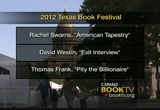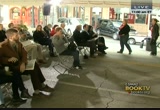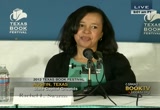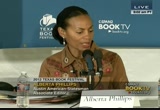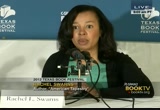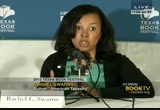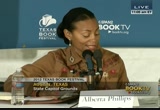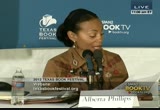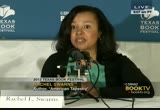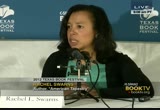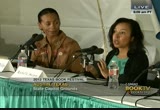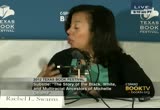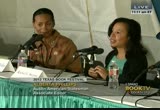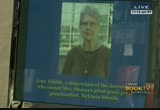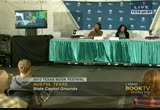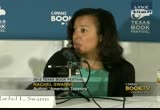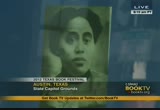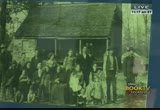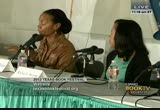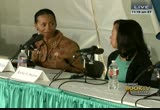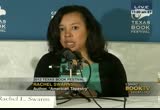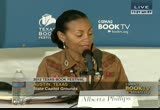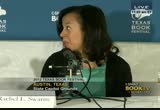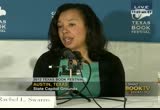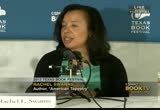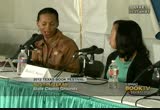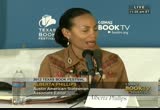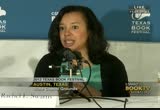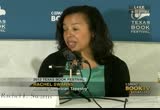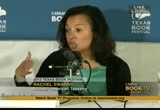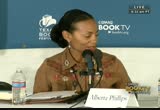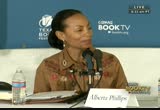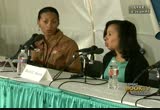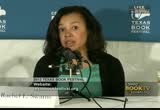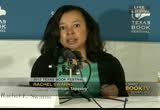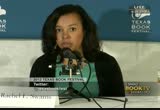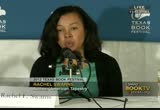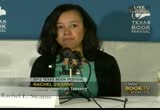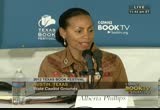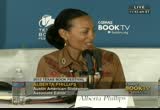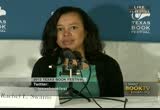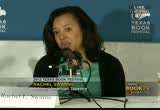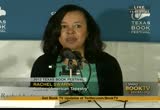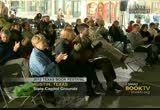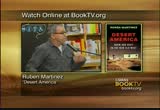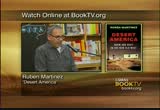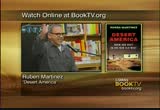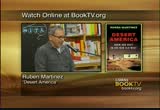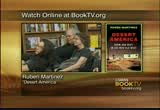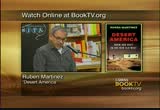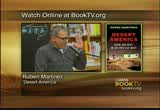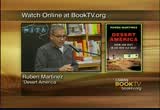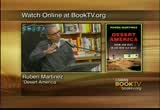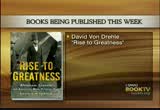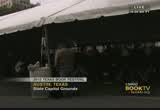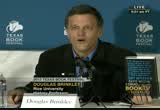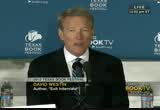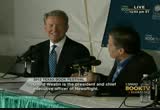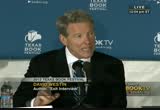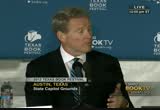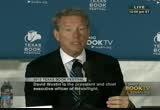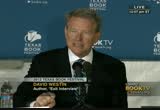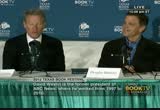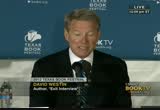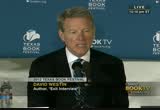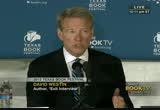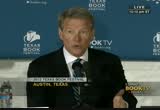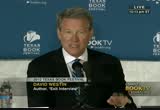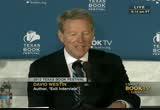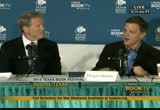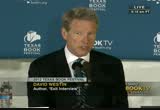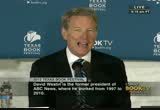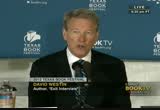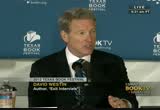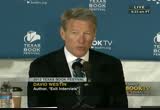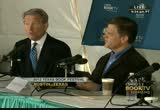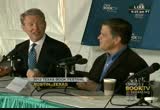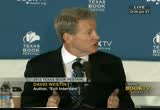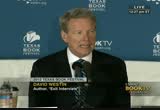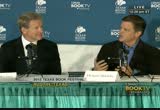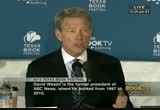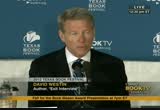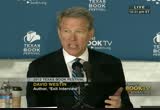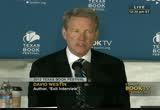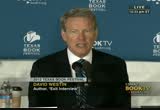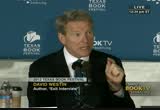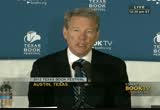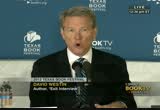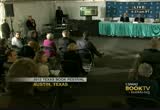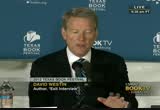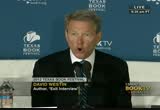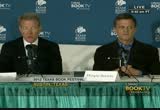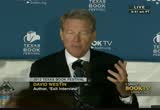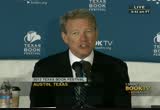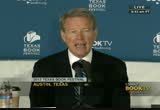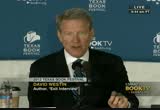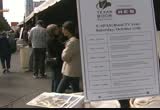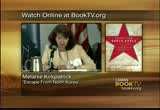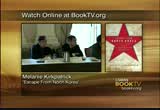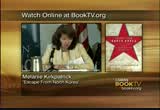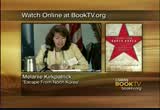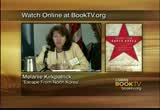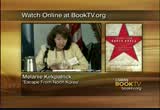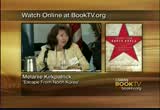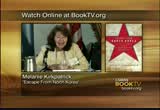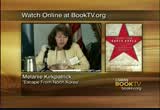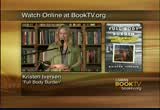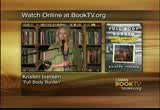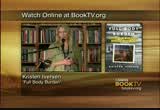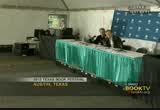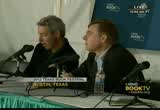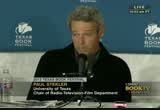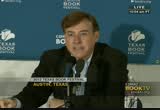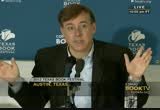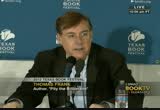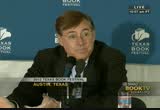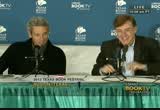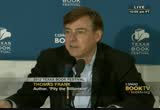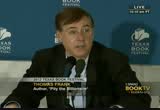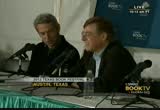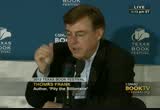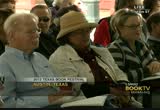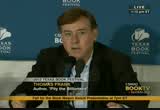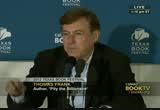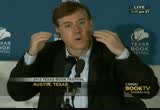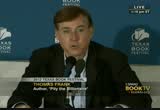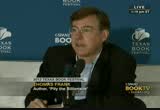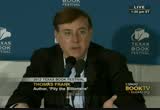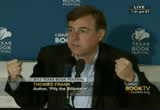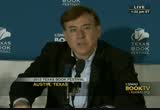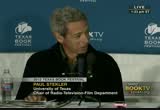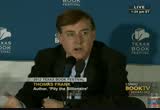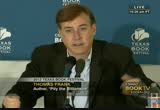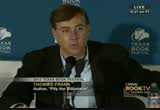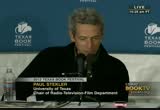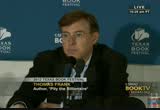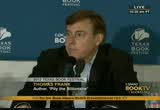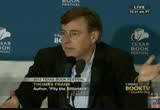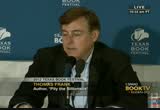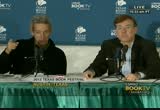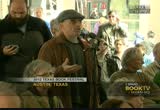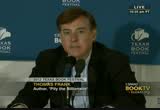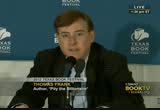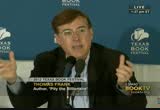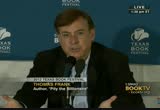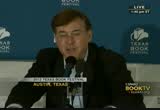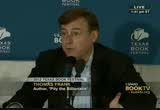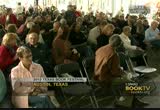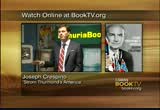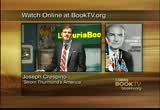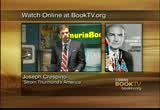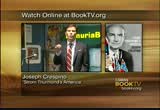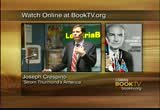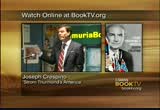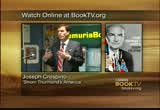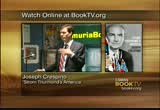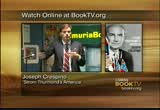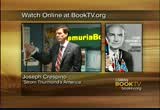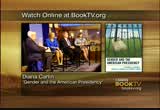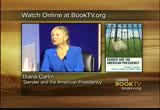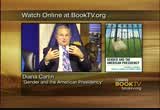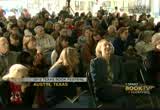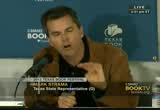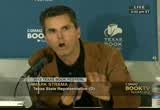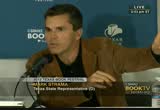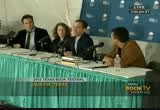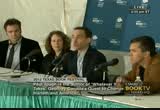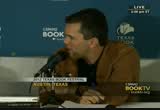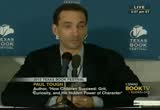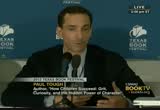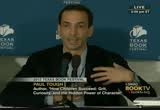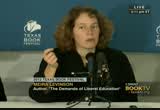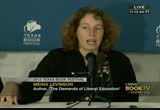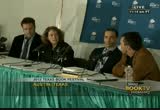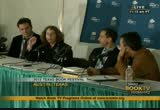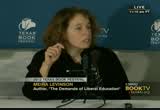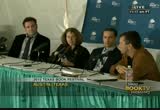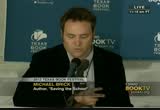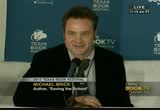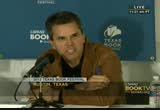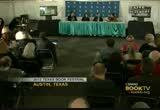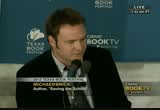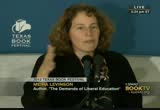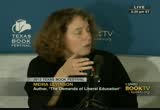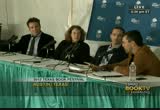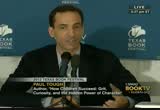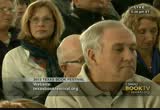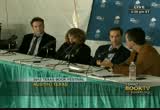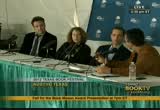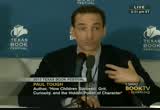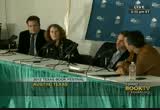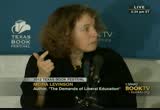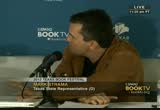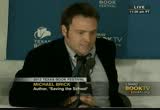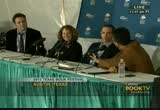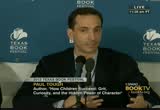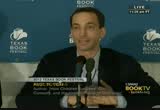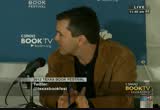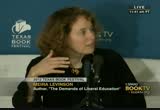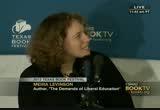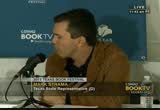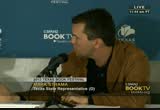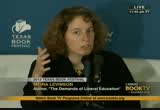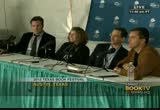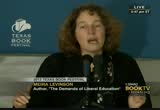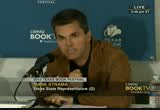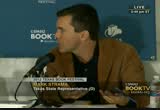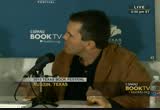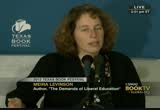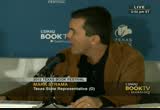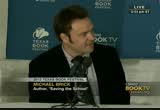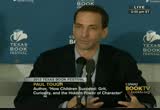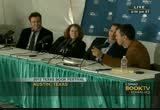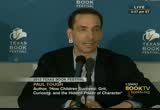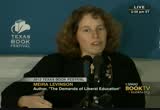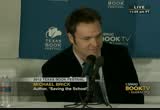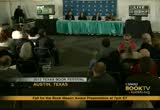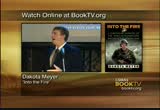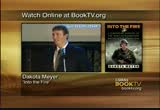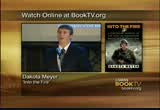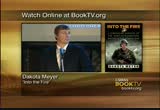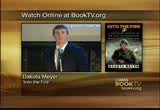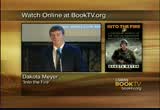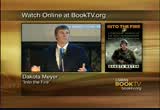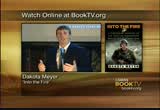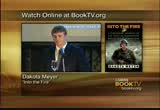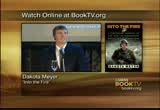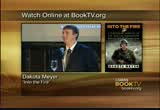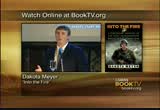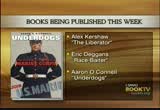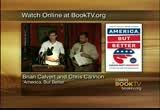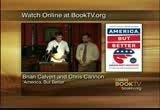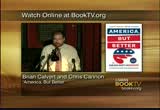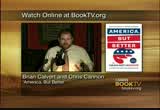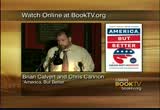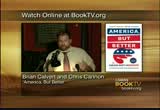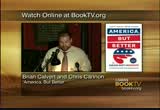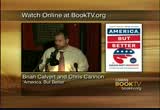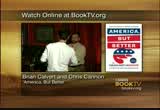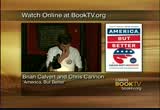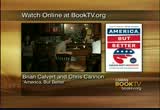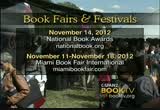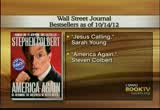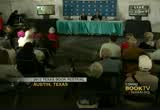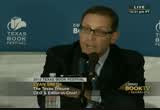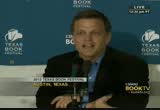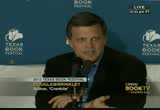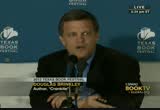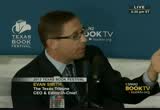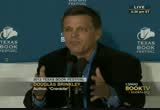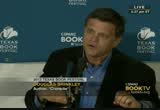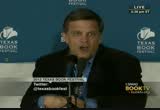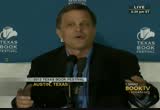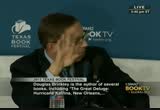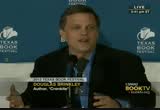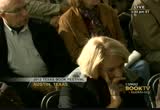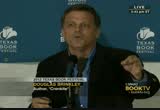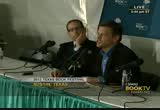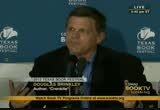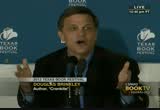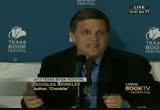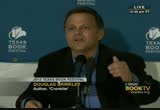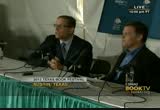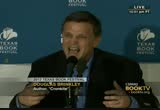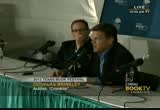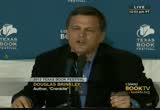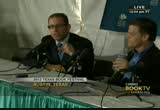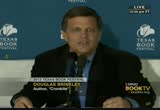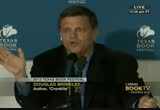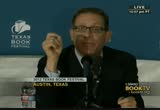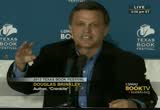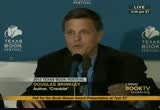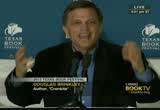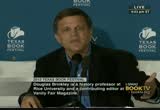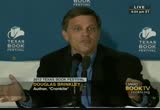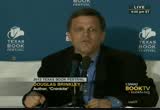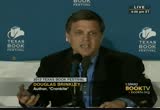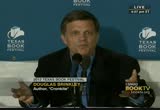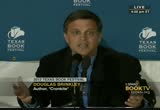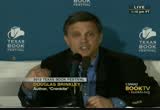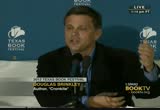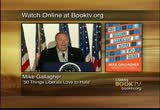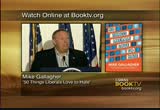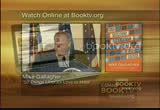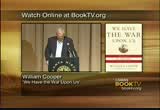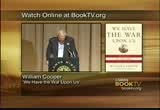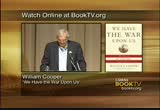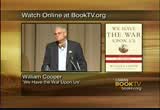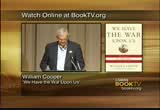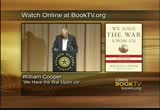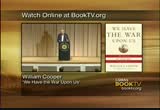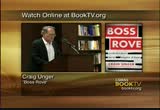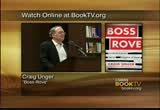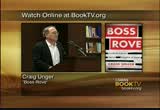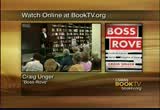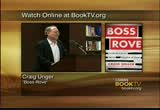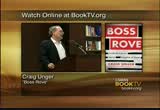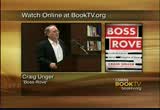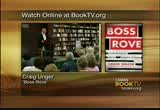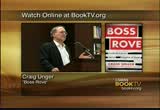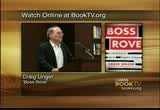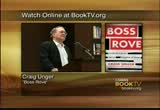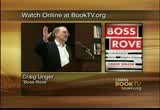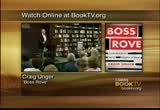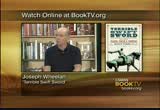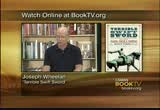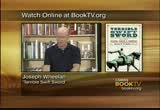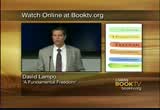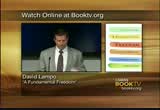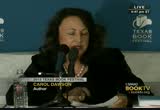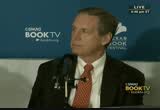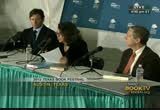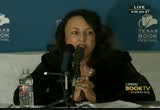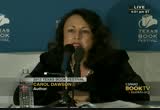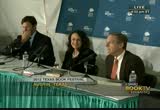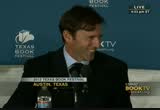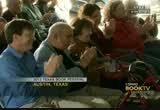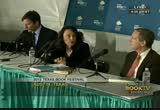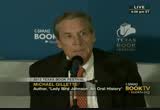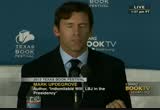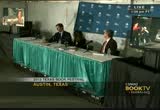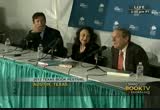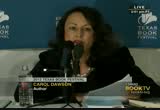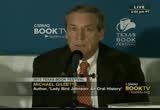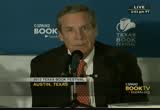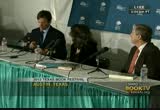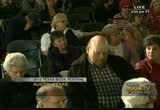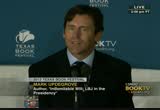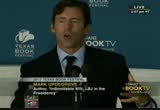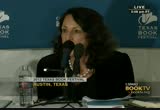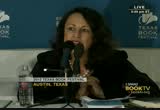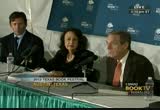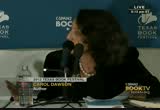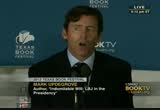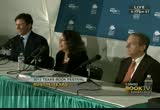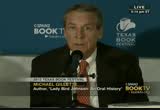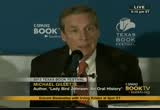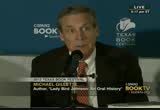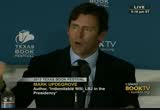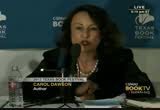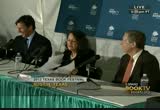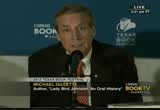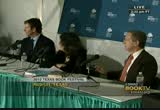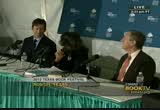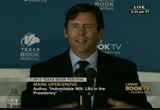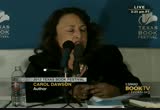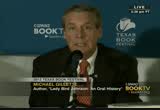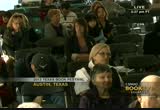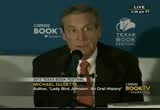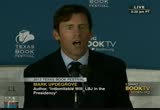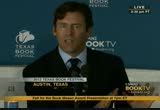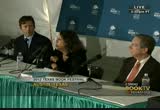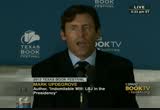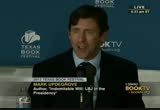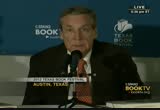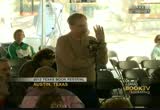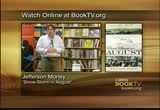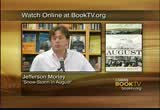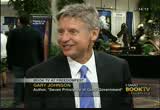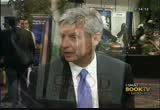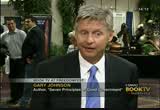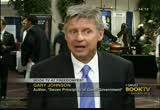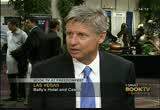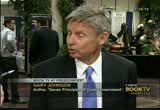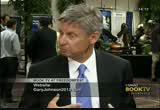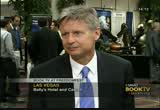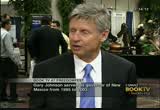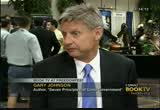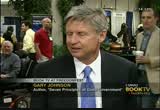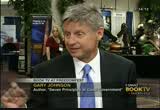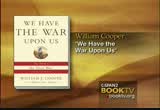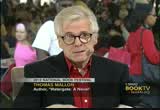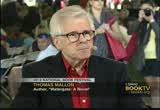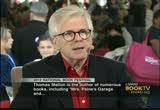tv Book TV CSPAN October 27, 2012 11:00am-6:00pm EDT
11:01 am
great day to be in texas and today i have the honor and pleasure to be at the texas book festival serving as a moderator, and i'm pleased to be here with rachel l. swams. i will tell you a few things about rachel because you came here to hear her and not me and our time is limited. she has worked for the new york times since 1995. reporting on domestic policy, national politics, immigration, the presidential campaign of 2004, and 2008, and first lady michele obama and her role in the obama white house. i met rachel at an event this year where i bought a book, the book she wrote, "american tapestry: the story of the black, white, and multiracial ancestors of michelle obama". after hearing her talk, i'd bought six more copies.
11:02 am
i bought them for all my family members and to give out as christmas gifts. now after having read her book i can tell you it was a good investment. it helps me better understand my own family and many mysteries surrounding my own family. rachel l. swams's book is a compelling story that stirs deep emotions. it is also a story that would break them here and with that, let's welcome rachel l. swams. [applause] >> thank you. thank you. >> thank you for coming. in the years leading up to the presidential election, the focus seems to be on barack obama's roots and his family and the fact that he wrote his own biography. now in your book "american tapestry," you put the focus on michele obama.
11:03 am
tell us about how you got started doing that and what inspired you. >> i was writing about the first lady and the first family for the new york times which was something of an unusual assignment. typically the first family is covered by the white house reporters who chased the president around on air force one and in the briefing room and write about the first lady or first family when they have time that there was a sense in 2008 at the new york times and other newspapers too that we might want to do things differently and this first african-american family living in this house, this white house bill in part by slave labor, with slave labor would be written about regeneration to come and we wanted it to be part of documenting and chronicling that story. in january, before the
11:04 am
inauguration, one of my colleagues was writing an article about the president and his rainbow family and we realize that the last minute we didn't know much about michele obama's ancestry. my colleague reach out to genealogist and asked her to do some digging. we didn't give her enough time. she didn't find it very much as we read a lovely story about the president and his rainbow family and we thought that was that. but unbeknownst to us the genealogists kept digging and in september of 2009, the first year the obamas were in the white house she called us back and said i found something really interesting. would you be interested in covering it? i found myself on a plane to birmingham, alabama, where i visited churches, spent time in the archives, tried to find out as much as i could about the
11:05 am
first lady's great-grandfather who happened to be by racial and the story ran a month later on the front page of the new york times about the office's parents, millennia, the first lady's great great great grandmother who was the slave girl valued at $475 in 1852 and the first lady's great, great grandfather who was a white man whose identity was a mystery. the day after the article ran, an editor sent me an e-mail and said that was fascinating. a little snippet of the first lady's family tree. would you think of doing a book on the old thing and that is how i got started. >> we are glad you got started on the book because it opens up a lot of information about families across america and the interconnectedness of many
11:06 am
families. what i like about your book is it reads like a good suspense mystery or thriller. i suppose you had to be part detective and part researcher in unraveling the story. even michele obama herself was unaware of some of the people in her family tree, both black and white. there are many families in america who are experiencing that same thing or who are unaware of their family tree and what that has hidden inside of it. i found the following passage insightful and -- which is also great prose and by wanted to read it. she never discussed who he was or what happened between them. whether she was a victim of his brutality or a mistress, he
11:07 am
treated affectionately, war whether she was loved in return. she went her way and he went his. and just like that, their families split down the middle. children, grandchildren and great-grandchildren, some black, some white and some in between scattered across the country as decades past, separated by the color line and a family's fierce determination to step beyond its painful truths in slavery. obviously your research surprise and probably stunned both sides of the family. tell us about at and how michele obama's family and the white side of the family reacted to the news. >> the first lady has long suspected she had white ancestors in her family tree, like many african-americans do. but she had no idea who they
11:08 am
were or where they lived for when they -- where and when they fit in her family's story. so i was able through dna testing to solve that mystery in her family. what i did was trace the descendants of mill the knee at's owners who lived in south carolina and georgia, irish-american families. the first lady's family. i tested them and in fact it is the most ordinary of american stories. the white shields and black shields are related. this is on the first lady's mother's side. her mother is marion shields. many americans are making these discoveries with dna testing, just finding these connections
11:09 am
through ancestry.com, doing their own genealogy. it is a kind of discovery that many americans are making but it is not an easy one for people. on both sides of the family, this was a hard realization, even though people know these things happen. many members of the first lady's white extended family had no idea their ancestors had known slaves and while many people might like a connection to the white house, this was a most unsettling connection to the white house as you can imagine. it is not something most people expect, to have a reporter not on your door and say one of your ancestors may have owned the first lady's ancestors. and some people simply didn't want to talk about it. but some people were willing to
11:10 am
grapple with the history and said it would not be what i would have chosen for myself but it is my history even if it is hard history. so some of the white descendants, distant cousins of the first lady went on this journey sharing their memories and records and dna as they explored what happened more than 100 years ago. it was also difficult too for the black side of the family because michele obama's uncle talked about the silence among african-americans, about him trying over and over again to get his elders to talk about what they knew about slavery and what they knew about the different colors in the family and where the white ancestry came from and over and over again people refused to talk about it and it is one of these
11:11 am
things that is hard for people to talk about even though it resonates still, this experience -- we think it is consigned to history books but it is part of our history. so getting people to talk and wrestle with this is not an easy thing. >> i can imagine. as you say, some people were ok with it and cooperated, and some weren't okay with it. and didn't cooperate. i found that to be very interesting, reading the book, how both sides incorporated that into their histories and both sides response to that were similar and different. i enjoyed writing the new york times article that you wrote because some of the photographs were in that article and you could actually see how people on both sides of the family, black-and-white, resembled one
11:12 am
another. >> that was one of the things before the dna test results came out. some of the first lady's distant cousin didn't know they were distant cousin then but they were appearing at the photos of the office shields and ancestors, holding them side by side saying -- they were kind of -- i didn't reveal to them the dna results until the very end but by then they were not surprised. >> do we have some photographs to show today? >> we do have some photographs. we will flip through them. >> this is the first lady as a baby with her nuclear family. term mother and her father and her brother. this is joan triples, one of the first lady's distant cousins who were willing to go on this
11:13 am
journey and shared with me what she knew about the family and her dna as well. this is the great granddaughter of dolphins shields. [inaudible] >> this is a question that just came from the audience. when we are talking about millbeena and her biracial son, what time period we are talking about. this is pearl. nilbeena was remarkably well in life and i was able to interview two people who knew her which is astonishing but she lived until 1938 and i found two people who knew her in the last years of her life. golf, her son, born in
11:14 am
1959-1861, he also live the remarkably long life. he died in 1950 and i was able to find three people who knew him as well. this is his daughter who move from birmingham to cleveland, ohio. this is dolphus shields, the first lady's great great grandfather with his son willie. he was biracial as i mentioned and quite a remarkable man in his own right. he was born into slavery in george and moved to birmingham, alabama as a young man where he became quite a notable person. he became a property owner in 1900. he was a carpenter and had his own business. he was a founding member of two churches that stand today and still open and running today. when he died the news of his passing was on the front page of
11:15 am
the black newspaper. another photo of dolphus shields, dolphus with his extended family. the tombstone of the man who owned millvinia, the tombstone of his son charles, marion shields to the testing suggest was most likely dolphus's father. this move to michelle ng obama's father's side of the family, michelle obama's and and this is steve johnson, the first lady's great-grandmother who traveled to four cities, she was a sharecropper's daughter born in 1879 and somewhere along the way she decided she did not want anything to do with the farming life and she was one of the first of michele obama's and
11:16 am
sisters to set site on chicago in 1908. this is her husband who was a minister who also lived in chicago. this is the first lady's great great grandmother, and she arrived in illinois some time in the 1860s. the first lady describes herself as a south side girl but the family had no idea their roots in illinois go that far back. if you look at mary, you will understand why the family story says she was part cherokee. she obviously has a mixed lineage but i was never able to establish for sure whether that was true. this is the first lady's grandfather, a mislabeled slide, who left south carolina and
11:17 am
arrive in chicago around 1931. this is millvinia, the owner of millvinia's brother. this is a photo, this is an amazing coat, there is a nice story behind this one. after the book was published and after an article about the book came out, i got an e-mail from a woman who said i think that might meet my family, my husband's family and i think we have a photograph of them and in fact they did and it was the first photograph that i was able to find of millvinia's owner and his family, the shields family. millvinia's owner, henry shields is the older man with the beard and dolphus's father is the well-dressed man with the
11:18 am
spectacle standing looking into the distance. it is a remarkable finding. i felt privileged to see it. i will skip to the last one. this is another remarkable moment which was after the book came out clayton county, ga. where millvinia was enslaved your active a monument to commemorate her life and they invited some of her descendants and that the most -- the last moment i thought some of the shields descendants might come and they did and the descendants of a slave and slave owner exchanging numbers, sharing a meal together. i don't know if they will be facebook friends for years to come but it was something to see. >> a great slide show. all of the people you mentioned
11:19 am
are covered in the book. they all are characters in the book and one thing i found helpful was you do have a chart of michele obama's family tree, you can always look back and say this is how that person relates back to michele obama. but another thing i find interesting about your book is when we talk about slavery in this country we often talk about it as something only of the wealthy class. in other words if you were wealthy afford slaves and if you were a working-class american you didn't really have slaves. you referenced thomas jefferson and sally hammons as kind of an example of a wealthy family that owned slaves. butting your book, you bust that
11:20 am
miffed because millvinia was a slave of a working-class american, can you talk to was a little bit about that? >> many of us when we think about slavery think about the jeffersons, we think about gone with the wind, the grand manner, the vast plantation. michele obama's family, there were ancestors of hers who had that kind of history, the plantations of south carolina. the family story does expose the enormous variation of life during slavery when -- which is not something we often think about. the shields family that owned millvinia they were not wealthy people at all land in some ways that was astonishing to the descendants who said to me we heard those shieldses never had two nickels to rub together. they were not wealthy family.
11:21 am
the irish-americans who came some time in the 1700s, worked the land with their own hands, all we ended up owning slaves, shields married the daughter of a wealthy man. when that man with his father-in-law died inherited three slaves. the first lady's great great grandmother and she ended up in a rough rural community in georgia, the vast majority of people were not slave voters, white men worked the fields along the slaves they own if they owned annie and it was quite a different experience than the one we often think about. >> it was quite a different experience and i really enjoyed reading about the people of that day, how she worked the fields
11:22 am
and the men who owned her worked the fields. i know that you were not able to determine the relationship between millvinia and the men who owned her. and i also know, code of silence. she never talked about it and her descendants never talked about it. i noticed the same thing in her own family and other families as well. it is about wilkerson who wrote about the great migration, the same code of silence in her family. what is up with that code of silence? >> this is a painful chapter of american history for many families. so i think at the time, people knew.
11:23 am
it would have been very clear to people. the people i met and interviewed who knew millvinia and knew her son knew that she was a dark skin african-american woman who was born into slavery, had these very fair skin sons and no father, no husband around. they suspected but no one talked about it. people who knew dolphus shields suspected his great granddaughter said people whispered in the family that he had a white father but it was again something people just didn't talk about and there was a sense among african americans really of trying to move forward, trying to move beyond and not burdening future generations with a painful history, of wanting to have
11:24 am
children and grandchildren who had hopes and would find their way with that hope in this country and it is a remarkable story, generations from slavery to the white house. you can sort of understand why people wanted to keep quiet in some ways, but it is a lost art in a lot of ways. >> talking with my own family, i tried and kind of a shame too because children were born out of wedlock and as you say african-american families, trying to move forward and parts of trying to move forward is being legitimate and getting an education and making sure that your relationships, people were legitimately married. anything that pointed back words
11:25 am
or made you illegitimate was not really something they wanted to talk about and have out there. it is too bad because it closed a lot of doors in our family and that is what you found in michele obama's family. very fortunate, you were able to help and truly open those doors for her family. >> at least with been -- within her family, there are those conversations happening. as i said americans, ordinary americans across the country are making these discoveries with dna testing so these conversations are happening around the country.
11:26 am
when you talk about marriage and the importance of legitimacy, one of the other stories which talks about the variations of the american experience during slavery was the first lady's family had ancestors who were freed for decades before the civil war and one of the most interesting records i came across was a record which showed those members of her family who after the civil war went to the courthouse and lined up to get their marriages, their relationships legitimized and recognize under the law and the lot of people did that. >> i think that is right too. i wonder, i am curious, how did first lady michelle ng obama respond to the news when you talk to her or this was brought to her?
11:27 am
>> one of the challenges for those of us writing about the first lady is she is not doing any book interviews at all. i didn't get to talk to her about this but when the article came out, her husband's press secretary was asked about it and said she sounded fascinating. i know her family finds it fascinating and i think it was something they simply -- simply didn't know about. i briefed her staff along the way as i was doing my research and gave her and members of the family, i hope she find it fascinating. >> one thing i did read in the new york times when your article was published, she did have a
11:28 am
positive reaction to if, and at some point she even traveled to africa with the children to see the places where the slaves were housed or africans when they were imprisoned warehouse before they were taken in the middle passage and across the sea to the americas. it was very interesting that she was curious to follow her roots all the way to africa as well. your book has been received positively by a lot of people. harvard professor henry louis gates said that the book gives us an idea, a real true idea of
11:29 am
our interconnectedness of all americans, the interconnectedness of all americans and we would have to agree with that. talk to us a little bit about that interconnectedness that you found as you were writing the story? >> the book is called "american tapestry" because really, her family reflects the enormous tapestry we live as americans in all of our families. she is our first african-american first lady who has white ancestry, african ancestry, hints of native american ancestry. we often think of this modern contemporary time we live in as an unprecedented period of immigration, interracial marriage, checking as many boxes as you like on the census. when you go back into history,
11:30 am
if you look at the census of the late 1800'ss, there are whole groups of people classified as a mixed race and all kinds of labels, quadroons, a cruise, this is not new. we think of the president and his heritage, he is the son of a white woman from kansas, african man from kenya, we all have these connections in our families. >> people are interested in researching their own families and their own family trees, what advice can you give them? we may not have the same access to expert researchers but what advice can you give them? >> i like to say i am a preacher of the gospel of genealogy because it matters a lot.
11:31 am
we often write books about our president and first lady's but what i loved about the first lady's story is her story is about ordinary people, we all have these stories and our families and we shall try and dig them up. so first thing is to try to talk to the older people in our families because we often way too long. don't wait. don't wait. collect those photos and talk to people. collect those records in boxes and old folders somewhere. there are great pools where you can find records and documents from your desktop. ancestry.com is a subscriber service which has a fee. familysearch is free. if you know where your family is
11:32 am
from you can go to your local courthouse and search for a property records, vital records, birth certificates, marriage certificates. 4 african-americans, many people have fought it is hard and difficult to do and it is because african-americans do not appear in the census until 1870 and people say what about letters and journals and i say slaves were barred by law from being able to read and write and newspapers at the time didn't chronicle marriages and birth and things like that but even so it is difficult. from 1870 on, the census is a great fool and you can find these records. >> that is good advice. there was a question earlier about the time frame the book covers. it covers a lot of territory and a lot of events.
11:33 am
maybe you can talk about the time frame as well as many different events that happen in the book. >> i looked at her grandparents' and tried to take them back as far as i could. it is mostly the 1800s into the 1700s to world war ii 1950. really the first lady's family had front row seats to the biggest moment in our history. there's talk among deshields family that one of the white shield ancestors fought in the revolutionary war for instance. they were there during the civil war, during reconstruction, the migration, segregation, world war ii, big moments in our history. >> there were several characters that really stood out to me. beebe was one of them.
11:34 am
if i haven't -- if i have it right, she was born in a very small town and would have been a sharecropper but had her sights on the big city. as you say there were quarters and the lives they lead, led, some of that has been glamorized but reading your book, they worked day and night sometimes for three hours, so i got a real view of that. the other thing i liked as you pull in the different characters and put them in different places you also talked about the black newspapers of the day. tell us how important they were. >> the first lady's family ended up in chicago quite early.
11:35 am
great migration you often think about after world war i. her great-grandmother was there by 1908. folks came in the 20s and 30s and as a resource they did live in chicago, lucky to have the chicago defender which was -- which advocated -- calls people to move north. the newspaper from that time gives you a portrait of what life was like and it was invaluable. >> i think we are going to move to our q&a at this point in time. let's give rachel a big hand first. >> thank you. [applause] >> you are welcome to move to
11:36 am
the mike. >> hello. i don't know if this is gone. there we are. i am from a presidential family of slaveholders. i have been doing a lot of research into the families of people my family held in bondage and i become in a group called coming to the table. are you aware of this group? is an online group that seeks to connect the families of enslaved people and families of an slavers. i find it to be a powerful experience. i am wondering if you think this type of research into our own families can promote racial hearing -- healing. >> i hope it promotes conversation. a lot of what i found on both
11:37 am
sides of the first lady's family, black-and-white, was a lot of silence. we should talk more about it. i am not naive to think one book even about a historic first lady is going to solve everything. if it sparks some conversation, that would be a good thing. in talking to some of the first lady's distant cousins, some people, even our conversations were i think meaningful and fascinating. some of them looked at me. i am a journalist with a new york times. what they saw was an african-american woman and they worry would i be fair to their people? 1-woman said to me michele obama has said that she is the descendant of slaves and slave
11:38 am
owners and she embraces the history, that is her story and they said to me she is on the right side of history and we are on the wrong side of history. but even when these descendants and i were having these conversations and they were looking at me as someone on the other side, being able to talk about it was a good thing. so the website you are talking about sounds fascinating. is a great thing. >> i would like to talk to you -- thank you. >> i was wondering. does the dna testing since you were able to take it back to irish-americans, you able to use that in africa to see what region she is descended, from one area in africa? >> it is not as precise as one would like.
11:39 am
in fact the family, the white descendants actually know the history, they know they are irish-americans and deshields were all shields at one point and the dna certainly suggest west africa but that is a very common thing. beyond that i couldn't be precise unfortunately. >> anyone else? this is your big chance. [inaudible] >> the question was how did i do this dna testing. you don't knock on the door of the white house and ask the first lady for her dna. i knew dolphus shields was her
11:40 am
great great-grandfather. the research suggested the other's son was likely the father, she was living next to him in 1870. she continued to have biracial children after the war and so i tracked down dolphus's descendants and descendants of the shield family and there was a match. >> i'm curious in reference to you reference the civil war as one of the important events word their ancestors who possibly fought on both sides of the battle and what legacy has been left within a family? >> the shields, irish-american shields did fight for the confederacy. there -- there are a number of
11:41 am
voters sons who fought with the confederate army. on the union's side, not a blood relative but a man who had a formative influence on her life joined the union army and was involved with some notable battles. on the first lady's father's side, there is an ancestor. sometimes making these connections is difficult. someone who i think is an ancestor who joined the union army around the time slavery was ended. kind of making that link was unclear but not an easy thing. the records are there in terms of the civil war service of those ancestors and the
11:42 am
descendants didn't know about that. >> you talk a lot about dna testing. with a book like this and your research have been possible before dna testing? >> good question. it certainly helped. we would have had circumstantial evidence that would have suggested the first lady's white ancestors came from the shield's family that owned millvinia but there would be no way to know for sure. 20 first century technology is what helped unravel -- ten years ago i wouldn't have been able to write this book in the way that it is now. >> any more questions? we have a little time left. i just wanted to say something about the book that made me
11:43 am
think, but here in texas, looking at its history, particularly the history of slavery and how texas developed, i didn't know but someone shared with me that there was an incentive to have slaves here in texas among regular people because as the land was given away the mexican government giving of land away was based on how many people were in your group. if you could bring slaves, then you would get more land, regular people brought slaves, especially in texas, lots of working-class people came with slaves in order to enhance, are
11:44 am
an interesting test about texas itself. regular people and slavery. we have a little more time. if anyone would like to ask a question. okay. would you please move to the mike. >> when i looked at the first lady's great granddad in the new york times and his half-brother and almost looked like the same person, you took the same person and bit him in caramel. that was astounding to me. i don't know if the similarities were that profound throughout but that seemed to me -- anyone who saw the picture and that is why you selected those photographs, i would like to hear about that in terms of the true similarities and i would love to hear any comments you
11:45 am
would care to share when families got together for the unveiling and two sides of the family together to describe in appropriate ways the interaction between them. >> the families do find a resemblance. i was actually in nashville recently where another member of the shields family and others descended from the white shield family pass along a photo that shifts the brother of her owner was remarking on the resemblance. dolphus who lived in birmingham, the first lady's great great grandfather lived there at the same time his wife's half brother lived there and they lived not far. his brother lived kind of clothes to wear dolphus had a carpentry shop.
11:46 am
people who knew him said he had a white visitor who would come and talk, of which was spun usual at that time and a very segregated city for the end of his life. this woman said that was his brother. the question of whether or not these connections even if they didn't talk about them, whether they did extend beyond millvinia and dolphus's father. as for this reunion, it was really fascinating. it was millvinia's descendant and descendants of millvinia's the owners lose some came from georgia and drove from alabama. we had a ceremony at clayton county with this monument in honor of millvinia and her life. a kind of exchange stories about what they had known.
11:47 am
they looked at each other's photographs, they had a meal together, there is an effort underway in the town where millvinia lived in kingston, georgia, to do some commemorative work. she was in a cemetery, church cemetery, an effort to try to get one and i hear from the shield's family often about when that will happen because they would like to come. i don't know how long this kind of connection and interest will last that they are still interested. >> any more questions? we have just a little bit of time? no time. thank you, rachel.
11:48 am
thank you so much. she will meet you at the book signing. [applause] [inaudible conversations] >> that was rachel l. swams on the ancestry of michelle obama. in a few minutes we will be back with more live coverage of the texas book festival. our next authors former abc president david westin. >> booktv is on facebook. like us to interact with booktv guests and viewers. watch videos and get up-to-date information on events. facebook.com/booktv. >> this book in particular deals at its heart with several
11:49 am
desserts but the subtitle is boom and bust, the new old west. i am looking at the way the economy affects our lives, the economy gets into our bodies. it is a book that i wrote because my body arrived in the desert under particular circumstances in the winter of 1997 when i was broke, broken, and on drugs. i was in mexico city where i had been lucky enough to go under a book contract from new york. i got an advance from a new york publishers to write a book. a dream come true. in mexico city i had crossed the deadline and didn't have a word
11:50 am
written and i was broke and i called the only friend i could count on at that point because my life style led me to destroy a lot of personal relationships. i call the performance artist lives in the united states for many years and the solidarity network, art and politics in the 1980s and i said [speaking spanish] >> in the village of joshua tree, calif.. there is a set of circumstances that led her, she is from the tropics in central america. how did she wind up in the desert? everybody has a story in the desert how they got there. she said [speaking spanish] we will take care of you and give you a place to live. i arrive in the desert and one of the first things that i saw
11:51 am
when i rented my little shack in the sand next to a sign that said next services, hundred miles, town of 29 palms, felt myself driven to go further and further out. they were in the village of joshua tree and a beautiful national park. you are in joshua tree? if you haven't been there, you 2's album, you know what joshua tree looks like, the arms going this way and that. i wanted to go further out. there was something existential driving me further and further, the big empty as they say about the desert and also because the further out you rent their rent gets cheaper and cheaper. always the $275 a month for two bedroom house with five acres of land on the edge of 29 palms,
11:52 am
right where the sign said. that is where the book begins. begins with a personal crisis and arriving, no accident fire arrived in this particular landscape. ultimately the desert has been the site of restorative pilgrimage for millennia. at that particular moment i don't think i was aware what i was doing. i didn't say i am in trouble with my life and must go il in the desert but ultimately that is the state i was entering and later i realized all the symbolism was there to receive me. i began the process of healing and getting to know this place which included almost immediately dealing with the fact that i was arriving in a landscape that had as many problems as mexico city with
11:53 am
drugs. i was coming from a place of addiction and all of the pain and struggle that goes with that and arriving in a place where meth lab work devastating the landscape and young marines were training and doing lots of drugs to escape the terrible reality of their bodies. if i was going to carry ancient symbolism of restorative healing pilgrimage by was also entering a place that was the opposite of that. a phantasmagorical place. many years after i moved to joshua tree and 29 palms, a few years later i met my partner angela garcia in stanford and also written a wonderful book
11:54 am
about the desert called the past durrell clinic about addiction. imac angela far away from the desert but she is from the desert and that is one of the things i fell for immediately about her, the fact that she was a desert girl, western girl from new mexico, south valley. we ended up living in new mexico to get there when she was doing research for her dissertation on addiction, she is a medical entomologist, to stanford, people representing her tonight. i followed angela to another landscape, northern new mexico which i had already seen. i had been very couple times as a tourist. you have all seen northern new
11:55 am
mexico represented artistically. whether it is in the carrousel or truck stop or angela adams or georgia o'keeffe for santa fe artist painters, john nichols, films, how many western have we seen that have the landscape in range? northern mexico in particular has a very powerful draw in terms of its enchanted landscapes, the official state that came -- nickname is land of enchantment which carries a with of new age mysticism with it. warm and fuzzy and tends to obscure complicated reality and that is what desert america is about. how we imagine the desert or the desert has been imagined for us
11:56 am
by representations that created this imagery or created this vision of the desert for us, that is consumed and bought and sold and the stage upon real estate is sold and hotels and tourist packages and how complicated the act will human geography of the place is imagined. i am going to take you to northern new mexico briefly here. angela chosen northern new mexico. she is from central new mexico, albuquerque. both of our families have issues with addiction. that was another point of encounter between us but she
11:57 am
chose northern new mexico, not to be right next door to her family, but close enough that we could visit and also because northern new mexico, runs along highway 68, which ultimately comes out of santa fe. you are going to the espagnole of valley. that place in northern new mexico has the highest rate of apps addiction and death from overdose of heroin of anywhere in the country and has for a long time. probably not getting better. it is getting worse. >> you can watch this and other programs online at booktv.org. here is a buck at some upcoming book fairs and festivals happening around the country. booktv is live from the texas
11:58 am
book festival. coverage includes presentations by douglas brinkley, rachel for and many more. visit booktv.org for a complete schedule of events. national press club book fair and author night is november 14th. many riders and proceeds of for the press club and journalism institute. watch booktv for interviews and this event. national book awards will be new york city nov. fourteenth. the ceremony celebrated author's work of fiction, non-fiction, poetry and young adult literature. booktv will air the ceremony the following weekend. miami book fair international held from november 11th to the 18 featuring 350 authors and booktv will be live from miami nov. seventeenth and eighteenth. for complete schedule of presentations visit booktv.org. please let us know about book fairs and festivals in your area and we will be happy to add them to our list. e-mail us at booktv@c-span.org.
11:59 am
here is a look at some books being published this week. historian alex kerr shot tells a story of felix parks, the commander of the 157th infantry regiment in the liberator. one world war ii soldier's odyssey from the beaches of sicily to the gates of dow. jenna lee stand media critic eric begins argues the media capitalizes on viewers fears and prejudices to garner an audience in race here, how the media wields dangerous words to divided nation. in underdog, the making of a modern marine corps, aron o'connell of the cold war in the united states marine corps at the u.s. naval academy chronicles the transformation of the marine corps from world war ii to vietnam. you can see a recent interview with mr. o'connell on booktv.org. the editor at large for time magazine describes president
12:00 pm
abraham lincoln's political and military decisions in the second year of the civil war in rise to greatness, abraham lincoln and america's most perilous year. in tombstone:the great chinese famine, 1958-1952 journalist explains what led to the famine of the 1950s and 60s which included the death of his father. the creator of fractal geometry recounts his life in the fractali fractalist, more of a scientific maverick. ..
12:01 pm
[inaudible conversations] >> ready? >> good morning. you can all grab a seat. we're going to get started here. i hope all of you are staying warm or have a jacket or coffee to endure this, but as some of you live in austin, it's nice to have this weather. i'm welcoming it. i was too hot all summer long. very excited to get to interview david west, somebody i have admired from afar, and he is -- he has written exit interview, but i hope you all did, whether you are watching this at your
12:02 pm
home more here in the audience. it is an extraordinary book about his time running abc news from 1997-2010. he was there for all of the big moments of recent history, and knows all the personalities in the broadcasting journalism business. it is a delight and a real welcome to austin to you. >> thank you very much. it's great to be with you. [applause] >> before i get into your book, i just wanted to ask you about your own trajectory because the you ever plan on -- where were you brought up? where did you grow up? did you ever think about being in journalism as a teenager or a college student? >> i am a proud michigander from north of here. exactly, from plant, believe it or not. i was born in flint, michigan. i went to the university of michigan and then law school and become a lawyer in court for
12:03 pm
just a spell at the supreme court which was a wonderful experience and was a lawyer and was planning to do that for my career in washington and was plucked really ought to be general counsel of the parent company for abc back in '91. i did that for a few years and then i moved over to the business side. through a roundabout way i ended up becoming president abc news and successor to a legend in sports and later news. that became his successor. so it is not something that i ever sought to do, and even when i went to do it, did it because we needed a succession plan, and i thought i would do it for a couple of years. the biggest surprise was i can't absolutely love it and have had some wonderful jobs, been very blessed, but being in a news organization like abc news, much less running it is a rare privilege which is part of the reason i wrote the book, to try to give people who have not had that experience some sense of what it is like. >> tell us about -- you are young guy in michigan. how you get to get to the supreme court? what was that process?
12:04 pm
what did you learn that the supreme court that has helped to run abc? >> well, as i say, i went to michigan undergraduate and sort of blundered into law. the first time i met a lawyer was when i went to law school actually. i was fortunate because it was a great law school. the you have it here in austin, the university of texas austin. i did pretty well in law school, and one of the things you do is you hope to be able to clark. i got chosen by justice powell. the supreme court is an amazing institution, for those of -- it is the only part of government where the senior most people do all the work. if you think about it. the supreme court justices read the briefs and listen to the arguments and the side. it does not work that way with senators are congressman our presidents. they have people that given summaries. so it is a great institution, but the most important thing for me was justice powell, lewis powell, who came out of virginia, was a truly extraordinary man, someone i worshipped and became very close
12:05 pm
with. learning from him and his judgment about people and how to trust people, how to make decisions, hausa have the courage of his convictions and that the same time to keep his mind open. tommy much of what i learned. >> tell us, you know, when i recently will -- wrote a book on walter cronkite. >> a wonderful book on walter cronkite, by the way. >> yes. >> it deserves the applause. >> and it was -- i was looking a lot at the history of cbs and nbc, the big two, but abc has started coming on strong and it became the third of the big three. how did abc news did on parity with nbc and cbs? what is the timeframe that that happened? >> abc news to everyone always says it was the fourth that of three. [laughter] for the 60's and 70's. it was a very weak news organization by all accounts. let's be clear. abc does the weakest of the
12:06 pm
networks as well. if you recall, there were to nbc network and nbc had a spinoff because they had trust concerns. so letter golden sun started building up the entertainment part of abc and to some degree successfully in the 60's and 70's. he concluded the only way to really get to parity with cbs and nbc was to build a great news organization, not so much because he loved news, but because the local stations made most of their money, as they do today, off of their newscast. he needed to improve. so he turned to abc sports, monday night football, while the world's ports and it said, you go over to news, spend as much money as you want which he did, and he really belted out starting in 19951977 through the 80's, and he did it in part by bringing what he did in sports, brought in big stars. he already had barbara walters. but -- brought in david brinkley
12:07 pm
and diane sawyer. he brought peter back from overseas and had an amazing graphics on air, amazing look, and he was very, very aggressive and built it up into a real powerhouse petallides. >> what was his personality like? if you have to describe them. >> well, he was a genius. he was larger than life in his thinking, not in his demeanor. if he were here, he was a bit on the size i actually. and often totally absent. i mean, one of the running joke says he never returned phone calls, including the head of the company. in fact, throughout his life when you would call him at home at night because a news you have crises, there was an answering service. it wasn't even a voice mail. he never returned the phone calls. and after he died one of his close friends at the white said to me, you know why he never returned phone calls.
12:08 pm
why is that? because if you were calling him it was your problem, and he didn't care about your problem. he wanted to do with this problem. but he had this, i think, unique ability, besides just having a very large vision of what was possible, a unique ability to when he watched a television program it was as if he had never watched television before. one of the problems, the people fall prey, they know the people on there, they know what went into it, west and a lot or a little bit of money, and the colors their view about it. with him it was all -- he acted as if he did not know anybody. he did you it the way anybody at home you did, and it gave him a great sense of what worked and did not work on television, but sports and news. >> great. how did you become the president of abc? >> it's a great question. people at abc ask that the time. believe me. [laughter] but i was in general counsel and had gone out to the west coast
12:09 pm
and overseeing production of entertainment programs, and then i was president of the abc television network which was over news. on paper, he was my subordinate, although he did not think he had any boss is basically. he was largely right. one of the challenges was toward the end of his career. while he was a wonderful news organization that had really been built up, as i said, it was in tough shape. people within abc news were coming to us and saying, you know, we love him and become one anything bad to happen to him. he treated our careers, but he has to move on because things are not getting decided. a different world. cnn was on the table at that point. they have become successful. nbc was on the rise. and they said, you have to have a replacement. as the year-and-a-half or so looking for a suitable replacement for this legend. i tried various things. i could not find it. and i pulled the dick cheney. i said to my boss who now runs
12:10 pm
the walt disney company, i think i know we can do, but i don't think i want to do it. i know these people and work with them as their lawyer and boss. he said to my think you can do it, but i'm not sure you -- i want you to. we talked about it, and ended up going in. i went in as a good corporate citizen because i value abc news, it needed the help, that i would do it for a 2-year transition or so. i say a great shock to me was i really came to love it as sort of a convert into journalism. it was a remarkable experience and a really inspirational experience for me. >> tell me about the trials and tribulations of president bill clinton. i mean, you are coming in at abc in the 90's. bill clinton, president, he had the impeachment lows. did you have to deal with any of the second term clinton problems? >> a good part of my first year at abc news was dealing with the
12:11 pm
clinton issues. i mean, the monitor lewinsky story broke ten months into my tenure i was done in cuba. the pope was visiting cuba. we had everyone down there. well over 100 people down there to cover this event. d'agata call one at when i was out to dinner from the desk in new york saying we have this investigation we have had going on that looks like it's going to break. there is this young intern who has told her close friend that she had a relationship, and a proper relationship with the president and i said, that's just ridiculous. that can't be right. we have no reason to believe she's telling the truth, so forget it. i went back in to dinner and about an hour they call back and said we have just confirmed that janet reno, the attorney general has formally and officially expanded the investigation into the whitewater, the whitewater issues and building plants in the financial questions.
12:12 pm
officially extended the investigation to include obstruction of justice charges against the president of the united states relating to this young woman. at that point, of course, we were off and running. when that happens you can't ignore that. we scurried around to make sure we had the story right and later that i broke the story. so the white house was obviously very upset. supporters of the president were very upset. we were being buffeted by both sides, but the conservatives and liberals, and abc news and we and i were put front and center in it because very early on, two or three days into the story we had the story of the infamous blue dress, and we headed exclusively that i personally that it and made sure about the source a minute. and one of the import lessons i learned in journalism, an exclusive is a really great thing as long as it doesn't stay sesotho long because at the beginning it's great that no one else has it, but when it goes on people start to question what you got it rider not command we had cbs news and geraldo rivera and people billion and sank this
12:13 pm
is totally bogus the mentally wrong, and we were exclusive for about six and a half months before it finally got confirmed. it was a very uncomfortable time. we have a lot of pressure. >> i went to the clinton library recently, and i did not see the blue dress under glass. it just wasn't there. [laughter] >> it's funny. time goes on and we forget, but in writing this book a went back and reread some of what was happening at the time. today, it was always an awful story because on the one hand it seemed potentially very important and it was incredibly tawdry. none of us -- your not covering yourself and glory. the thing that you have to remember is that the time the blue dress reported the basic claim of the white house was it never happened. she's lying. if you recall, president clinton met with a series of cabinet officers and went out to camera and said never happened. and the reports, like in the "washington post" and other places, anonymous reports of france said she makes things up,
12:14 pm
she fantasizes, particularly when it comes to romance. so the blue dress ended up being seminal. it had never -- had never been any progress and not sure where the store would have ended up. >> when bill clinton left office when you were president of abc, remember al gore running, did not even want to be in a follow-up with bill clinton in 2000. to his detriment, i think. probably could have won if he had gotten on his side, but there was still a stigma to being assisted with clinton. now in this 200012 cycle he is the rock star. he's trying a bigger crowd than anybody. getting praise from all americans. how do you think bill clinton has rehabilitated himself so fully? >> myrna the things i talk about is that the 2000 convention, the democratic convention, i don't know if you remember, he came down that long white corridors with the black suit on, look like tiny in.
12:15 pm
at the time i was sitting with george stephanopoulos what -- watching this. i think he should just come out and say, me too. george at the time said no. too much discord of president clinton still at this point, but i tended to agree with you. two things. this was a shortcoming in the media, including us. i think that the american people were ahead of us among the ability store from the beginning. i think that they figured out right quick that, in fact, he did it. they did not approve of it. it is approved of it, but he was a really good president and wanted to be a presence. thank you, let's go on. even when he left office his job approval ratings were quite high. so on the other hand, the clinton global initiative and some of the things he has done since then have been truly extraordinary for an ex-president. he is making a difference around the world, and i think that is now lost on people. >> you mentioned it george stephanopoulos.
12:16 pm
abc had inherited temperament the demonstration. what made you have confidence that stephanopoulos would be able to make it in the world of broadcast news? >> george is one of the the things i most protestant at abc news. george was a contributor of the round table when i came in. and one of the things i did was sit down with him because i had done to know in a little bit. i saw how intelligent he was, but also, what a wonderful student diaz. i mean, he is, like many broadcasters, willing to go back and relenting and to learn from his mistakes. so i sat down with them early on and said to my don't know what you want to do. at the time he was teaching at columbia, on the lecture circuit -- circuit, had just written his book. i said, i don't know what you want to do, but if you want to give all this up and go into journalism, i think you could be traded. he said, you know, it's funny, i've been thinking that's what would like to do. i told him, you have to go back
12:17 pm
to the beginning because you have to learn the craft to this whether it's really a teleprompter or voicing over pieces our standards or ever. he did it. and when we moved him into the anchor on sunday morning there was a lot of controversy about it. the left did not like him because they thought he had betrayed president clinton. the right to not like him because you work for president clinton. all of the television affiliates even inside abc were saying we just don't think he's an anchor. he just doesn't feel like an anchor. i believe in him, and we worked hard, and that think he is just superb. very, very proud and delighted because he deserves all the good that is coming his way. a very hard worker and decent man. >> here here agree completely. one of the best in the business of what he does. now, tell us about george w. bush. i mean, you had to up -- tell me about what he is like and did you ever have any squabbles with the bush administration over coverage of things? >> we have certainly squabbles
12:18 pm
with the bush administration. now with george w. bush. i first met him down here in austin when he was governor and running for president. one of the traditions in a place like abc news is when you get into a presidential election year you invite all the candidates to come in and meet in an informal editorial meeting in new york, and then al gore who was vice president of the united states, but george w. bush's people said thank you very much. you contend austin. we flew down here. peter and i and some others flew down to interview george w. bush. my personal feelings always were he was very pleasant. he was very enjoyable to spend time with. very quick. i always felt the media underestimated his intelligence, certainly underestimated his political savvy. i was always very impressed. that said, particularly as we get into september 11th and wars in afghanistan and iraq, the bush white house, the administration was very aggressive and particularly karl
12:19 pm
rove who is not a shy person. karl did not hesitate to let us know when he was very upset. by the way, did not blame him. he was doing his job. he was an advocate. but he was a very effective advocate, and he took issue with a number of things we did, and we responded as best we could. >> you mentioned a couple of abc correspondents, and an anchor. let me start with sam donaldson. what is sam like? [laughter] sam is exactly what you see on there, just exactly. he is wonderful. irrepressible. he cannot help being sam donaldson. [laughter] he does it at home. he does it -- you run into him. so energetic. so passionate. he loves the news. he loves washington in particular, loves politics, knows it backwards and forwards. he is wonderful, but you know, sometimes he gets in his own way, but by the way, sam donaldson, one of the things i
12:20 pm
did was put him back into the white house. he had been white house correspondent under reagan for many years. and when i went in i was not comfortable with the way we were covering the clinton white house, and i put him in to the white house, i think, about three months before the model with the scandal broke. there were a number of reports that i knew were coming. i had no idea. they thought that's why. a massive stroke. the put sam donaldson just-in-time to moscow wednesday scandal. what about peter jennings? in the book jennings seems to be a touchdown person. what was your relationship with him like? >> anyone who knew, my relationship was complicated because everyones relationship was complicated with peter. he was a complicated man. somebody i do mess, even to the
12:21 pm
state. and missed sorely when we lost him for abc news because he was such an important intellectual and editorial influence at abc news. peter was a great journalist, and i suppose that sounds obvious, but that meant that he was skeptical and chief for abc news, both outside and inside, and so when i came in he was my chief skeptic. he took me out to lunch at the beginning and said to david, you should understand that a lot of us really doubt that you are taking this seriously. we think that you are just punching a ticket on the way through to some other job and don't really understand what we do or care about it, but he was that way. very direct and straight up. and so we start out, you know, looking at each other, eyeing each other. i am really pleased to say we formed a very close bond. it is the sort of bottom of this is important for people to understand, that i did not under appreciate the four went to news. these people overtime have remarkable bonds with each other because they cover news stories, sometimes in dangerous
12:22 pm
situations under a lot of pressure with all lot of risk involved, and they form bonds that are very, very deep. and peter, i'm delighted to say, and i formed that kind of bond. we did the monica lewinsky, covering the impeachment together and worked closely, but then we -- then we did the millennium program, on air for 24 hours as we showed the dawning of the new year around the world in every time zone. and then we had september 11th together. we have the wars together. and those sorts of things really built up a mutual sense of trust and respect and even affection which i treasure to the state. peter was a wonderful journalist because he was always looking for the contrarian position. he would never go with the perceived wisdom. sometimes it's right. you can go too far with it, but peter was always saying, i'm not sure that's right. that was true with weapons of mass destruction when he and i would talk about it. well, whatever happens all the
12:23 pm
reporting we have says that there will be weapons of mass destruction. peter always said, not so sure. you can't be that certain command which we have listened to him more. >> did you ever weighed in on -- at abc that the news was not covering the big story enough? i had been annoyed personally this season, three debates, for with the vp, climate change is not even gotten talked about. having all this freakish weather and all the science is so overwhelming about climate, yet you don't see it on the nightly news. is there a story that you wanted to grab of stuff during your tenure at abc in say, we have to cover this war? >> there were several we have had discussions about. actually, one of them was the environment and how we cover the environment. every time we tried to do a prime-time special we would not get a rating, and that led -- one of the chapters are right about this, where i don't come across well, we had leonardo
12:24 pm
dicaprio at one point, president clinton, and i get killed for it. i did not intend, but we did a prime-time environmental special , and dicaprio was the chairman of earth day that year, and we talk to my that he would make an appearance at the end -- ended up interviewing the president. that was an attempt to try to cover the environment and a serious way and drive an audience. i was concerned, frankly, about our terrorism coverage. we did more than other people did. john miller, our correspondent went in an interview bin laden, the last western journalist the trekked into the mountains in afghanistan, and we did a prime-time special or two, but i had some dealings with the military in washington he said their biggest concern was an act of domestic terrorism. we had active discussions about doing more. in retrospect wish we had done more. education is one that does not covered nearly in the debt that it should be. so there are always travels to try to cover some of those
12:25 pm
stories. some of which, frankly, are a little difficult to put on television, better and print. >> how much pressure is there today to at entertainment as news? you know, lindsay lohan leading into the evening news or the superficiality of news, lot of people's opinion of journalism has gone down in recent decades. is there up pressure for a president to kind of, the news versus entertainment? >> sure. the first area still in the book was a disagreement with peter in the beginning about princess stannic coverage or wanted to do a prime-time special after she died and pier thought it was a terrible mistake. he quickly came around and decided it was the right thing to do, but that was a constant battle that i had within myself and we had with in the newsroom and the company. and it is a line between news and entertainment and it has moved. it was interesting reading your cronkite book. those issues have been around for the beginning of television and even radio. even walter cronkite did some
12:26 pm
things that today you would say are on the entertainment center that ledger. so it's not a new issue but it is an ongoing issue and it is important that it remain in detention. the real danger is when you dropped your hands and say let's just to entertainment. you need someone arguing the other side of that equation all the time. in some ways the broader issue is not so much entertainment as getting an audience. and this is an ongoing tension that i had with some of the really purists with an abc news. one major anchor, not peter jennings in a large group of abc news early in my tenure say, i don't care about ratings, and you shouldn't either. and i said to him, you know, i don't believe that an adult think you do either because if you're really a journalist and you believe what you are reporting is important and won as many people to hear what you have to say as possible and if you don't care if anyone is listening then you're really keeping a diary. your not a journalist. so i think that is one of the challenging but also rewarding parts of doing something like
12:27 pm
television news, doing really good journalism and getting a bigger audience. and it's easy to do one of those or the other committed a really big audience and not care about the journalism or do really noble things that no one pays attention to, and you can see in a given broadcast to this day word goes home where the other, but the real goal is to try to get right at that intersection where you are drawing a big audience but also covering something important. >> one of my heroes a broadcast journalism you have worked with, ted koppel. just tell influential nightline was. what makes him such a journalist journalist? >> well, he is a remarkable man and a remarkable journalist. first of all, and maybe this says something about journalism in general and what it takes to be a good journalist, he is very smart. and in the end there is no substitute for being smart. peter was very smart. diane sawyer very smart. george. complicated issues, and it requires some intellectual
12:28 pm
firepower. ted has that. ted has an immense curiosity about the world and understands all sorts of wide range of things and really reports out a story in talks to different people and understands very well he's also fearless. he is not afraid of anybody or anything. when we were building up to the war in 2000 he and the receivers sadly departed no, is executive producer cameron said, we want to be indicted. and i said, i'm going to take one of my main anchors and put them with the first imprinted division going into baghdad? does that make sense? we talked about it, and they persuaded me that this was something we needed to do. we spent three weeks with the troops going in. willing to take on anything. and he sees it as his goal to hold everyone accountable. as they say, speak truth to power. ted is the personification of that. >> tell us about diane sawyer, legendary career, but i really want to hone in on, the news industry, truly an old boys'
12:29 pm
club, people like soy year or kirk, have they had to break the glass ceiling in order to up serve as an anchorperson? >> well, they certainly did. some of that happened before i came in 97. in fact -- frankly. barbara walters was really the path breaker. you read her memoir. she had to put up an awful lot, including a quota. it's just unbelievable now. day and came along. they and ticket to her -- to a different level. italian has of wider range than just about any tv journalist test. she can do without. she has an insatiable desire to do something different and do something deeper at the same time. from the time i got there, it pretty much established is that women could be anchors. certainly katie couric did
12:30 pm
something in the morning that had not been done before. this is a substantive woman who could do things of proper terribly well. she transformed morning television. now you have, i think, a wealth of wonderful women, and i will just mention one because i am so proud of her, martha raddatz. [applause] yet. martha, who we hired out of npr because she was a really great reporter. and really back here in support of her because she was so wonderful. she is a fabulous, fabulous national security military reporter. i was so proud of the job person. unbiased on this. so proud of the jobs she did in that special debate in part because she clearly knew the material so well, and that is the starting point, to actually do the reporting in understand material, it's not just reading a proper or looking pretty or sounding good but knowing the material, which mark the dust. i believe she held both of those people accountable. she was in the center sort of going at both sides, which is not ideal, so i think it is a
12:31 pm
wonderful roster of women, and not just on abc, other networks as well, but we have to thank barbara and i and people like that. >> two last questions and then we will open up to you. the audience. in october 2008 the stock market just tumbled, and we were -- the beginnings of what some historians are calling the great recession. what was it like doing the news that october in the middle of an election season when you had the economy tanking? >> it was interesting because if you have asked us in 2007, and we talked about this. we that the presidential election would ultimately be determined by foreign affairs because of the wars. by the time it happened, it was clear that it was only about the economy and it was going south very fast. we were struggling, frankly, to keep up with how bad it was in talks to people on the inside. we had a series of people from the government and private economy. the thing that was most disturbing was the shocking in
12:32 pm
their eyes. they were scared. senior people were scared, which scared us. one of the things, it's like covering a flood will your own baseball was flooding. on top of all that our advertising one-way. they cut discretionary spending. advertising is at the top of the list. and so we were facing enormous financial pressures. at the same time we had to really gear up to cover this really historic and unprecedented deterioration in the economy which by the way we have not recovered from to this day. >> barack obama. how big a story was it in your mind that an african american became president of the united states? >> well, let me say personally, first, it did not really sink in with me until i was in the control room and one of the early primaries and he won. i remember standing there thinking, he could be president of the united states, and the
12:33 pm
significance of an african-american in my lifetime being president just struck me personally. and not sure that the reaction, but it was mine. clearly it changed so much in this country and the way we perceive one another and perceive race, and it has been an absolute milestone. no, let's -- that said, and i don't want to take anything away from president obama. he is a remarkable man with a remarkable intellect. anyone would have beaten the republican in 2008 given the economy. i mean, we had eight years of republican. hard to have 12 years of the same party in office no matter what unless you want four more years of the same. given what was going on with the economy at that point there was almost no chance. i mean, my personal view, if hillary clinton had been nominated she would have got elected. so the forces, there were larger forces at work there, but it
12:34 pm
was, i think, a woman is occasion that we elected an african-american in this country >> any insights right now, just days before this election? all this time you spent in the newsroom, where you see this headed in the next few days? >> i guess the good news is i don't know anything more than any of you do. what i will tell you is what i have been saying. my wife will tell you this is true. i think it is a 50-50 country. it has been a mistake for anybody to predicts to quickly will the law where the other. i think it is a 5050 country. always apart from the candid it's dark there really is an even division certainly when you come to the electoral college at this point. and also because my origins in michigan, has said from the beginning, it may well come down to ohio. a critical state. i believe this is true. i think they're more of workers living in ohio and michigan at this point. and it will be very interesting to see how that plays out. that would be my guess. i have no more information that
12:35 pm
all of you do. i will say this. however, comes out i think these debates have been wonderful for the country, certainly for television news. you know, a week or two before that first debate it was it -- it's all over, what we pay attention. the level of energy and interest has gone up enormously, and i think that before all this matter how what comes out. it's much more interesting and exciting and compelling raised all which is good for democracy. >> we are talking about david weston's exit interview. somebody has a question, if you could line up at the microphone it would be helpful. yes, sir. we will start with you. >> understanding your bias toward eurocrat abc, which is great, can you speak to your competition as brian williams and his bunch, scott kelly and his paunch and so for in the cables, of course. >> i am happy to. brian is terrific. he is number one in the evening. he has ended.
12:36 pm
he has paid his dues. he is a terrific anchor, very strong. they have a great news operation and nbc news. their faltering a little bit in the morning now, but they deserve all the success that they have had. i have enormous admiration for what cbs news is doing. people probably don't know the inside of this, but a longtime executive producer of 60 minutes has taken over as chairman. he as a man named david roads to is the president there, and they have decided to go a different direction with their network newscast. in the evening in the morning, to do more international and to do more of what we call hard news. i'd like the hard news of this distinction, but more substantive news. it is a true difference. there are number three, but they have made some inroads, particularly in the evening, and i admire that fact that they're taking a different tack in going for it. cable, it came up, and it came up during my tenure. when i came in in march of '97 both fox news and ms in b.c.
12:37 pm
were only three or four months old. and the thing that i missed, as most of us at the time, fox news moved to mixing news with polemics, moving away from just 24 hours, which has been a very potent combination, and it has made them a lot of money because they have a fairly defined audience that is deeply engaged a much smaller than the broadcast people, but those people are really passionate about fox news. and that is fine. this is nothing wrong with opinion journalism. i am worried is starting to skew the way we look at the world to more extreme versions. i think most people are more in the center. in between fox news and ms nbc you would think that everyone is way off between the 10-yard in the golan, and i don't think that accurately reflects where we are, and not sure it's of the long run. >> yes, sir. >> one of the criticisms of broadcast journalism has been prevalent is that as cable has moved to polemics the broadcast people with more limited time have just taken on this role of saying there is this year and
12:38 pm
there is that you. without really confronting the idea that a lot of people in this world on every side live in their own facts and i'm worried about the harbor terrace or what could be the arbiter simply saying, well, they say a and they say be without getting further into it. >> yes. >> a good question. >> it does deserve applause because i could not agree more. [applause] could not agree more. i think it is exactly right. in fact, have a chapter in the book. that john kerry incident. and i think like you do, that part of it is a treatable the cable news, and you can fall into a pattern of he said she said. and we put up both sides of the argument and you decide what is. and there are some instances where that is appropriate, whether our normative questions, we ought to do and there is not our right or wrong, but there are a host of important issues that have answers. and the reason i use this
12:39 pm
example was that was not a matter of opinion. if you had been there in vietnam in 1969 and senior you would know either john kerry was a liar worry was a hero. there was no middle course. too much of the coverage quickly devolve into putting people on both sides of it, expressing their opinion. i chose it because nightline to my friends at nightline, ted koppel said the team back to vietnam that you're in 2004 and found aged villagers recounted what had happened at three much confirmed what the silver star accommodation had done for him, so i concluded there was a writer wrong and carey was right, what he said was basically right, but there are a host of questions like that. doesn't have to be even large controversies. the polls. some are reliable and some are not worth the paper they're written on. sometimes the news media just put them up there as if you're supposed to sort it out. medical studies. how many medical studies where people know about these things say some of those are reliable and some aren't. i think that is something that
12:40 pm
people in the news media of you. when there is an answer, do their best to figure it out until you. >> i'm sticking to the medical studies that say caffeine and alcohol are good for you. [laughter] >> i am an avid abc news watcher. i feel like that there has been a decline in the quantity of hard news in favor of love news. the news media spends more time on what michael jackson had, you know, then what happens with mitt romney. comment. >> that's good. first of all, i'm delighted that you are an avid abc news watcher. that's a good start. listen, people have asked me about where the news is heading and what is happening. it is changing. going back to your cronkite book, to see how much it changed well what it -- walter cronkite was there. it will continue to change and evolve. i continue to watch abc news. not as much as i used to, but i continue to watch it, and there is always material that i think is just great.
12:41 pm
also things that are different. but one of the points that i really want people to take away from this book, something that i learned at abc news, if you want more substantive news, international news, more play, whatever it is you want more of, you hold it within your power to influence that because no matter who the journalist is, no matter what the news organization is, they all reacts to the audience. they do care. whenever they say, they care whether you're paying attention, and there are great news reporting being done in various outlets electronically, whether online or tv or radio. great news reporting. if you want more of that you need to find it and spend your time and energy following a. because the reverse is also true. if you spend all of your time watching the really extreme opinion and watching these salacious rumor mongering you will get more of that tube. one of the things, my pet peeve, people come up and say outrageous it is that is covering some much of some scandal involving the kardashian something. then they recounted the graphic
12:42 pm
detail, everything that was said [applause] and it's clear to me they have invested a fair amount of time and effort. and i want to say, turn it off. you can turn it off. you don't have to listen to it. we all share in the shaping of where our news is setting, and it lies within our power to headed in the right direction. >> yes, ma'am. >> i too am as daily watcher of abc. two things. i really like this series that you are doing on made in the usa . i like that a lot. and the other is a question. if you came out with this show newsroom with jeff daniels and jane fonda, has that program be instructive to the regular networks? >> sale last question again? >> has that been instructive. i guess i want to know your opinion. >> the made in america was after my time. thank you very much. i think that was diane sawyer in
12:43 pm
large part, so the credit should go to her, i'm sure with the producers. i'm delighted that you like that. newsroom, i have watched it. i find it very entertaining. a lot of fun. i think it's very successful for hbo. there is a danger, and i think this is true for lawyers watching law shows and doctors watching. you sort of note to much. it is a little simplified and the little black-and-white. maybe a little preachy a times. but having said that and let me pick up on the last thing you said about instructive, we cannot be reminded too often, those of us in the news media about what we really came here, what we're really trying to do because the nature of the news is you're going to cover all the stories you're not that excited about, but there are some that are important. september 11th was an awful, terrible experience for everyone in the country and certainly in the news, but there was no doubt in our mind what those towers came down while you were doing what we were doing in that it
12:44 pm
was important. you can never remind us often enough of the noble part and the public service part of what we do. i think it is useful for that. >> we are down to our last minute and our last question. >> you mentioned those in the newsroom and they have that show on hbo, the news from. there are so many people. you see the faces on television, but there are a lot of people they go into that report field producers and writers and people that feed a lot of information. and they for that lady, and they never get the representation. to the feel the same amount of self-worth? >> that is a great question. that is as important as anything i'm going to say. i can tell you at abc news, and the sister for the other news organizations i know. there are literally hundreds of men and women whose names you will never know who will never make that much money who come in every single day and give
12:45 pm
everything they have just because they believe in what they're doing. it is not because of the glory, not because of the famed. but sometimes we got it wrong and sometimes we got it right. certainly it can be subject to criticism, but i do want people who have not had my opportunity to understand that these people either working on their behalf and they should be honored and respected for that. >> thank you all. buy and read david weston's exit interview and thank you so much. it is a great arbitrator, and he gets -- thank you. [applause] >> good questions. >> very good questions. [inaudible conversations] >> i enjoyed it. >> thank you. >> that is my daughter. >> we will be back with more from the texas book festival in a few minutes.
12:46 pm
12:47 pm
>> you can find more on these bestsellers by going to "wall street journal" dot com. >> the year was 1981 or 1982, and i was living where i was working for the asian wall street journal and hancock. i was the op-ed editor, and one day a submission crossed my desk. it was written by an italian journalist to was living in what we then called peking. he had secured a very rare visa to go to p'yongyang and had written an article for his publication about it and set a translation to be hoping that
12:48 pm
the asian "wall street journal" published it. of course we did, and i was -- i was really blown away by it. it was completely eye opening to me, especially his description of the mass public worship of the general who was then the leader of north korea. it was like reading a chapter from 1984. george orwell's vision had come to life of your years earlier in the democratic people's republic of korea. i also, as the years went by, could not get the closing line of the italian journalists article out of my head. it read, when i got off the plane in peking i kissed the ground happy to be back in a free country. a free country, china? 1981? i had been there. and new china was not free. was it really possible that there could be a place that was -- that north korea could be
12:49 pm
worse? thirty years later we know the answer to that question. north korea is the world's most repressive state. its people are the slaves of the family regime which controls every aspect of their lives, even whether they get to eat. religion is banned. there is no rule of law, and perceived political infractions are met with harsh punishment, punishment, i should add, that is often needed out to the three generations of a person's family , and political offenders knows that when he goes to present his parents and his children will probably go with him. there are probably about 200,000 north koreans today in the gulag, and more than a million, perhaps as high as 2 million have already died there. the reason we know all of this and much, much more is thanks to the testimonies of north koreans
12:50 pm
to have escaped. these are the people i write about in my book. this knowledge comes to us despite the best efforts of the family regime to keep it secret. for more than 50 years, ever since the end of the korean war, north korea has been sealed off from the world's eyes. the family regime has pursued an isolationist policy and it maintains an iron grip on information, access to which is very strictly controlled. to give just one example, every radio must be registered with the government, and its style must be fixed to the government-run radio station. to enforce this rule security police equipped with scanners cruise neighborhoods trying to identify households where residents have tinkered with the radios and cartooning end to a band of foreign radio broadcasts .
12:51 pm
surveys of rotarians hiding in china show that a high percentage of them listen to foreign radio broadcasts in north korea in defiance of the rule. and their motivation to leave was in part influenced by what they heard on those foreign radiobroadcast. people are hungry for information about the outside world. north koreans who escape must first go to china. they cannot go south to south korea, strange as it may seem, because the demilitarized zone that runs along the 38 parallel is, despite its name, the most militarized border in the world and is impossible to get across unless you are a soldier who has been shown the safe route. and only if you make it touter number three by going across the dmz. instead, they go to china. and in china the north koreans usually finds that they have
12:52 pm
exchanged one circle of hell for another. china's policy is to track down the north koreans in that country, arrest them, and send them back to north korea where they face imprisonment or worse for the so-called crime of leaving their country. this policy, chinese policy is both immoral and in contravention of china's obligations under international treaties it has signed. nevertheless, some of the north koreans who are hiding in china decided to risk a second state out of china to south korea. no one can accomplish this feat of his own. some people can get out of north korea on their own and the hand of the rest your's rarely reaches into north korea itself, but if somebody wants to get out of china any help. the distances are too great, and the challenges are too high for north korea to do it on his own.
12:53 pm
this is where the new underground railroad comes in. like the original underground railroad in the pre civil war american south, the new underground railroad is a network of safe houses and secure routes across china. the operators are both human traffickers who are in it for the money and christians whose religious beliefs compel them to help the north korean brothers and sisters. thanks to the underground railroad, which has been operating for about 12 years, an increasing number of north koreans are reaching safety in the south and a few other countries. it -- an explosion in the number of north koreans have gotten out is very striking. south korea keeps track of the north koreans your reach south. , and let me share with you just a couple of the numbers. in 1990 only nine north koreans
12:54 pm
were able to reach south korea. last year 200737 north koreans reached safety in the south. so the people who get out no have formed a large enough of them that they are educated guess about the truth of life in north korea. and there have been several books published about life in north korea, and we now have a much better picture of what the truth of the existence is there. but as the north korean refugees are performing a second equally important function. i do believe more important. they are helping to open up their own information start, and just as the world now knows more about north korea, north koreans now know far more about the world. this, too, is thanks to the efforts of north koreans to have
12:55 pm
escaped. how did they do that? well, think a minute. in the immigrant to goes to a new country, what is the first thing he wants to do. he wants to let his family back home know that he is okay and tell them about his new life. but for north korean who wants to do that, it is next to impossible. you cannot make a phone call to north area. you cannot send an e-mail or text message for facebook. you cannot even mail a letter. so the exiles have created a black market in information. they hired chinese couriers to cross the border and deliver messages or sometimes they delivered chinese cell phones to a north korean relatives, tell the relative to go to an area near the border on a certain day at a certain hour, turn on the phone, and receive a phone call from their relatives who have escaped to a different country. in south korea and north korean
12:56 pm
exiles have formed organizations whose purpose is to get information in to north korea, to give just one example, there are four radio stations run by north korean exiles that broadcast daily to north korea. the mantra of the family regime that north korea is the greatest and most prosperous nation on earth and that the north korean people are the world's happiest is being exposed for the line that is. >> you can watch this and other programs online at booktv.org. book tv is on the facebook. like us to interact with book tv guess that your's. watch videos, and get up-to-date information on events. facebook dot com / book tv. >> growing up and a nuclear shadow, a book about my childhood in colorado.
12:57 pm
i grew up about 7 miles from the rocky plats nuclear weapons plant, and actually, our first house was about 7 miles away, and then in 1969 we moved to a subdivision called bridal veil which was closer to the plant, about three, three and a half miles away. my sisters and brother and i had an idyllic childhood in the sense that we had horses and dogs and fleece been a lot of time outdoors writing your horses in the fields around the plan and swimming in the late. we never knew what went on at rocky flats. we had no idea what it really was. and we had no idea of the environmental contamination that was happening in the area. plutonium and tritium, carbon tetrachloride and a number of things. we had no idea. later, like many kids in my neighborhood, i worked at the plant myself and got a sense of
12:58 pm
what it was like to be on the inside of the plant. there was one evening when i came home from working at rocky flats and turned on the television and there was a show on nightline, a was an expose a of what was really happening at the planned. it was the first time i really had an awareness in the numbers -- understanding of what was happening and how high extraordinary the contamination was. it was on that tape that i decided to quit my job at rocky flats and the day that i quit was the day that decided i would write a book about it. it took me about ten years of research and writing to pull the story together. but i wanted to write a book that reads like a novel but is very heavily foot noted and everything in the book is factual, so you can check in the back and see where the information comes from. i wanted to write the story from the perspective of all of the different kinds of people whose lives had been affected.
12:59 pm
not just residents like my family in night, but workers at rocky flats, some of the activists, all the different people, thousands and thousands of people in colorado and beyond who were affected by rocky flats. another reason why i felt very passionate about the story is that there is -- we are -- we continue to deal with the legacy of our nuclear weapons production in this country in so many different ways. the environmental legacy and also the cultural legacy of how important this plan was and the way it affected people, people who were not aware of how they were being affected. when i worked at the plant, it is common for workers -- we call ourselves cold war warriors, the people who, like, but for the people who grew up new -- near rocky flats, we also were cold war warriors. no one told us. we did not know what was happening. in the neighborhood, the plant was operated by dow chemical and in the neighborhood without ever
1:00 pm
making household cleaning supplies. my mother thought there were making scrubbing bubbles, and it was not really apparent for quite a long time was going on. and what happened now, there has been the cleanup, a very controversial cleanup, the controversy levels of contamination remaining in the soil, and 1300 acres of that site are so profoundly contaminated that they can never, ever be opened for human habitation. and the rest of the site is slated to open as a national wildlife refuge for hiking and biking and possibly even hunting . so even though there is still a great deal of contamination and they're is a lot of home building and shopping malls and highways and all sorts of things going on out there. so even though in colorado and the country as a whole i think we would like to forget that rocky flats ever happened. the story would like to put in the past and pretend that we don't have to do with it anymore , but the truth of the matter is it is a very important story that we will have to continue to deal with now into
1:01 pm
the future. plutonium has a half life of 24,000 years. it's not going away anytime soon. >> you can watch this and other programs online at booktv.org. >> and now more from the texas book festival. thomas frank takes a look at the effects of the financial crisis ahead on politics. .. does this work? where did she qo. she has her back to us.
1:02 pm
hey, guy, hello. they don't work! they don't work. [laughter] there we go. great. >> thank you so much for coming to the texas book festival. and thomas frank this afternoon as we know the texas book festival has done fabulous work in benefittingly brierses and -- i recommend you buy every book you can. all proceeds go to benefit the great cause here in the state of texas. at want end of the presentation today we will end at 12:45 there will be time to go back to meet the author and have him sign the book. i'm going leave about twenty minutes at the end for questions. it will be obvious one side to the other where you can line up. okay. thomas frank, the author a
1:03 pm
former opinion column nist. a monthly column nist but most importantly he wrote a book that almost all authors would love to have. it became viral. everybody that either read or talks about. most people this talk about politics or write about politics would be able to write something like this and become part of the april dialogue trying to figure out what was going on in the american politics at the period of time. he's back here with the new book "pity the billionaire: the hard-times swindle and the unlikely comeback of the right i want to start with that. maybe a few of you were here in the spring of 2008 when then senator barack obama had a political rally out here in front of the capitol. and i believe fifteen or 20,000 people were here. if you were here in no matter when you were for hillary
1:04 pm
clinton, republican, curious. it felt like an historic moment. when the election came in november and barack obama was elected the first african-american president of the united states. the pundits wrote about the historic victory that was usher in a new era of liberalism. built on the bones two of disasters wars, the incompetent of the reaction to katrina and a ruin in the economy. four years later, what the hell happened? that's my first question. [laughter] >> that's hey, that's what "pity the billionaire: the hard-times swindle and the unlikely comeback of the right is about. and if you all want to you're going have to read the whole thing. that is in very brief form what the book is about. we came to it four years ago we came to a turning point in the country, we didn't turn. you know, -- [laughter] and before i start blabbing about that. let me say how nice it is to be here in austin, texas thank you
1:05 pm
for inviting me. it i love a book festival where you can buy a corn dog. [laughter] [applause] that's awesome. okay. but back to the sort of story of our times. to pick up on what president obama was say -- paul was saying in 2008 i live in washington, d.c., now. every pundit in the city was saying conservativism is done. it's days over. we followed the economic recipe. look what happened. not to mention all the substantials, tom delay, the katrina, the wars, all of these disasters, it was over. and, you know, there's two different stories here, first of all, what president obama did, you know, how did he let the feeling of 2008 slip through his fingers? the other is how do the conservatives themselves play it? they did an interesting thing. instead of doing bhat pundits said, your day is time and time
1:06 pm
to move back to the center and give up, they did the opposite. they went hard to the right. you know, they did exactly the opposite what every pundit was telling them to do. when i saw them doing it i was astonished. it was early on in 2009, and, you know, i couldn't believe it. because even if they did succeed, what was their country? don't they care. well, anyhow, the important part of the story they did it and succeeded. and i'll tell you a funny about dote. all my of my life one of my hobby has been reading literature of the 1930s. of the great depression. and all of a sudden, this knowledge which has been basically irrelevant all of my life. all the sudden in 2008 and 2009 becomes very, very meaningful. suddenly i get it like ed monday wilson's book, i understand what he's talking about the floor has dropped out from under the
1:07 pm
economy. suddenly i understand it. and what i wanted to do, i was a column nist for the "the wall street journal" at the time, i was i was the house liberal, okay. it was, you know, it was a lot of fun. but one of the things i wanted to do was write a bunch of essays in the ed monday wilson manner about the political protest. we knew they were going happen. and somebody called me up and said, tom, this is in february of 2009, barack obama ha h been president for less than a month and somebody said there's a protest schedule forked the park across the street from the white house. go down there it's and the first tea party rally. i recognize a lot of the people at it. this is a populist protest i know who you republican it's the same people from the last go around. now you have the waiving signs and have bull horns and tough like that. anybody can see through this. i wrote, i made fun of them, you know. i'll be dambisaed if it didn't
1:08 pm
catch on. that's the mystery of the last four years. how you come to the moment when everybody is saying all of these sort of pattern of the 1930s should have kicked in. and everything went in the opposite direction. all of the populace language and symbolism of the 1930s was captured and used by the right. and i can talk about this in great, great, length. i don't know if you want me to do that just yet. i certainly will before we leave this the tent. >> want do we go through the narrative. the obvious narrative is you have hard times, when the government steps in to to be able to remedy that. we pass legislation, we give aid to the poor, we provide jobs, and economics. okay and this narrative was completely as you say in your book turned on the head. >> all the sudden the populace rhetoric worpships the market and small business no matter how large it might be.
1:09 pm
it worships the job creator i don't know -- that's right. >> what's fascinating about all that have it's in some ways a deliberate inversion of the sort of populace narrative of the last time around. there was a book we we used to read in college called "who built america" a book about the labor movement. ed why the being workers built america. it was a book about labor. and the this was the sort of great story of the 1930s the idea of producers rising up against parasite meaning wall street people who didn't build anything. what fascinates me about the period we're in is the way that whole story has been turned on the head. and the producers are, you know, the job creators. in some ways you remember rick san tellly the famous ranted that go got it going in february of twiep.
1:10 pm
in the mind of the tea party movement, those are the producers. quites in the chicago board of trade. cheering for rick and booing, you know, people whose mortgage is underwater. the losers need to lose. right. according to the new narrative it's the job creators. the billionaires are the producers and the rest of us are the parasites this time around. and, i mean, the politics of are very fascinating. the whole sort of worship of free market orthodox in period of economic collapse in the 1930s, you know, this is it was not only a period when the politics in the country changed the but the intellectual life of the country changed. orthodox sei was pitched. it a couple of years that's when they revolution happened. and all sorts of different economic theories starting pushing out neoclassic call economic. today there's plenty of new yo
1:11 pm
neoclassic call economist that willing to admit they are wrong. a sort of mass convention to comij school economic as a result of hard times. it's precisely the opposite. of of what happened last time around. it's something you would never predict to happen. here's how, i don't want to giveaway the whole story "pity the billionaire: the hard-times swindle and the unlikely comeback of the right how it happened the right conservative economic provides us with a kind of utopia for hard times. this free market you type pa, if you get government out of the way, and if you keep deregulating all the way, if you just clear away the red tape, you won't have disasters like the financial crisis and like the bank bailout. you know, all of these things will end once we get government out of the picture. you can debate this in a million
1:12 pm
different ways you can refute this in a million different ways. the fact is it is an attractive picture, it's an attractive vision and it is even more attractive given the complete absence of any other hard times narrative out there. >> so essentially what you're saying we have forgotten the actual history of the great depression. >> my job as moderator let me try to feed you softball after softball. [laughter] there are a a number of different hinge its throughout the book a number of interesting statement. you can go as long as short. we want you to buy the book. there's a fabulous sentence somewhere in the middle talking about the grassroots movement and the exact quote, -- [inaudible] it's going to come straight out what's matter with kansas. why don't we start with that a creation of the grassroots miewfmght is this do able because it's ready made for millions and millions of
1:13 pm
suckers. >> okay. that's -- [laughter] >> i'm quoting you. >> i know. what i'm meaning by that. the thing i'm, you know, when i wrote what's matter with kansas it was ten years ago and i was young i thought there was a chance that things might be reversed. just so you know, i'm much less optimistic today. i bring despair with the smile. that's what i'm here to do. and i'm writing about the tea party movement and there's incredible undercurrent of profiteering that goes on within the tea party movement. had you go to tea party rallies they are connected with trade shows. they have a trade show at the same time. where you and k go buy and the tea party trinkets. there's hundreds of different schemes for making money that flowered alongside the tea party movement. you know, there is even one of my favorite ones up with of the
1:14 pm
political they call themselves political entrepreneur one of the guys was selling a dvd that you could buy that would instruct you how to become a right-wing fund-raiser in your own right for your own education. fundraising by selling the secret of fundraising. i love that. you never see that kind of entrepreneurial creativity on the left. it just doesn't happen. occupy wall street did not sell little gold coin commemorating their march on washington, you know, [laughter] and i make fun of it in the book, but truth be told, this is part of the strength of the conservative movement. this is not a weakness of the conservative movement. it's a strength. this is one of the things that makes it work is all of these people getting together and selling things to unanother. they have a tent down there where you buy all this stuff. that's a joke. [laughter] that's a joke. let me give you one more thing
1:15 pm
out of the book. it happen because of the self-segregation of americans in terms where they get their news they associate with. many of you have probably read the book four years was on this. it's obviously, you know, relevant to what's going on because even the politics of kansas has gone even further to the right since the time you wrote about. >> yeah, that's right. well, we don't want to get side track tracked on that. when i did the to topeka book festival tomorrow. no. actually actually true. kansas has gone considerably further to the right. and one of the explanation, you search around for reason why it's happening and how it's possible for tens of millions of americans to believe a are in tiff and believe an explanation of what's happening in the economy that falls on the face. that is very easy to refruit.
1:16 pm
why do they believe something like that? and one of the answers there's lot of different answers i provide in the book, one of them is of course the narrative is attractive. it's fun to believe it. and it's flattering to you, you know, people believe it because it makes them feel good about themselves. makes you feel good to imagine you are a job creator and atlas carrying the weight of the world on your shoulder and everybody disrespects you. you are incredibly creative productive guy and a victim at the same time. that's very attractive. it's also this with cognitive withdrawal from the shared reality okay from consensus reality. and, you know, look, all of stuff is made possible by the demise of the daily newspaper and the replacement of newspapers and books and things like that by the internet. this is ideal in paradox and ironies especially of the darker
1:17 pm
more bitter story. one of the great paradox of our time, which is the internet which was sold in the fantastic device of universal enlightment has actually become in some ways exactly the opposite. it is a way that you can come completely wall yours yourself off from the world of consensus reality. you see it all over the place. but of course, i have a 1930s parallel with this e. everything in "pity the billionaire: the hard-times swindle and the unlikely comeback of the right has a weird upside down 1930s parallel. the parallel in this case, you saw the same phenomenon at work in the 1930s lots of memoirists who wrote about the period specifically murray wrote one of the best books about the 1930s experience, you know, that he had been a radical in those days. you know, lots and lots of people were radicals. lots of people were communists in those days. and they signed up for a world view where they were able to
1:18 pm
dismiss the evidence of the census, what, i mean, by that you have things going on in the 1930s like stay stay stay lynn's show trials. plenty were able to listen and say that's real justice and blow it off. they look back, guys like murray would look back from twentd years later and say how were we able to do that. what kind of mental you know what kind of mental withdrawal from reality was allowed for that to happen? and i'll tell you, it was the almost precisely the same kind of you you utopianism. when everything has been blown to hell reaching out for an economic narrative that makes sense and that is going save the world and dismissing the world of fact along with it. it is a previce analogy. it's kind of creepy when i
1:19 pm
realize. it was a shocking moment. communist party in the 1930s tea party movement today. >> talking about the communist party back then and the reality of the tea party today. there are two names that appear over and over and over again. perhaps they are the cause. glen beck and ann rand. >> i want to -- were able to get through the entire book. >> that's a good question. i wonder about that as well. i never read it in high school. most people read i am rand in high school, they go there u the period. i never did. i remember friend of mine trying to get me read it. it's the most awesome thing. it'll change your life. it's like die nettics or something. i was already lost to, you know, hemming way and fitzgerald and stuff like that. by that point, i couldn't do it. in 2009 rolled around they had huge spike in sales when obama
1:20 pm
was nag rated and we all know paul ryan reads it, rick is a fan. there's lots and lots of -- a whole ought to be anyway a whole atlas slugged caucus in the house of representatives. i'm forever seeing young people on the subway in washington, d.c., sitting down and reading. i had to read it, okay. so in 2009 i went out and got a copy and read it. i read the whole thing. the first thing i want to to say is never read it before going to bed. [laughter] yeah. "i am rand" contempt for humanity is so toxic and poi poison it's difficult to take. but let's see, the most fascinating thing about the book a lot of my idea for "pity the billionaire: the hard-times swindle and the unlikely comeback of the right come from. it's a deliberate inversion of the standard story in the
1:21 pm
1930s. an america is that falling apart and in to a great depression. instead being caused by wall street or whatever you want to point to as the cause of the cross-appeal great depression, the gold standard. it's all caused by government. right. government metaling in the economy. getting in to the grill of the billionaire class. and in the course of the book, the book my serious is an -- fiction a 1930s genere. that nobody reads anymore. i happen to have read a great amount of it. we're not. going to talk about why it is. i'll be doing a readerring over there and i'll explain it then. the idea of fiction about workers achieving class coach p, realize thraig producers and capitalist are the par. they are society's true
1:22 pm
producers. understand they are society's great victims and i'm directly quoting from book society's great victim. billionaire class and going on strike. a huge strike, strike so devastating it brings the world to the knees. and that's what it is. this is a -- it is a a classic 1930s book with in fact, one of the characters says in the course of the novel one of their aim is actually to invert the way to correct the way people understand who is the righteous producer class in america and who isn't. it's actually billionaires not workers. workers are the parasites. and this is the origin or the source of so many of the bad ideas that you find around america today. by the way, about dote, i got back on a book tour in germany, it happened, i did this. and the audience i would try to
1:23 pm
describe atlas slug to the audience there. and they would sit there with their mouth open. they could not believe it. it should be familiar to you. it's new york -- a superman figure and it's american businessmen. and, you know, they shake their head. they can't understand. how could you read something like this? anyhow. i talk too much. >> there's other books in germany. that's right. we're not going go there. >> you think they would be familiar. >> there's one more possible cause of this, real assistant to the election today. in the context of situation in 2007 and 2008, that was designed to destroy every belief in our public constitution we have the election of the obama administration and in your book you talk about the complicity of the obama administration in causing what happened. you can do it better than me.
1:24 pm
>> i think that the great sort of disaster that we have never overcome in the country is the wall street bailout. the financial crisis and the wall street bailout and we still the banks today are bigger than they were before. we haven't put any kind of serious regulation on them. we haven't broken them up. and, you know, we're dealing with, you know, regulation that are totally inadequate for the guys still. and i think this is allowing this to happen, and remember, it was one of the first it was hanging over the country's head when barack obama was sworn in as president, and his first move in office were to signal continuity with the bush administration, with hank paulson, by the way, and, you know, i don't know if president bush is here, but -- [laughter] but the bank bailout are one of the , i mean, this is the great outrage of our time inspect is what launched the tea party
1:25 pm
movement. this is what launched occupy wall street, this is poisoning the obama presidency. it's like an at tom bomb went off and we haven't figured out how it deal with it. we aren't talking about it in the presidential election this time around. i think it's barack obama's great mistake. if you look at the 1930s there were bank bailout in the 1930s enormous bank bailout if you adjust for inflation equally as large. herbert hoover started them roosevelt continued them. when hoover did them the public was furious. it was obvious insider dealer. a fun you story. hoover said it was the reconstruction finance corporation was the name of the body of the bureaucracy that was handing out the bailout. at one point the head of the rfc quit and went back to the bank in comij in about two months later said gave me a bailout, friends. my old pals.
1:26 pm
they did. it was an incredible act of crohn yifm. just like agi and cold man sacs the public was furious. roosevelt was fours are when he was running against hoover he did not in a great spirit of bipartisan or come in to a grand bargain or something like that. he did not say yeah we'll continue the policy hep he denounced it. it's one of the reason he won in 1932. he kept the bailout agency but he completely changed their mission. and as we know, they enacted the class stegall act. they broke up the bank. and did the security exchange commission and restructured the federal reserve. he took wall street on and took it apart and rebuild the economy from the grassroots up when barack obama came in to office, i mean, almost identical situation what he did was he brought tim geithner who engineered agi and made him the treasury secretary and did all
1:27 pm
the other things deliberately to signal continuity with the bush administration. he thought it was a wise political move. it was bipartisanship it showed it was above it all. i'm telling you, this was the disastrous moment inspect is what allowed everything -- look, i'm going go off on a digression here. the election that we're having right now in the country, should not be close. okay. barack obama should by all rights by wiping the floor with romney. the fact we are near to electing an investment banker president four years after the financial crisis is astonishing to me. how is it even possible? you know, what made it possible was that the reason barack obama hasn't built up a roosevelt lead and hasn't, you know, won democratic majority and commerce last for forty years in the way
1:28 pm
roosevelt did, he never took the steps roosevelt did. he never tackled the situation directly. it's not just the bank bailout. that's the biggest failure. it's across the board. there was no direct federal hiring to deal with unemployment. we got a form of national health insurance. but come on, we got bob dole's plan. [laughter] you know. so, you know, okay. i don't know if i answered your question or not. [laughter] >> i can feel myself wandering off in to place i don't really want to be. hopefully we'll get to that in the question time. >> i'm depressed i forget what the question was. [laughter] let me ask you one more depressing question and i think it's time for questions and i'm not sure i guess lineup in this something here that can line people up. there's a microphone in the middle. >> okay my last question. it's moderators prerogative.
1:29 pm
george mcgovern died last week. years ago when i was living in new orleans i met the former senator and spent a night walking around the french quarter i organized for the nonexistent party in the state of utah. i was curious how he organized democratic party resurgence in south dakota. okay. today there are no more george mcgovern of frank churches of idaho. bob kerry is probably not going do very well getting reelected in nebraska after years being away from new york. you are from kansas what happened to perry pop lymph? >> man. look, the thing that i didn't say in the last question that i should have said is that we are living in a deeply populace moment. it's a book by the title, largely about texas, by the way. "pop lis moment." that's when we are inspect had
1:30 pm
obama. -- i don't rhetorically. from the beginning of the term in office. this was the moment for that sort of thing. and we got pop lymph but what we got what i call market populism. people look to instead of, you know, or political constitutions look to the market to deliver, you know, some sort of democratic economic results. and we have been living through decades after decade after decades of right-wing populism. taking different flavors and, you know, always advancing the ball a little bit more. when i wrote "what's matter with kansas." the kind of populism you saw then and little today is the sculpture war. it's about the liberal elite and the effort to, you know, brainwash your kid in to believing tbar darwin or something like that. [laughter] and today of course the populism is slightly different. it's paul ryan yelling about crony capitalism. every time i hear him do that, i
1:31 pm
remember yells about crony capitalism. occupy wall street. paul talks about crony capitalism. i talk about it. it's across the board. only one two of the political parties has tried to stake its future to that idea. to populism. okay. the problem here this is part of what's matter of kansas people don't remember and "pity the billionaire: the hard-times swindle and the unlikely comeback of the right they don't like to read. it's not conservatives have played the game well, and have built the false populism that is never the less very resonate to people as it should be in the climate that we're in. but it's also the democrats have failed. the other side has completely failed. the actual barriers of the tradition of andrew jackson and harry harry truman and franklin roosevelt cannot ride to the occasion. they can't turn it on. their hearts aren't in it. you know, yes they are good
1:32 pm
democrats here and there. but by and ladies and gentlemen large of the leadership of the party. i live in washington, d.c., i know what they're like. they don't believe in it. they were ten years ago they believed in wall street. they thought it was awesome. they were making money out of nothing. it was fantastic. this was the post industrial future. we need to get everybody a college degree and a job at goldman sachs. it was democrat that thought that now they don't say things like that. it's the same people. and i think that, i mean, just to, you know, not put, you know, too fine a point on it. i don't think we will ever see liberal democrats at the national level in that party ever again. as long as citizens united in place. they will not go there. you know, they haven't gone there for thirty years. they have seated the field to, you know, conservative pop police of every shape and description.
1:33 pm
and [laughter] what am i -- okay. i can see everybody about to cry people are heading for for the exit here. i'm a neck person and i know you me to say something sunny and happy. >> nice day. >> it is beautiful day. >> you can't figure out the truth if you . >> that's right. but i can't stress this enough we have been living in a very pop lis age for a long time now. populace movement after populace movement after populace movement and my side can never seem, you know, to pull it off. can never seem to get in the game. and the field automatically surrendered to the other side. >> ten minutes to go. i have a feeling somebody must have a positive question out there. do we have microphone over there. we have hands. and the mirk microphone.
1:34 pm
>> can you hear me? you're at the microphone. i would leet to get involved with you on atop the hypocrisy. conservative in texas have got anyone to doctors officers and required a vaginal probe or a sonogram or abortion. can you top that? >> what? [laughter] >> is that a question or a challenge. [laughter] >> yeah, i was watching a tv show talking about that. it's unbelievable. the steel sallies of the state. it's like this -- [laughter] [applause] okay. next question. [laughter] i don't know how to follow that up. but you lay a lot of blame on obama for not being more pop
1:35 pm
police and man manifest what a lot of us wanted to be him to be. i wonder if you can speak about the con con complicity with the media and also race. i mean, i wonder if obama's race may be with a barrier to him being 21st century equivalent of roosevelt. there's a lot of races and opposition to him comes out of that. >>man. you asked four really questions. all of them excellent. i guess what do i want to say? the mainstream media, i used to be in the mainstream media. [laughter] i was another the "the wall street journal" as i mentioned earlier, i was, you know, an opinion columnist there. and tried my best. i felt like it was, you know, you're fighting against a hurricane there.
1:36 pm
, i mean, i don't know what to say that hasn't already been said a million times before. you've look at what's happening to newspapers. i don't know how it is in texas but everywhere you go around the country they're guying like flies and often see is taken over by rich people and run in a model from a preworld war ii days people want to be there. william raldolf hurst type and the newspaper gives them a platform even in the dying days. -- what can i say? the racial question. that's obviously a huge part of the story here. barack obama is, you know, he's the obviously the first and only black president he's policy an outsider in other really significant ways. he has a unusual name. he was largely grew up in foreign country. he, you know, he worked adds a
1:37 pm
community organizer with very poor people in a housing project until the south side of chicago. these are things that are extremely suspicious to lots of people in our country. and instead of talking about it doctor directly they use the other terms to code him to describe him as outer calling him a socialist. calling him a communist. these things that manifestly have nothing do with who he is. interest thing about barack obama, if you read his awe disty of hope, his memoir, if you look at the great speech the greatest moment it's about conciliation. this is what how he sees himself. this is an he did want to be a great president. he wanted to bid for greatness and by getting a grand bar iman. doing something bipartisan. he is born conciliators. that's who he is. the sad thing at the end of the day, the tragedy of barack obama is that he was a man who was cut
1:38 pm
out to do great things. he saw his mission as overcoming partnership in washington, d.c., and ironically, in 2008 and 2009, that was want the main problem in our country. i live in washington i know about partisanship. it's stupid and ridiculous. as problems go, it's about number six or seven on my scale. okay. problem number one, wall street. problem number two unemployment. problem number three health care partisanship is way down there. but strangely number, when you live in d.c. for very long and you talk to standard d.c. democrats they characteristically say partnership is the number one problem. it ails our country. it only we can get together. and i've never understand this. it seems natural to me.
1:39 pm
of course you're going have different opinions. there's 300 million people in america. people from all different walks of life. people are going disagree. people fight with each other especially when you have a two-party system. i'd rather have a four-party system. we have a two-party system. there are differences of opinion. i think partnership there's natural about it. it's a great missed opportunity of the obama years he completely misunderstood what the moment was in 2008 and 2009. but, by the way, i think he gets it now. in his favor. little late. but i think he get it is now. >> let's try to complete if out of the realm of -- there's a possibility he may win. >> that's right. i think it's a good chance. he has good odds. the conciliator if you go back
1:40 pm
thirty years and have the same as it was thirty years ago barack obama would not have gone a elected in 2008 he would have gotten killed. okay we're talking about an african-american vote which is 95 to 5 for barack obama probably a large turnout. a latino vote that will end up 75 to 25. we have different country. that's part of the racial mix. i think we have time for one more. >> i have something to say about that. i have something to say about everything. [laughter] i'm sorry i know i blab teach. how much time left? five minutes. [inaudible] they can ask you questions when they buy your book. that's right. you can do that. i brought a pen and i'm from kansas, i'm allowed to say that. i brought a pen and i will be
1:41 pm
signing bocks later. interesting thing. we can see the demographic change in the country are going toward the democrat when you talk to them in d.c. they are so what if we lose or that. we lost the election, you know, and there's, you know, conservative are doing the things. who cares, frank, they say. who cares. the future is ours. democrat will win the election in of the future. the republicans will no doubt twinned things won't stay the same. republicans aren't stupid. and they, you know, they can see what's happening as well as. did you second of all, the power of money. it's the one thing we haven't had a good chance to talk about. citizens united i think has completely changed the, i mean, partially changed the way politics is done in the country and my argument is that in the future it will be impossible to elect a liberal democrat for
1:42 pm
president. you won't get the option. if you want to run for president, the price tag is going to get big and buyinger and bigger as we go the future. i adopt care what the demographic say. that's what money says. and the price tag running for the u.s. senate is going to get bigger. and house of representatives is going to get bigger. you can't try to run for the offices unless you're the kind of guy that can raise that money. and how do you raise the money? by being a friend of the anemia have that kind of money. it doesn't really matter to me about the partisan break down in the future. i think we wrap it up. we have one more. quick question. >>reporter: all right. i wanted some your hope. your last answer is powerful.
1:43 pm
is there any hope you see any democrat any liberal democrat who might court what so you just talked about and lead us to a new liberal. 16 seconds. >> there's great democrats out there. there's lot of them. the problem is that the funding. i work on it. there's lots of great voices. the problem is the political system itself. getting inside the system. the only way we can win, friends, is with a mass movement. i mean, a real movement like the labor movement or the anti-war movement on the civil right movement. a bunch of college kids waiving signs. we have to woo have a real movement that connects with people in their every day lives. that's the only way our side wins. thank you very much. >> wait. wait! we have time for one more question. >> you mentioned the power of money it is in churches very
1:44 pm
suspicious of the fundamentalist schurnlgs they say god wants you to be rich. that is for a part of the problem is. -- i have a needle. come on. >> guys? as a political junkie, i love reading the book. go out there and go to the book signing. buy it. thank you very much. [applause] [inaudible conversations] [inaudible conversations] in a couple of minutes we'll be back with more live coverage of the texas book festival. a panel on education reform is next. here's a look at upcoming book
1:45 pm
fairs and festivals. this weekend booktv is live from a texas book festival. it includes present tastes by many people. visit booktv.org for complete schedule of the events. national press club book fair and author night on november 13 it includes more than 90 writers and proseeds -- watch booktv in the future for interviews from the event. will be in new york city on november 1th. the ceremony celebrating authors works and fiction nonknicks, poetry and young adult literature. they will air the ceremony the following weekend. miami book fair is held november 11th to the 18th. it features more than 350 authors and booktv will be live from miami november 17 and 18. for a complete schedule of author presentations call and interviews and more visit booktv.org. let us know about book fair and festival in your area.
1:46 pm
we'll be happy to add them to the list. e-mail us at booktvbooktv@c-spa. i want to begin by telling you a story my thur monday story. when you do research in south carolina, and you go to in archive and people ask you what you're interested in writing about, he and you tell them strom they say let me tell you my story about strom. you can't throw a stone in south carolina without hitting somebody who has a great story, you know, about strom. time he did something for him or did something crazy. my story about strom begins in late july 1992. and i'm on a flight from washington, d.c., to charlotte, north carolina. i had been an intern that summer up on capitol hill.
1:47 pm
and one of my regrets of the summer was that i had never seen strom. all my fellow interns said you have to see strom. he's an unusual appearance about him. i didn't know what they meant really about that. [laughter] i had my suspicious. i look ahead on the flight ahead of me and i see a man who has the orange-colored hair. it was brightly colored and first generation hair plugs. it shows you how slow i am. i think to myself that must be what what strom's head looks like. and of course, it was. i knew that when people were reaching over and trying to shake the hand and that kind of thing. i wanted to shake his hand too. i had been in d.c. that summer for the first time and i met all of these politicians that seen on tv. it had been a great thrill. i was about to go home and speak to my dad's rotary club. i wanted to tell them about the famous people i met in
1:48 pm
washington, d.c. and so i was going to try to shake his hand when i got off the plane. as i got off the plane, there were people already lined up to shake his hand. and i didn't get in line. and i didn't, you know, i was thinking i wont constituent. i don't have anything to say to him really. and also to be honest was self-conscious. it was a busy airport. there were a lot of different kind of people. i was self-conscious about standing in line waiting to greet a man best known for the segregation ha range. i thought it was good now have see him. i'm conflicted. i'm conflicted and i'll walk down the concourse about 100 yards and look back and everybody here and a package under one yard shuffling down
1:49 pm
the busy crowded airport. without thinking, go back and introi deuce myself and i sate senator, i'm on capitol hill this summer. i'll be happy to get to your next flight. are you sure you have enough time. i don't want to delay you. i said i have plepty of time. i picked up the bag and walked together for about ten minute. i was trying to make conversation with strom. and so i told him about the people i met that summer and he said nice things eat the various colleagues i had met.
1:50 pm
the difficulty i had in writing about the change i faced in writing about this very controversial figure. i wondered if some of the stuff in the book is not another effort in my part to carry his bags. carry his back age and goodness know he has baggage that needs carrying. the other challenge i had, the real challenge i had in the book was to fight the urge to not walk away and not meet the man face to face and present him as three i dimensional character a living and breathing human being. so that's the challenge i face. what i wanted to do really is to write a book about history of strom's america. in the way that would critical
1:51 pm
but dissipation nate way that would shed light on the issue that shaped each of our own america's today. i hope in doing so you can add a sense of measure of reason and dissipation to these issues that embroil our politics today and divide us. that was the goal. that's the mission as it were. but what are those big issues? what are the issues by history of strom america's speaks to? we remember a lot of us remember who he was. he was the 1948 presidential candidate. he was one of the lead authors of the 1956 southern manifest tow which is the protest of the supreme court decision in the brown v. board of education in 1954. strom is the record holder to
1:52 pm
the day of the longest one man filibuster. in the book of record records. 2 hours and 18 minutes. he spoke against the 1957 civil rights bill. we remember him today as one of the last of the jim crow demagogue. he was. he was that. he was one of the last. but when we forget about strofm he was also one of the first of the sun belt conservative. what do i mean by that? what is that? the sun belt it's one of the big stories that is the flow of jobs and resource and population from the states of the northeast and the midwest to the south and the southwest. in the older post world war ii people. they recruiting industries. they were passing right to work
1:53 pm
laws. receiving lots of fundings from the federal government to build military at the time when the united states was involved in the cold war against the soviet union. so states like mississippi but states like georgia and texas and florida and southern california and arizona and north carolina are being transformed in the postworld war two period by the historic shift as the period of the sun belt dominance. if you think about every president elected from 1963 comes from state of the sun belt. lyndon johnson from texas and richard nixon from california. gerald ford was never elected. he doesn't count. jimmy carter from georgia reagan from california.
1:54 pm
texas and bill clinton from arkansas and the second bush from texas. so twaict is the water shed election. it ends the forty year period of sun belt dominance. there were issues of critical in the politics that developed that came out of the sun belt. that we see the rise by the 1970 be coming to talk about the religious right. so strom was at fore front at all of the issue in the own politics. national defense he was a staunch anticommunist. and played an important role in right-wing anticommunist politics. it's one of the things that lead in to switch parties in 1964.
1:55 pm
he was a key figure in opposing labor unions. he did so alongside people like barry gold water. even though early in the career a staunch advocate of union in south carolina. back in the '30s and '40s. he switches in the '50s and '60s and becoming a die hard supporter of business against labor in '70s. its an important role in conservative even evangelical politics. he joins the board of bob jones university in 1950. he does to win votes in the country of south carolina. bob jones had moved to south carolina moved university and he needed votes in the south carolina. he lost the 1950 raise for the senate. and that began a long process a
1:56 pm
long relationship with strom with conservative moneyment lal and even evangelicallists who were looking to get involved in political process. we need understand the racial politics in the midst of these other conservative causes. these conservative issues that he was very involved with. we see how to they intersect with one another. i think doing so gives a history of what his america looks like. it helps us to rethink not only what was going on in the south what was going on in the national conservative political realm as well. rethinking strom helps us rethink the history of modern conservative. a history i think two too often he is left out of because we only remember him as cartoonish racist figure from the deep south. you can watch this and other programs online at booktv.org. booktv is on facebook, like us to interact with booktv guests
1:57 pm
and interviewers, watch video facebook.com/booktv. war but within the confines of the boob you can only do so much. so we want toddy versety. we wanted democrats, republicans, we wanted different part of the country to some extent we wanted different agents. we knew on the basis of -- you can't make generallyization about our 100% -- and we say as much as what we i think or con conclusions are other people that might run with. but in order to make even those kinds of high hypotheses we needed a fairly diverse group. >> we also included win there's a black -- white house project and they had aid in yaict '08
1:58 pm
several years before the 2008 election. olympia snowe, and kathleen essential yous. csh we wanted to consider the notion. we wanted to look at some of the women goshes who had been through some of the training as the pipeline. >> we also made the observation when a male is elected to senatorship immediately he's captive a future presidential hopeful. for example scott browne hadn't been sworn in in massachusetts and the url scott browne 2012.com was already purchased. but so many women had been in washington for so many years as legislators and working on
1:59 pm
important work and yet they're names never bubbled to the top and we were curious why not. >> how did you decide that you wanted to write the book? all three of you studied similar topics but how did the book actually come about? >> your idea, ted. >> ted? >> well, i guess it was my idea. i have been a political nerd since i was, you know, i don't know my parents still remember my sister and i in 1960, staging a nixon kennedy debate with our stuffed animals. my elephant beat her rabbit. during all of those years years of nerd come, what fascinated me is the magazine issues that would come out way in advance for the presidential election that would preview the eight or ten or twelve people who ought
2:00 pm
to be considered, and simply struck me after seeing so many of the issues and magazines that women were not making it on to that list. they were not being thought to be presidential. they were thought for some reason not to be a presidential timber. and so, you know, as an academic you tend to ask, why? and that for me is the origin was book. ..
2:01 pm
we are glad to have yell with us and we're glad had our authors with us. our all others are paul tough, author of how children succeed, meira levinson, author of no citizen left behind and michael brick, author of saving the school. there are some distinct austin and texas connections here. my name is mark, i am state representative from austin and member of the public education committee in the texas house and i want to start this discussion briefly with a little bit of edge occasional contacts. i got a press release from the texas indication agency a couple months ago that said that on the fourth grade science national assessment education abroad rests, texas, african-american
2:02 pm
students performed fourth best of all african-american students in the country, comparing hours to every other african american. hispanic students were the best on the fourth grade science naep. a anglo students were the eighth best of all the anglo students in the country. and i thought that is a pretty impressive record. it is a little different from what i expected actually. i went to the naep web site and found that in the aggregate, the texas student scores on the fourth grade science naep ranked 29th in this country. that is not so great. how is it possible that when you disaggregate those three student cohorts and evaluate them against the rest of the country, each of the three cote boards is
2:03 pm
in the top-10%. top-10 in the country. we all know that those three cohorts comprise 95% of the student population. how is it possible that collectively they are 29th? the answer, it turns out, wasn't easy to figure this out, the answer is african-american and hispanic students in texas and in the country significantly underperform anglo students. in texas, african-american and anglo students make up a significant larger share of the entire student population. so when your lower performing categories of students are a larger percentage of the total student population you can have all three student groups in the top ten in the country and still be 29th in the country when you combine them. it begs the question are schools
2:04 pm
doing a good job or are they mediocre? i think if the question is how are they doing with a student population relative to where they started, we are doing a better job moving them up a steep mountain, but because of the demographics of our student population our mountain is steeper than all the other states and the few measure as not based on how are black students doing compared to other black students but rather what is the output of the education system, there we are 29th and the purpose of the education system is to produce a citizenry capable of sustaining democracy and a workforce capable of sustaining prosperity we are not getting the job done. with that as context, this state has a lot to learn from these three books. what i will do is ask paul tough to start with his book how
2:05 pm
children succeed. >> thank you very much, thanks to all of you for being here. i will talk for a couple minutes about how my book how children succeed and give you some background on it. help children succeed is an argument against the conventional wisdom that the one quality in a child makes the most difference in terms of how well they do with their iq. i am writing about a group of educators and scientists who are taking on that idea and arguing for a different set of skills, things like grits and curiosity, perseverance, optimism that they say are better predictors of how well children do in the long term. part of the book is about neuroscience, all the underpinnings of these skills are formed in the environments in which children, babies grow up. i spent a lot of time with a pediatrician in san francisco who is watching how to improve
2:06 pm
environments for kids but a lot of folks also take place in schools dealing with adolescence when those qualities become character. in different ways, different educator's from a chess teacher in brooklyn to a private school principal in new york city to mentors working in the highest poverty neighborhood in chicago, trying to give students the sort of support and help they need to do better in this realm. mostly we don't quite know how to teach these francs, how to help kids improve. what i write about in this book is an experiment, new innovative ideas that might be able to help kids do better in this dimension and in the process help them do better in high school and college and life. >> i am going to follow up beach author's introduction with one quick question and get to the next topic. you wrote a book a few years ago
2:07 pm
while you were reporting for the new york times on the harlem children -- you wrote a book called however it takes, and we very aggressively pursued a promised neighborhood grant from the federal government to try to replicate the model. yesterday one of the students read you a paragraph you had written three your four years ago and your response was a lot of this book is my repudiation of what i wrote then. tell me, i read this book as sort of a validation of the science behind why the wraparound cradle to college model makes sense in the harlem children zone, but what about this book, is this book a confirmation of the strategy or is a deviation from what you thought then? >> i think what i was trying to
2:08 pm
say, this particular line i had in 2006 where i talk about middle-class values being an important part and a lot of this is trying to look more deeply at the question of values to look at the skills that are more important part of what successful schools are teaching in terms of what is related to the reporting whatever it takes. a little of both. i think that it is an affirmation of those ideas. the best way that i know of to deliver services to hide poverty neighborhoods is to do them comprehensively, simply working in a school in a i poverty neighborhood is not enough, that school used to be surrounded by early childhood programs, parenting support, after-school programs to help with college admission that we try to provide in the 97 block neighborhood where they work. that model could work in austin
2:09 pm
or anywhere else. and while it is still little too small for my liking is a good start to try to spur a lot of communities in to replicating that. this does cast doubt on harlan children's own model, and in my first book focused on the charter schools, very focused on standardized tests. as a journalist that was a handy device because each year is focused entirely on how kids do at the standard i sense -- it is very exciting, there's an end to the chapter when test scores come out and lots of principals and teachers and legislators who feel that way as well. a lot of the research that i read to go into this book really challenge this idea that standardized tests are measuring
2:10 pm
skills that matter most for child's long-term success so i have come to be more of a daughter of the kind of educational focus jeff is using or was using in his charter school. i now believe more in the infrastructure he has built around his school to support them. >> meira levinson is not just faculty member at harvard graduate school, she is a graduate of boston high school in austin, texas. [applause] i will let her speak about no citizen left behind. >> thank you. i want to pick up on the dilemma you posed at the beginning with how to interpret texas's naep scores. the question of looking at the aggregate where texas is mediocre, dad middle or should we look at the subgroups where texas is outperforming 80% of
2:11 pm
the other states in the country for every subgroup and what i want to argue is what i talk about in the book is we are obsessed in the nation with a question academically, this picks up a lot of part-time as it takes up a lot of your work when working on public education, thinking is this a good or bad? how do we improve hispanic and african-american students and we put in that versus others and like paul we need to be thinking about much more than academic achievement especially but not only as measured by things like standardized tests and even pretty good ones. that is because not only our kids doing much more than merely succeeding in school or failing to succeed but the idea behind school is somehow it should not only be a nice place to spend time, 13 years of your life with
2:12 pm
all too often it is and, schools, especially that serve low-income kids of color are lousy places to spend time and are demoralizing and demeaning and disrespectful but also the time they spend in that school should prepare them to lead happy, productive, fulfill lives as people, as workers and as citizens. one thing we spend almost 9 -- almost no time on these days is thinking about what citizenship means. and a citizen and why they shouldn't be there and things like that. what we don't take seriously what it means to be a citizen and why it is, and what i write about in no citizen left behind is we have the civic empowerment
2:13 pm
gap that is as large and well documented as the academic achievement gap. so we all know that if you are well educated, a fair amount of money, if you are a native english speaker. you are much more likely to have voted to be a member of a political party to have contacted by a candidate and had some kind of conversation with a government official whether elected or appointed, and protested or done other things we think of as more outside, all of these things you are more likely to do if you occupy a more privileged space in society. that means right now demographic characteristics, democracy determining democracy, determining who actually has power as a citizen and that is fundamentally anti-democratic. we should not be able to predict who has civic and political power based on the color of somebody's skin, the language
2:14 pm
they speak at home or how much money they earn or how much wealth they have in the bank. as a proud graduate of the austin independent school district, i really came to understand my student's opportunities and my own fellow student's opportunities as being structured not only by what academic achievement they have but the ways in which they are able to seize civil and political power in order to fight for democracy and justice on their own behalf and on others's behalf because ultimately it is something to be one child rising about of poverty and escaping the neighborhood which means leaving behind the ones they love and who love them, it means kids together working together to improve the communities where they are so they can all lead better lives collectively and lead us to have a better
2:15 pm
democracy. >> let me follow that up with this concern. i have a background in yachting--getting young people engaged in policies. i run a program called campaign academy, getting people to get involved in my campaign. i love young people's engage and when they are on my side. when we engage the public school system in that, i have got a friend, a government teacher in small-town texas whose views are the exact opposite of mine on just about every question. she teaches a majority/minority class a man she would take them to tea party gatherings, how do you address the issue of boundaries and the appropriateness of politics in
2:16 pm
public education? >> it is really important that we engage students as citizens. one of the arguments i make throughout the book is we right now fully recognize to teach kids to be writers they should be writing everyday. to teach kids to master mathematics they should be doing math every day. we also think it is perfectly reasonable that a kid who wants to a baseball is going to join the league at age 748, play every single year and if they joined the high school team they will be post seasonal and spend a lot of time focusing on capturing the ball. we spend no time asking students to do citizenship, to practice citizenship. if we reform education the way i am arguing to close the empowerment gap, you mentioned small-town texas, may be taking
2:17 pm
her students to tea party rallies but also the support and expectations and taking them to city council hearings and taking them to testify in front of the school board about why they should have an advisory or whatever and have a right letters and she will be teaching a politically engage class but it won't be an ideologically particular class. there are lots of ways to keep the class from being ideologically driven and partisan but still have it be politically engaged and have its citizenship be citizens in the way that they are writers and mathematicians. >> michael brick is a former new york times reporter who also now lives in austin, has texas roots and his book saving the school is about reagan high school. that particular year everyone remembers when if they didn't make the scores they were going
2:18 pm
to be shut down by the state of texas. why don't you walk us through the story? >> thank you for leading the conversation, representative strama. "saving the school" tells the story of reagan high school in east austin. it opened in the 60s as pride of the city, a place that won consecutive championships war europe, big blue banners all over town and 40 years later not much more than a generation, a place that rated academically unacceptable by the state four years in a row. a lot of families fled for the escape hatches of charter schools and other public schools across the highway and the year representative strama is referring to is the 2009-2010
2:19 pm
school year and what the book traces is one year deadline teachers and administrators reagan had to for lack of a better term saves the schools. it follows the principle, a dynamo, chemistry teacher, basketball coach, and has they tried to raise scores which involve a lot of gaining of a broken system and data analysis and number crunching and realize they are not going to be able to save the school in a sustainable fashion with bringing numbers up. a new group of kids will come through needing a bunch of tutoring. and put into place the thing that a lot of us remember about high school. after-school clubs and sports teams we could be proud of.
2:20 pm
maybe a third of the book is about basketball, a dirty little secret. >> michael is a sports reporter for some of that. the chapters about the basketball, very vivid. >> so -- >> i asked the other two policy questions of this. what would you have written after spending a year inside reagan high school and these people's lives, if jay q. hadn't scored the winning basket against lbj and if they hadn't crossed the threshold of flexibility through the texas projection measure that year on standardized tests? >> it would have been a different book. as a journalist, the serious and to to that in terms of
2:21 pm
journalistic engagement, watching what is playing out over the course of the year, i saw things going in that direction. recognized i am not going to cheer for anybody that at the same time i am not going to have as interesting a book if this doesn't have a decent ending. i don't know if anybody was here that night for that history goes pretty deep. the moment the lay up when 10, i rarely experience moment in other people's lives who are bolstering as winning both of your children. it was a good basketball game.
2:22 pm
>> okay. we are on live national television. my theory of book festivals is too many jerry springer moments. we are going to try to provoke an argument. i will probably be unsuccessful. i am going to try to get them to argue and we have time at the end for questions from the audience so if fireman's successful maybe you will be. obviously one of the very hottest topics in the politics of education is the question of standardized assessments. i will state the case, we have an enormous system and without objective measures of how kids are doing you run the risk of the soft bigotry of low expectations, providing diplomas to kids who can't read them and so it seems reasonable there should be some things and to
2:23 pm
your point about democracy there has to be a common foundation of knowledge. even if we trusted e -- every school that the full rigor, you produce that in a society and as you say in the book, one generation grows up not knowing who kurt cobain and another doesn't know -- literally speaking that changes government. each of you has critiques of the standardization of education. talk about it going from michael first. >> tests are good. standards are good, you can follow any rule out the window. what we have done by doubling down on standardized testing, ratcheting up the competition
2:24 pm
every ten years since the nation of risk doesn't seem to have brought much more than the same dismal rates of the literacy will we have achieved resegregation and i don't know what else could come out of it. >> it would be fine to have a cacophonous democracy if we truly had a democritus -- cacophonous democracy without oligarchy and if we had a cacophony where we really had multiple voices and nobody had dominant voice so i open my book with this anecdotal of kurt cobain and when teaching in atlanta, none of the 35 students i had ever heard of kurt cobain and the mostly white team we were playing with thought it was hilarious my eighth graders never heard of kurt cobain.
2:25 pm
when i explained to my students that for these white kids the reason they thought that was hilarious was the same reason my kids thought would be hilarious for someone not to know master the, everybody knows master p and i would say they don't, decrepit but everybody knows master the of the problem with that disparity is not that it matters that you know who kurt cobain or master key is but we know they will have more power and therefore my kids at the school i was teaching at were going to need to know kurt cobain or the equivalent in order to have the conversations where they would be respected and taken seriously but if we had a truly inclusive democratic conversations and it would be ok and exchange to kurt cobain was the equivalent and kids would
2:26 pm
have to explain who master he was or the equivalence but when you start saying -- you get teachers to start teaching the list because any list is going to be long. at the current time we have such an enormous education system that it may be that standardized testing is the lever we have to keep people honest and it is an important tool for parents and students to have as a way of forcing accountability of teachers and districts but it is a tool that i think is also leading us further into a system of international educational mediocracy and it is not clear how to climb our way out of that to obtrusively -- truly professional education system if all we do is keep on pursuing
2:27 pm
the possibility. >> i have to tell you if you haven't read the book, the scene of her explaining to the kids on the bus that not everybody knows who master the is is so funny. they say everybody knows master key and she says look, all those kids from the other school think everybody knows who kurt cobain is and that is different. everybody knows master key. >> standardized tests, there is a lot that is good about accountability. the idea of high expectations and having ways to measure how schools are doing at educating their disadvantaged subgroups is all very important and to that extent there's a lot of good that has come out of the last 10 or 20 years of accountability.
2:28 pm
the problem is the tests we emphasize, and the work in the current regime are all about measuring cognitive skills. they measure tests from the s.a.t. to standardize state wide test and measuring very narrow range of skills. the evidence is there in the economic literature and a lot of the reporting night did, what makes a bigger difference for students heading ford public universities is there now on cognitive skills, character strengths, the things that don't get measured but are reflected in a student's gpa. if we had a way of measuring those long-term economic and educational results, things like college graduation rates, we would have an accountability system that would work better.
2:29 pm
if you are trying to give a kindergarten teacher a bonus based on how many of her students graduate from a four year college, he or she has to wait 20 something years to get the bonus so practically this might not work but as a thought experiment there's something valuable, accountability could work better if we were really holding teachers and principals and school systems accountable for the educational outcomes we care about. >> i asked you about the boundaries in teaching physics in school. your book has a teacher who is heroic in her relationships with her kids and commitment to her kids but i would think some readers would also find she crosses some boundaries of appropriateness in having kids over to her house every night of the week for bible study and
2:30 pm
really making her engagement with the kids center around her christian faith. many many people would not have a problem with that but some people might. your policy prescription in the book could be reduced to be the nanny state isn't in any at all. and kids are not. how do we address this issue of where the public sector gets into the lives of kids in their homes outside of school which seems to be the gates foundation and education reform movement is so obsessed with teacher quality and what drives positive student outcomes but long before the teachers have an effect the family does and that is why you quote barack obama saying in 2007, that is what i say every time i am engaged in teacher
2:31 pm
effectiveness, but that is the hardest lever to control through public policy. where are the boundaries? >> i will take that on. a lot of my reporting took place in high poverty neighborhoods. obama on the south side of chicago. my sense is what is going on in a lot of those neighborhoods is kids are surrounded by a disadvantage that goes so far beyond their school. involves neighborhoods, families, environment in which they live in every way and schools are a useful tool for trying to counter that environmental difficulty, to give them the skills they need to do well in life. it becomes clear to anyone who spent time in those neighborhoods that schools alone are not enough and there are some pretty experimental and innovative interventions that work directly with families, and especially in the first few years of the child's like to try
2:32 pm
to change that environment in a positive way and support families, support parents who are very eager to get that support. it is a kind of intervention that outside of those neighborhoods in the abstract we can get anxious about because americans for good reason think there should be a strong separation between family and the government but in the practical sense, when you are actually there with a home visitor visiting the teenage mom and giving her the support she needed to help her give her baby the right sort of start in life it quickly becomes clear that this is a kind of practice that the public should be involved in in some way so a lot of what we need to do is figure out a way to get beyond the boundary we have created. in those neighborhoods seems a lot easier to get through that boundaries and it does in the abstract when looking at it from
2:33 pm
here. >> in your first question you asked me about ideological boundaries. another boundary we want to cross the right about in "no citizen left behind" is boundaries between the school and the community in terms of students are crossing back and forth all the time between that boundary because they are going home, coming school, going back home and right now schools are too bounded so they can find learning to their walls and often literally put boundaries against any internet content including the most anodyne so kids are prevented from learning and also it means we are not asking kids to do stuff that will actually help the communities in which they live. we basically treat kids, especially low-income kids of about color in high poverty neighborhoods as these sinkholes of need.
2:34 pm
they have all these deficits and all of these problems and we're just going to send resources after resources into the sinkhole in order to try to make them productive citizens and workers and family members ideally by the time they're 18 or 19 and that is highly disrespectful to very confident, capable, self-reliant kids but also it means we are taking their most productive years when they are early adolescents, crossing this boundary, who knows so much about what their communities need and what they are lacking and they are not shy about telling you the park is dangerous and they are more likely to get murdered their than play a basketball game, there are no jobs, the health care services are lousy. they can tell you what needs to be done and if we would have the confidence in schools to say we will help you make these differences and changes now when you are 14 or 15, you have a lot
2:35 pm
of energy and the law time on your hands, we have a school in the community, we will teach you how to make a difference and how to make this park safer, not just to clean up the park but you need to have a partnership with the police and maybe you will need to change some what about assembly and how late you are going to be there and get support from neighbors, the house of midnight basketball games or whatever it is and improving the community and making schools seem like a more relevant place. >> there are a couple seems in your book where the principle that reagan high school literally kind of does that, calls in the student, student leadership, people she thinks have invested themselves personally in the school and says what do we need to do? she has the right this will turn around grant. and i thought your treatment of that science teacher was well done because you never talked
2:36 pm
about the boundaries, you just illustrated them. where did you come away from that experience? >> it was an interesting reporting challenge. i didn't expect it to be such a big part of the book. or such a big part of her story. if you are doing long form journalism and not price, you're doing it wrong. >> a central character of the corm -- before it became so central to her life. >> like any serious minded person has a keen sense of boundary. she never gets in the car alone with a male student and she doesn't talk about jesus in the classroom and i go through the history of religious organizations that have a long history in schools, more here than in the north. i know that can this new that if she wanted to cross that line and talk about jesus in the
2:37 pm
classroom she could have because nobody gave a damn about kids at reagan. >> on that subject, i was struck by the number of times she and annabel told the students that they loved their students. he said i love you to them. and a belt made the rounds before the standardized tests to each classroom to tell them that she loved them. your book cites a study about things you say before a kid takes the test, affect how they do on the test. it didn't test telling them you love them but telling the girl, reminding a girl she is the girl before a math test lowers her score on the tests. what is your reaction to that, and contractually the whole argument about some school reformers, a matter of high expectation. that seems to me not a very
2:38 pm
actionable recommendations but what is the role of expectation in all of this? >> this idea called stereotypes correct, when there are sub groups, whether it is young women, minorities who feel a special identity, anxiety around a particular skill or ability, when they have that anxiety triggered right before a test they will often do less well. girls in middle school math is a perfect example, when girls are asked to write an essay about being girls right before taking a math test date will do less well and there are interventions that can counter stereotypes threats. when kids are reminded for instance that they can improve, intelligence is valuable they are able to overcome stereotypes that it is an indication of how
2:39 pm
important the psychological realm can be in what we think of as a purely cognitive activity of going to school. this idea of how adults in the lives of school children interact with them is really important, you can't teach a lot of these skills by lecturing or reading in the book, lot of these other character strength that make a few different in kids's long-term outcomes tend to be developed through relationships with adults whether it is family members, coaches, teachers, there is that chess coach i read about at length in the book and there's something about that. >> she is an interesting character in terms of boundaries too because i thought her be raiding the kid who lost his test that was totally over the top but you seemed very charitably disposed toward her. >> i write about this tough
2:40 pm
chess coach in intermediate school 318 and there's something about watching her tell a chess player his loss in a chess game was completely pathetic that certainly was jarring to me but there is a way and lots of people in the coaching role can be harsh with their students, whether it is a chess coach or an athletic coach or music teacher, but what she was able to do was delivered these critiques even if they were harsh in a way that made it clear to the student that she cared about them very much and cared how they did, believed they could accomplish great things and was trying to give them chess knowledge and the abilities that go beyond chess to overcome and do better. >> i got to think somebody should do a study was affected has an kids test scores of you tell them before they take the test that you love them. if that improves their score.
2:41 pm
>> she was not a touchy-feely person but was committed to those kids. >> 20 years something crazy? i met this guy who runs the x why zone and that is his old gay because the teachers are so busy doing test drills that they have this guy who is there to do all the stuff you just described and be a mentor. >> in addition to the scientifically proven results establish these relationships it also says something sad about the fact the we have schools where we don't expect kids to go into institution and feel loved and respected and cared for. that is really sad the we are sending 7-year-olds and 12-year-olds and 14-year-olds into places for six or seven hours a day where it is often an anomaly for them to see this
2:42 pm
overexpression of respect and love. we want more of that. >> i agree but nobody ever said that to me when i was in school. i came from a home where i knew i was loved. and a bell said to those kids no one ever told you that at home but i love you. >> what she is trying to counteract is kids are pretty savvy. we have a really competitive system where the schools competing against each other and the losers identified as the weakest link and we get tough on them and even if it is not meant to transferred to them that is what teachers like annabel are trying to to work against. >> one of my students said to me -- two of my students were talking and i told one of them i thought he was smart and he said dr. levinson always says that and the second student says but
2:43 pm
she means it. and that was something, they had this conversation about what it meant that i actually believe each of them was smart and wanting them to do better. you may not have had a teacher tell you they love you but you also in new york teachers valued un respected you. >> i know you all think you are pretty smart but there's no better judge of the authenticity of a human being than the kids in those schools. they smell a rat. i will tell you all of you have questions, time to start lining up. i will throw one more topic out in advance and i remind those of you with questions that we're seven days from an election if nobody's going to ask about the political vacations' of this what you're going to leave it to me to do that. i want to say something about these nonacademic programs. you mentioned nation at risk
2:44 pm
study in 1983. that is what i was in high school. they pronounced my generation the dumbest group of people the american public education system ever produced and predicted we would lead the american economy into the third world. what actually happened when we get the workforce that work force was the biggest productivity boom in american economic history. i know the liabilities of claiming credit for inventing the internet but we pretty much did. the standardized tests that were the basis of the nation at risk report were wrong about my generation. it turns out we had learned some things in school that didn't show up in the tests and the best theory i heard of why that doesn't get measured is we have this rich extracurricular environment in our schools, not just debate and student journalism but basketball and football where kids learn competition, team work, problem
2:45 pm
solving, and in civics education there is no better way to learn government and threw things like junior statesmen and united nation. other than actually going to city hall in changing the law yourself. and extracurriculars that reagan were a magnet to address the problem of truancy and dropping out. so we quickly cover, is that a measurable thing we should be investing in through policy? any specific ideas? is this something we undervalued? >> and on measurable thing we should be investing in. >> it is a measurable thing we should be investing in. not measurable in terms of output but in terms of input. massachusetts has a lot that says every high school as to have a student government that is not just about the dances. they need to have a budget and have to have a policymaking
2:46 pm
power. we could measure that and whether schools actually have real student newspapers, whether they had organizations where kids were in control. all of those things are important. >> part of the problem with that accountability regime that is narrowly focused on short-term results is when it is time to make cuts as always seems to be in education politics we cut those things that don't necessarily show up in next week, next year's test scores. you can make that case for extracurricular, maybe they aren't going to help with your standardized test scores but there's evidence and we all know from our own lives that a lot of the transforming experiences that kids have in school happen outside the classroom and so i think it is another downside to looking at accountability in this narrow way. if we were looking at accountability for how kids do through life we would continue to fund these extracurriculars the change lives all the time.
2:47 pm
>> 14 minutes to cover a lot of questions lining up. let's try to ask some quickly and direct it to one speaker unless it is oral. >> maybe a bit off topic but it is a hot topic in texas, school vouchers depreciate, opinions and thoughts, solutions. is that a problem? >> who wants to go first? >> this is one of the reason standardized tests are so important in this conversation. if we are going to give vouchers or have charter schools or other forms of publicly funded schools that don't have public oversight then we need some means of insuring they are providing kids and education that we the public feel comfortable funding and right now the only mechanism for doing that is these cognitively oriented, narrow standardized tests. having a flowering of
2:48 pm
educational opportunities for kids that are publicly funded is good but we need to give the public a pre strong voice in terms of insuring these are things we are willing to put our public money toward and they are doing good things for kids and ideally we would have a much wider array of measures on which we would look at schools and look at educational programs in order to make sure kids are really getting what they deserve. >> either we want to pursue the ideal of equality public education for all kids or not. if the answer is yes let's do that if the answer is no than vouchers, charters, take your pick. >> you asked all of us to throw out -- we had an experiment last ten years in public policy with something called supplemental education will services and the and the child left behind act. you mentioned for profit tutors that descended upon reagan
2:49 pm
seeking the vouchers for private tutoring. dione tutoring company with my wife and we know this market. is a terrible public policy. doesn't work. because frankly the choices being exercised in that marketplace are not best for the kids and the educators who run those schools would spend the money better than is being spent through vouchers. choice works well for a lot of kids using charter schools because they come from a family or have within themselves the character, qualities, social capital they make great educational fleeces and aggregate themselves among other kids who made a great choice for themselves but the vast majority of kids in the school system haven't made that choice. what happens as a result is the schools that left to educate the ones that have not taken that initiative and don't bring that
2:50 pm
social capital with them to school are left with an even more challenging student population to educate and there is no evidence and there is an empirical record to look for the evidence and there's no evidence that those families that haven't exercised choice for charter schools, that didn't exercise a choice with the vouchers they were given the the supplemental education service bill that they're going to make great decisions for their kids under vouchers instead the whole idea gets really politically hot when there's funding from vouchers. that will change the debate a lot. next question. >> i agree there needs to be some accountability in standardized tests, one way to get that accountability. how do you make that accountability or that tests for performance into a carrot instead of a stick? >> how the make the accountability system a carrot
2:51 pm
instead of a stick? let me add is that. you said we need to broaden what we are measuring. is there a proposal to do that? is there a concrete, actionable public policy agenda that i haven't seen that has a standard way of measuring the bigger things we want for our kids than their ability to bubble answers on a standardized test? >> measurement has to be a tool. i don't know that you want accountability to be a carrots anymore than you wanted to be a stick. the only reason to have tests is because that is a fool when you don't have another tool to figure out how kids are doing but that won't improve the system. testing a kid is not in itself going to tell the teacher how to teach better or a district how to run itself better or a state how to allocate funds any better.
2:52 pm
when you are asking about is there something out there is not another accountability tool we want to find. the question is is there something we understand about how to improve practice? how to teach kids better? we know a fair amount about that. it is research intended and would take treating teachers as professionals and attracting really top-notch people into the profession and mentoring them over time and making all sorts of changes we have not been willing to make as the country. >> how we do it as a carrot rather than a stick michael's folks chose the arm of the stick creating a pressurized environment that made it hard for them to do education in the joyful way education should be done. but there is a carrot to try to incentivize, get kids to come to school. they get more funding every day the kitchen is of. the stake was if they don't show
2:53 pm
up we are setting the school down and that caused the school to go door-to-door dragging kids to school. was that stick, the net effect was more kids got educated than would have without the stick. did it do more harm than good? >> interesting way of looking at it. there were some much bigger branches that have been swung at reagan before that stick came around and parents are getting letters sent home that the school is academically unacceptable. go to another one if you configure out how to get over there. at that point, what you are left with is disproportionate group of english language learners and poor people and the stick
2:54 pm
worked. i don't see that as a policy model. >> next question. >> i am a progressive living in austin and someone sent me the republican party platform and in the air they do not want creative thinking taught in public schools. you can check me on this. they do not want creative thinking and that is certainly what we need. >> the language was higher order thinking skills. >> i'm in favor of creative thinking in schools. >> anybody want to be against it? >> next question. >> i am currently a graduate student at texas state university in music education. i was a public school band director in a small rural school in east texas for two years and
2:55 pm
you have mentioned the role of extracurricular activities in keeping kids involved in schools in their own education. i wonder if you could comment of a little bit on a roll of the arts. the comments you have made so far, you mentioned chefs, student government, athletics. if you could comment on what you think the role of the arts should be. [applause] >> i will take a swing at it and turned over to my fellow panelists. the arts are important in all sorts of ways. they're important just because they engage kids, gives get excited about taking part in them, they make for more well-rounded students. in terms of the way that i saw the skills and action in my reporting one of the things that is so effective about music
2:56 pm
teachers and art teachers is they are in the same kind of training role with students the same way the chesty dry run about was that sports coaches are and one thing that is becoming clear about the skills i am talking about is they do get developed most effectively through those close relationships and through what the chess teacher does, and goes over the mistakes kids make over and over again and there's this feedback loop kids get that can be incredibly positive and music teachers and our teachers are doing the same thing all the time. you see the mistakes you make and you are getting help in correcting them. is much harder for math teachers, geography teachers and science teachers to do that. is not impossible but in lots of ways the relationship and our teacher has with his or her student is a good model for other teachers to follow. >> we're down to four minutes
2:57 pm
and i have been unsuccessful in two goals. we haven't talked about marshmallows which means you all have to read paul's book because it is essentially about marshmallows and we haven't had jerry springer moment. in the last three minutes i'm going to provoke the jerry springer moment by asking each of you. we have an erection in a week. what are the lessons of your book for the two guys running for president, what the implications of various possible outcomes in this election for the things you care about in your book? >> i will go first. if you look at the two presidential candidates this is an area in which they don't seem to disagree. the way they talk about education is relatively similar which is potentially disturbing to democrats and republicans who tend to think the other person is wrong about everything. i actually think there are many more creative and productive
2:58 pm
ways we could be running education in washington. the way the race to the top is focused on accountability, good in theory. in practice i am worried it is putting the wrong incentives and to place and a broader federal mandate for education that would include things that go beyond schools would help the matter who is president. >> if president obama stays presidents, and collected another four years and wants to ensure the privacy of the democratic party nationally over the next 40 years he should expand civic education in schools enormously because public schools in the united states are becoming ever more poverty stricken and never more students of color and those are the students at the bottom of the civic empowerment gap and it would be in the democratic
2:59 pm
party's self-interest to take a generation of young people land have them practice being citizens day after day. they would support the democratic party but on the other hand if romney wins i think actually he might have an interest also in supporting civic education because right now what we know is low-income kids of color are likely to grow up in devoe the democratic so he could have some impact in actual the teachings and civics that might get them thinking beyond what their context is likely to teach them. they should promote civic education. [applause] >> the reason is hard to get jerry springer out of this is this is our only bipartisan issue. everybody cares about it. everybody has been on the same side dating back to ted kennedy and george bush. there are a lot of reasons the
3:00 pm
election is important. they ton either candidate will take in office will affect what happens with education. >> paul, you wrote in the new york times magazine the obama before he was elected and the obama in the white house having different towns about posture. using the changes if he gets a second term? goes back to the tone he had before? >> i wrote about his policies around poverty and he stopped talking about poverty the last couple years. i would like to think he would go back to poverty in 2007. ..
3:01 pm
3:02 pm
visit us at facebook apple tv .com. >> i ran up to him and i started asking smart questions like, what is this for? how did you get that? oh, yeah, i can shoot back. so he took it for a moment and said, what are you going to do when you get out of high school? and i looked back at him and i tucked my chest out and i said, i'm going to go play football somewhere. and he said, yeah, that is exactly what i would do, too, because there's weight you would make it in the marines. [laughter] i realized that i had set myself up. so i went back to my classroom
3:03 pm
and i came back. for those of you don't know me, i don't to challenge lightly. i went back to my room and i started thinking about it. i thought about what the recruiter had done, and i came back and here it is that if you look at aqueduct today, i'll do it. i did not expect them to do it. he said okay, let's go. we signed the papers, we came back, and we are talking to my father, waiting for his signature. we are sitting in my living room, on the kitchen table and my dad walks in and he says, what have you done now? and i said dad, i want to go to the marine corps. he said you are going to play football yesterday. and he asked if i had really thought about it. and i said yes, he our drive up
3:04 pm
there, the hour drive back, and i'm ready to go. so i enlisted in the marine corps on june 18, 2006. it is a date that i will never forget. this is where i would spend my 18th birthday. happy birthday, right? it is not as bad as the next three birthdays that i have had. my 19th birthday, i was in sniper school how we print my 20th birthday i was in hell week mountain training in camp pendleton in california. i was shipped off to camp dodge in north carolina. after that, i ran off to hawaii for the next four years. this is where i attended sniper school. after attending sniper school, i shipped off to iraq. in iraq, i did not get to complete my to her -- actually
3:05 pm
suffered severe nerve damage. it was from a spider bite. i came home for two years of additional training. trying to get my hand working again. so there was a cyberleader sniper leader that was in charge of five marines. we were training to go back to iraq. and my sergeant came in and said we need five volunteers of afghanistan are it and i said what is the mission? they said they didn't know yet, but 85 volunteers right now. and i raise my raised my hand and said i'm ready to go. so i ended up being assigned to a small team of advisors. and we were going to have to get advisors for the afghan national army. there were two marines, one lady or man, you want to talk about a
3:06 pm
complete culture shock -- i can tell you right now that i got one. we did everything from eating to drinking to volleyball courts, to mission planning. to hearing about the stories of their lives. it really helped us become a proud unit. we learned to depend on one another and rely on one another. and i want to talk about the afghans later on in the current events. but i have to tell you one of the best lessons it taught me was not to look at the world and not to judge people by their religion or their skin color or their financial status or anything like that. i have to tell you that i am guilty of coming from a small town and having a small town complex. we humans are so fast to judge
3:07 pm
one another. so it is something we can take and listen to. so i was stationed in northeastern afghanistan. right on the pakistan border. [inaudible] they might as well be marines. i'm going to call the marines from here on out. [applause] so part of my opportunity was getting to meet these guys and develop a team. because this was a group of guys i've eventually learned to call my brothers. they are a team that goes on to advice for the don't ask about personality or anything like
3:08 pm
that. they put you in there and expect to get along. when i met johnson and latham, they were totally different than me. so i didn't really care about this, but i was just so excited of the thought of going to afghanistan -- it didn't matter to me. but what i learned more and more every single day, these guys are the most important people in my life. each of us share the responsibility to take care of one another, to support and protect one another. it did not take long for the personality differences to just melt away. there was never any doubt in my mind that they were willing to sacrifice their life at a moments notice. in the end, they proved it. on september 8, 2009, we were on
3:09 pm
a mission in a valley. this is the only mission that they put me out and they replaced me with a sergeant named johnson. he was a big guy. he was a fitness guru. my assignment was to sit back and have my team do well. being in the marine corps, you don't have much option but to follow orders. they said that they were going to pronounce themselves from the taliban. this is how i believe that we won the war. i believe that by that, stopping
3:10 pm
the taliban movement, we won the war to stop terrorism. so that is what we are trying to do. it didn't take me long to realize that i have been in quite a few fights. you try to figure out that the training to start kicking in and you start doing your job after about 10 or 15 minutes. one thing after another, and everything starts to fall like a house of cards. everything that we relied on was not happening.
3:11 pm
everything was quickly falling like a house of cards. we needed to get our stuff together and take advantage of it. chavez was sitting in a vehicle and we figured out that we had to do something. we cannot just sit back and watch anymore. each time we were told no. we looked at each other and said, you know what? we have to go in. that is what brothers do for one another. as soon as we were going our own program, we were going to have to answer for it. i would rather be here answering the consequences for my team being alive today and it not being as bad as it was to be standing here -- it is perfect.
3:12 pm
and the response he got back was, this location is too close to the village. the response back was try your best. two minutes later they called in a medical evacuation. there is a lot of confusion going over the radio track. he said get off the radio, i'm trying to get a grip and get medevac. so he did. so i'm starting to ride on the humvee.
3:13 pm
he got his first three grades out and he stopped her and that was last time i ever heard for my teammates. we were searching for the wounded marines and missing guys. some guys were in the trench. i immediately knew they were all gone, but i didn't want to face it. surely, it can't be all of them. those men and women paid the ultimate sacrifice. the details that they are difficult for me to communicate. but i'm sure that you get the scene now. my actions had been recognized as outstanding, but for me, to be honest, i was just being
3:14 pm
honest. the words you never leave a fallen marine behind. you get them out, or you die trying. i was just doing what my brothers and any other marine would've done for me. now i have been honored by the country and the president of the united states. and i stand before you as a medal of honor recipient. >> you can watch this and other programs online at booktv.org. here is a look at some books being published this week. alex kershaw, the commander of the infantry regiment of the liberator. his five-day odyssey from the beaches of sicily to the gates of dachau. journalist and media critic eric wigand argues that the media capitalizes on creditors to garner an audience. and how the media wields dangerous words divided nation.
3:15 pm
in the making of the modern marine corps, erin o'connell, assistant professor of the cold war in the united states marine corps at the u.s. naval academy, chronicles the transformation of the marine corps from work to vietnam. you can see recent interview with mr. o'connell at booktv.org. and the description of rise to greatness, abraham lincoln in america's most perilous year. in tombstone, the great chinese famine of 1958 to 1962, the journalist explains what led to the famine of the 1950s and 60s, which included the death of her father. and this gentleman recounts his story in his new book.
3:16 pm
and africa's culture, religion, history and identity. look for these titles and book stores this coming week, and watch for the authors and the near future on booktv.org. >> we are the founders of the canada party and we wrote a book. we are here tonight to talk about this book and tell you how it's going to go. it will be very long. i will do a quick introduction about why we are here. we are always from vancouver. then brian is going to face the candidate here and he will tell you what we are all about. i will read a quick little chapter and then we will do a q&a. after that, you can make a bunch of noise and buy some beers. >> we are from vancouver. about a year ago, we started realizing that we wanted to get into politics. we did years of short films and comedy and in canada we were catching the breeze. watching the conventions for the past two years.
3:17 pm
everyone announcing their candidacy for president of the united states. so frankly the candidates scare us. so we thought, canada would make a good candidate for president, so we are running canada to be the president of the united states. not the canadian government, but the canadian people. because we love america. we love our big brother and we want to help. all right. so we did a campaign video in january and it went viral. about a half million views. we got a lot of media and radio tv, cnn, the canadian cnn, a lot of acronyms. so it took off and we built a steady team of followers. three weeks later we had a book deal, and this is what we wrote. the canada party manifesto.
3:18 pm
an intervention from your continental get that. i'm going to turn it over to ryan, and he will tell us what it is about. representing our friends to the north don't want to see you return to the great country that used to be and will be in the future. all right, thank you. [applause] >> thank you so much. canada, canada -- [laughter] >> i can't even get that going in canada, so that is amazing. it was exactly 200 years ago when we have been continental partners ever since. strong and popular and extremely good-looking. you are the country that everyone aspires to be. lately, we put on a few pounds.
3:19 pm
canada, a few years your junior, we got right down to it. 200 years later, this paperthin border of ours says little about local anguish. we are doing the only thing we can. we want you, america. we want to be elected as your next president. [laughter] now, it's not like we don't have our own fault. we are not perfect. the national oil program is still apocalyptic. once we become the president, we will turn around and invade ourselves. you are probably asking yourself why would these guys be qualified?
3:20 pm
what qualifies him to be the president of america? not only is it colder in canada, but because we are the little brother who has idolized america. we have conquered ancient conquered the frontier, laughed, cried, together we created some of the weakest beers in the known universe. [laughter] what we really want is a chance to kick back for a while. let us love your pillows and give you some time to do some healing and reevaluate your case in the universe. you have to understand, america, we still love you. we are your family. this is not an invasion. it is an intervention. now, we are aware that all your candidates have to be us-born. but in canada, we consider
3:21 pm
ourselves u.s. citizens by proxy. so here we are. we publish this manifesto. [laughter] we basically present americans with our ideas for america. which is a great america. it's a good america, but just better. we immediately tackle the big issues in this country. for example, sex education in schools will require to be required of knowledge there that there is such a thing as sex. and america's ever-expanding waistlines, fast food mascots must be tied to the food they are selling.
3:22 pm
with traditional marriage, we believe that one gay couple should be allowed to marry for each straight couple that gets divorced. and to finally bring much-needed transparency back to your political process, like drugs and cigarettes. it will be titled to reflect the contest untracked contents. we don't stop there. the metric system, 10 times more awesome than imperial measurements. we peel back the layers of america and american exceptionalism on how to make other country so that other bodies. we present practical solutions and how to relieve sexual
3:23 pm
tension and crime and punishment and crime again. we even have created a simple multiple-choice questionnaire helping american children to determine their value as future americans. and to reinvigorate the polls, we have invented a drinking game for rocking the vote. i know most of you are thinking to yourself how dare you, coffee lover. [laughter] i should tell you that we are running this open transparency. it is not nearly as fancy as you think. but i assure you that we only want to raise america up. we believe you deserve an honest president. so yes, america, we look fat in the stands. now, jobs is a big issue in this election and we will change the
3:24 pm
phrase job creators to job sensationalists. we will move the prisoners from guantánamo bay to the arctic where they can legally snowboard. [laughter] corporations will still be people. but they will be legally obligated to care for your mom. and for smoking the green, we want to legalize a it, tax it, use that money to invest in stocks and she doesn't use that money to buy back america from china. [laughter] [applause] america, it is probably very clear to you right now that your democracy is due north. so when you go into that polling station next year, consider a country you truly deserve, canada. thank you.
3:25 pm
[applause] >> is such a handsome man. sometimes they won't tell the canadians together. this is the guy we got. i'm going to read a short section. section 3.2 from the irony of being ironic in a post- ironic age. this is about the citizens united decision. stop putting your politicians on layaway and start buying them outright at the bed bath and beyond. before i introduce this chapter, before i get going, let me thank you guys for coming. you guys are awesome. i'm going to read citizens
3:26 pm
divided, people are now corporations. before i get started, a quick facts. everyone has affected a promise. exxon and wal-mart, they are now the largest people in the united states. the average american is catching up. [laughter] citizens divided, people are now corporations. much to do about the u.s. supreme court. it is a chilling line that you might expect to find in a dystopian charlton heston film. corporations are people. it is a confiscated decision, but it allows businesses to stop putting politicians on layaway and start purchasing outright of bed bath and integrity around the corner. the side effect of turning more than 30 million businesses and people overnight is the 17% increase in the u.s. population.
3:27 pm
already reeling from high unemployment and increasingly scarce resources. who will care for these new humans? small businesses now have the legal protection enjoyed by dwarves and abercrombie and fitch -- who will defend target from the nra? come on. challenges cannot be met by the current infrastructure and we have no choice but to reduce the actual numbers by officially declaring a portion of them to be a corporation. in cooperation with henderson family of albany, new york, we have already begun a test program to help mrs. henderson transition her loving household into a streamlined model of genetic deficiency. so this is a memo to the members of the henderson family from mom,. you can watch this and other
3:28 pm
programs online by booktv.org. here's a look at some upcoming book fairs and festivals happening around the country. this weekend, booktv is live from the texas book festival. includes presentations by douglas brinkley, and many more. visit booktv.org for a complete schedule of events. the national press club's book fair and author nights on november 13, and includes more than 90 writers and proceeds support the national press club's journal institute. watch booktv in the future for interviews. this year's national book awards will be in new york city on november 14. the ceremony celebrates author's works and fiction, nonfiction, poetry, and young adult literature. booktv will air the ceremony the following weekend. and miami book fair international is held the 11th through the 15th of november. it features many authors and booktv will be live november 17
3:29 pm
and 18. for a complete schedule of opera opera presentations, interviews and more, visit booktv.org. please let us know about book fairs and festivals in your area, and we will be happy to add them to our list. e-mail us at booktv at c-span.org. >> here are some of the top-selling nonfiction titles according to "the wall street journal." they reflect sales as of october 14. first, bill o'reilly and martin daugaard account the assassination of john f. kennedy in killing kennedy come the end of camelot. second is no easy day. the firsthand account of the mission or killed osama bin laden, written under the pen name mark owen. and third, the songwriter for the british rock band the flu, pete townshend recalls his life and who i am, a memoir. and current and social issues in
3:30 pm
america. bill o'reilly recounts the assassination of president lincoln and the manhunt for john wilkes booth and killing went in at number six. seven is god loves you, he always has, he always will by david jeremiah. followed by guinness world records 2013 at number eight. nine is i declare, 31 promises to speak over your life. rounding out the list at number 10 is the newest version of strength assessment. 2.0. you can find more on these bestsellers by going "the wall street journal".com. >> douglas brickley is next. live from the 17th annual texas book festival. [inaudible conversations]
3:31 pm
>> good afternoon. thank you for being here. good afternoon, thank you for being here. what a wonderful crowd. my name is evan smith, i am the ceo and editor-in-chief of the texas tribune. i am pleased to be here today with my friend, douglas brinkley, the popular and acclaimed writer who is a professor of history at rice university, where he is a fellow at the baker institute for public policy. many know that he is the author of books about teddy roosevelt, john kerry, and rosa parks, and is the editor of ronald reagan and injector wax diaries. this week, in particular, you know him as a regular contributor to rolling stone magazine where his long cover story on barack obama gave the word bs new street credibility. [cheers] [applause] let's see if c-span will believe
3:32 pm
that. he is walter cronkite's biographer. cronkite, his work on the most trusted man in america. he was keen and fair-minded but seven cisco chronicle. do i like? doug is a graduate of the ohio state university and georgetown university and to the eternal glee of those of us who live there, a resident of austin, texas. [applause] even if he didn't have to travel far from home to be with us, please join me in welcoming the great douglas brinkley. [applause] the question is, given everything that's going on in the world, the evolution and revolution in the media, which we consider to be our business, why cronkite now?
3:33 pm
well, the part of the reason that i decided to write on him was because of the collection here at the briscoe center at the university of texas at austin. i believe he did a book on conversations of cronkite. but this is the grand central station of cronkite studies at ug. as a resident here in austin, texas with three kids. i thought what a great place to do research because i can just drive down the road. that was one reason. a more substantive reason is i am the historian for cbs news right now. so i'm constantly -- i was just in new york today to working with charlie rose on the morning news story. so i understand the culture of cbs, and i go up and a little
3:34 pm
bit about me is that i grew up watching walter cronkite. i learned about apollo 11, neil armstrong going to the moon, the vietnam war, watergate. camp david, on and on. he was my filter and i would get all of contemporary events through him. of course, when he quit the job at cbs as an acre in 1981, it was a different media culture being born. cnn had just been created. it was the beginning of 24 hour cable news, and of course, now we are in the age of the internet. in some ways, cronkite was right for a historical inquiry. i argue that in broadcast history of television, there are two titans. edward merle, radio and tv, probably the most important. but walter cronkite, either first or second, depending how you look at it, and i decided to
3:35 pm
tackle a definitive biography. the paper collection one today. i interviewed anybody that i could. anybody that knew walter cronkite, including his daughter kathy who lives in austin, texas. some people i have interviewed have died. some people have passed is generate generations. andy rooney, for example, who worked with cronkite during world war ii, they were indebted with the air force bombing shared bandwidth cronkite ready for the united press and andy rooney from stars and stripes. probably about 10 people that i wrote about have subsequently passed. but i thought is that, i always think of him as mr. cronkite. that is how i always thought of him growing up. his approach to doing his job is, in some ways, vastly
3:36 pm
different from the people who succeeded him. there is no question that the role of the evening news anchor is not what was common even in 1981, only three decades ago. that is right. i should say that cronkite grew up in texas and he grew up in houston, texas. and i went to a middle school in houston and central high school and he got the bug for being a reporter. and he came to ut and it was here for a couple of years. he considered it his alma mater. he got into being a wire service reporter, most famously, as i mentioned, with united press. out of boston, he was working for what is now the ins international news service wires service. like hemingway who came out of the wire service, you have to drop a lot of adverbs and adjectives. when you 24 hour news, you could throw in burbage.
3:37 pm
cronkite had to learn to boil things down and he ended up becoming one of these great print reporters. he got his biggest break here in texas. he was in dallas in 1937 when the texas school disaster happened and somebody at the festival is going to be talking about this. 290 children and teachers in new london, texas.will not. they got blown up in a natural gas leak. we have seen cronkite arrived, the bodies of children and the like, and they ended up going to a pay phone. he called in to cbs in new york, and they were able to catch his voice around the country on cbs radio. that is the first time that cronkite was ever heard. the point of this is that cronkite was a serious print reporter. a serious journalist. somebody who covered everything in the united states, and then during world war ii, he was able
3:38 pm
to cover normandy and the battle of the bulge, and he was at the nuremberg trials and the liberation of europe and all of these things, which gave them gravitas before he went on tv. not just a newsreader, but someone who had the journalistic chops. the thought of 1981 and the fact that cnn had just launched, we were still a country with three nightly newscasts. that's where people got their news. we did not have a great marketplace of choices on cable. we didn't have the internet or twitter, displacing everyone and everything is the as the main source of news. i can't imagine what mr. cronkite would think of the world today he encountered it. i would imagine it would seem very unfamiliar beginning with the fact that many fewer people watch the evening news or are even aware that still exists. mr. cronkite died 2009.
3:39 pm
so he got to see the internet revolution, and we know what he thought about it. he liked having his laptop. he liked having information. but what he was panicked about, and parents should maybe worry about this -- it is misinformation on the internet. he thought all of this communications technology we are curing or blackberries with everything, but we didn't have internet literacy. we weren't teaching a 12-year-old her 14-year-old or 6-year-old how to troll the worldwide west. so people would get news so kids could turn to a bogus site or a corner graphic site for a sight of just anything like that. he knew that you couldn't put the genie in the bottle because he had heard the arguments before. people have said the wire services, but it was going to
3:40 pm
kill print reporting. because they would be buying one story and printing it and then there was the argument of radio news was going to forever kill newspapers. and mtv was going to kill radio. what i write about in my book is the history of mass communications. cronkite knew he was a pioneer in the early years of news. an acre from 1962 when john glenn did his triple words. his triple orbits. he was like duke ellington with orchestra players like dan rather and daniel schorr and leslie stahl and ed bradley and all of these other great reporters that come out of that cbs tradition. and she orchestrated that whole effort as managing editor.
3:41 pm
i reference mr. cronkite as having been the most trusted man in america. that was his great grand at the time. today, the media is, let's just say, it's not trusted as much. in some corners, not trusted at all. one thing that is? what has happened from the hated that has caused that to be the case? could you imagine a journalist today being referred to as the most trusted man in america, other than you, of course. [laughter] >> we have lost a lot of integrity. we are right to be a little sour about the way the modern media works. when this change came in is really when we started getting paid. barbara walters was hired by nbc $4 million. you start getting to the point where an anchor can get paid 14 million a year. well, you might say that's the marketplace. let them are not salaried. the what the big corporations do is downsize.
3:42 pm
what cbs might have had from saigon and tokyo and rio and reporters all over, they get downsized so much not to pay for salaries and graphics and most troubling, we have now become a society which cronkite deeply worried about. where entertainment is news. what do the kardashian ends do. what does lindsay lohan do. what is happening and it is eating up the oxygen of foreign news. now, i think we do gavel to gavel things well today. watching conventions on cable or gearing up for an election like this. but what we don't do well with his explaining the vast external rom as it was used to be called from the rest of the world very well. in many ways, journalists promoting and ignorance because
3:43 pm
we are not just being parochial in the united states, we are being entertainment zone. and tablets have now taken over. the british popularized and we have adopted it now. so many times, somebody gets on the air and cronkite's long career, anytime he would break on the airwaves, the wire service reports -- it was important to be first. who cares if you announce something five minutes before competition. get it right. the reason that cronkite had this marathon career is that he kept it together to get it right. people have been arguing about whether he was conservative or liberal, what he was was a professional. he was a trades person. into the power of the camera and that he could not ever -- the pressure on him was never to
3:44 pm
disappoint anyone with disappointing news being more acceptable. you talk about how we do gavel to gavel. well, then you say, it's on cable. the broadcast networks can sometimes barely be bothered to cover the signature event of an election cycle or when a crisis breaks. i want you to assign blame for this. and i know that you are on the table with cbs, but in the time -- to say bad things about nbc. [laughter] in the time, we have really seen a shift in priorities of the news apparatus of the broadcast network, and by the way, the president is more apt to say before whoopi goldberg and to a baycol on the view that is before brian williams and diane sawyer in the and the newest. >> that's a good point.
3:45 pm
the truth is a matter. the entertainment shows -- a public service, something they have to do. it's not a money maker, it is full-blown organ in a larger corporate structure, and that in the primetime real estate, it is hard to break into. they put money into, let's say, a paper money into things so well, the chump change was left over from a dick van dyke show. i love lucy, shows that were making real money and in my particular historical narrative,
3:46 pm
the pt barnum of a lot of this stuff, what he really did understand was that you have to make news as a drama. it was released based that started that. a little bit of a political convention coverage in 1952 and 1956. it was alan shepard and john kwon and everybody in america would watch and glenn became like a hero. what did charles lindbergh of the kennedy years. and that they would follow it not just up there in space, but for days, training the cameras at cape canaveral, building up this drama. in fact, television got john glenn's mother famously saying that her son almost died up in space. there are moments when we could not hear whether he was alive
3:47 pm
and when they talk to john glenn's mother and they say, are you very excited to reunite with your son recklessly? and she said, i can't make it happened, but i can't wait to meet walter cronkite. >> whether you were there or not, we remember the kennedy assassination when cronkite narrated the most consequential series of events of our lifetime. what do we know about that sequence of days and hours of reporting -- what is surprising about what we think that we know? >> walter cronkite loved late-night cocktails. but he was a stickler for not drinking during the day. while other people like to have a newark lunch, he liked to have
3:48 pm
a bad lunch every day and did not like to leave the newsroom. using the newsroom and heard the ticker coming over the wires from dallas. he was eating cottage cheese and pineapple. he got over there and said oh, my gosh, that's the first thing, obviously, in the news business. you never know what's going to happen. one gentleman told me that cronkite was like a jaguar leaping out. whenever he would hear the bells go off from the wire machines come he would race to them to be the first to rip off what is coming over the wires. he was an addict of that. well, here was the news from dallas, and now cronkite did marathon coverage. we remember him taking the glasses off and looking at the clock, kind of timing at all and was able to show some emotion, but not professionalism. now, that is a frozen moment. what sometimes gets us is that
3:49 pm
he stayed on for hour after hour, days after days. he explained to us why is jackie kennedy wearing her pink chanel suit with blood on it still. where is john f. kennedy's body. who were was lee harvey oswald? who is jack ruby? will kennedy be buried in hyannisport or in arlington cemetery? there were rumors of vote. where are the kennedy kids? and we were all glued to it. many places in the world, when a president, a leader, gets brutally murdered, there are riots in the street. in america, we turned on walter cronkite and we all watched. it became at that time something that is hard to define. he was it handled her, rabbi, pastor, you know, a grief counselor. but he was important because he
3:50 pm
was who we trusted would tell us the up-to-date information that we needed to know. that bond of trust he forged during the kennedy assassination never left him his whole life, even in the years before his death. everyone would want to shake walter cronkite's hand. his nickname was uncle walter. people felt like he was family. that is the skill, not just luck, but somebody who is able to make eye contact. and he loved working the crowds. he would be talking to all of you if you are were up on stage because he really liked people. he kept a watch on the midwest on central time. he never became a manhattan swell, even though he lived in new york and he never, even though he had a home in martha's vineyard, he never forgot his origins in kansas city. as he described them, i'm wondering who is the walter
3:51 pm
cronkite today. is there a walter cronkite of today? is it too much to ask of there be somebody who plays that role in our lives or who approaches his or her responsibilities in the same way that he did. >> that's an excellent question. i have thought about it long and hard. i came up with only one person, it's going to surprise everybody here. brian lamb of c-span, who has created a c-span network that is so objective -- >> that's just pandering. [applause] >> i would call it pandering, except i dedicated the book to him. but everybody turns into c-span and can trust the network for what they are doing, because they are giving such people played everything. i'm afraid the other network people, if you are conservative, you believe fox come if you're liberal, you believe msnbc. and c-span, we managed to contain and integrity and
3:52 pm
managed to stay on politicized. in this highly politicized era. >> this is a highly substantial book. i don't suspect there is much that he didn't cover in this book that you wish you had. we left with any things about mr. cronkite that you wish you would have been able to get to the bottom up, but the nature of this kind of work, you can only go so far in trying to figure out the answer was? >> well, lot of controversy swirls around the vietnam war, the importance of the so-called cronkite moment come on piggery 27, 1968, after being very pro-war, meaning that he, personally, was in 1965, 1966, 1967, the fact that the feeling was that the american people were getting the wrong
3:53 pm
information from the pentagon and we were not winning the war in vietnam. he did a primetime special. an editorial in the broadcast and he basically said maybe it is time to call it a stalemate and sent home the troops and call it a draw. it has become a moment that puts cronkite into the narrative of history. how big of a moment, it is hard to say. president johnson was well aware of problems in vietnam. he also had health problems and cronkite was johnny-come-lately, really. being skeptical about vietnam and cronkite had heard it from years ago from "the new york times" reporters and everyone
3:54 pm
else. i don't think it mattered a whole lot, except that, you know, it gave him an audience with college campuses and i did notice that he won every journalism award known to man in 1969. it wasn't because of his coverage of the chicago convention. it was because of the sense of cronkite and he started winning all of these journalism awards. there was a very astute comment made to me. they said that cronkite was great and after the vietnam war he got all of this acclaim. i would've stayed anti-vietnam, too. he was saying, you know, he became the edward armor of the critique of
3:55 pm
murrow. would have significant, as a cultural moment that that is, it really reflects a turning point. i'm struggling to figure out who today he would say that about if you lost ed shultz. i just really think that we seem to lose ed schultz twice or three times a week. i actually don't know -- maybe it's too much wish there was another moment like that. and it may not come again. >> well, what controversialist said about walter cronkite losing the war, losing middle america, or, you know, a phrase, it was backed by the press secretary. subsequently, there is evidence that maybe johnson did, if he said it, it didn't warrant quite
3:56 pm
the scrutiny it has gotten over the years. it can't really be solved. it is like 15 people saying different things. it carried some significant, particularly because people trust him so much. but we are not going to return anymore than we could hope that the dodo bird comes back. that brand of journalism is extinct. >> it has come and gone to it had ended. cronkite started in 1950, operating in a booth or a broom closet with a camera on him. with 4000 viewers. nobody here knew whether it was going to work. by the time that he leaves, it is the new medium. he represents television news in its infancy, in the 50s,
3:57 pm
60s, and 70s. by the 80s, it is a whole new chapter in communication history. but we need to honor him about the professionalism that he exhibited in the way that he helped a society process move. you know, we don't do our calendars around nightly news. we turn on the tv and watched cronkite like i did. there are people doing night classes and play dates and all sorts of different modern era things where we are not quite as regimented. so we are a different society. cronkite is an exemplary person of what is best in that era of broadcast journalism. >> okay, we are going to go to questions from the audience. i think we have talked enough and we would like to bring into the conversation. there is a microphone in the middle. we will ask for the benefit of the broadcast that you walk up
3:58 pm
to the microphone, use your outside voice so that we can hear you. we will be happy to take as many questions as time permits. >> why did mr. cronkite retired? >> why did he retire? well, he retired when he was 64 years of age. because he was at the very top of his game and did not want to be one of those people that was a hating on person. he decided to quit before he turned 65. there was also some of the more senior people here, they used to be a much greater group of people for retiring in being pressured into retirement. he stepped down, turn the reins over to dan rather, and he was not happy. he was not happy with dan rather or cbs. he simply missed being what he had become.
3:59 pm
he thought of retirement sounded good. hanging out with old friends, but he missed doing the news. he helped create the discovery channel and all sorts of great things. when he was in california on the great northridge earthquake, that occurred, he had nobody to broadcast here. he ran out and didn't know what to do. he eventually called her nard shaw at cnn. shot put him on the air, but at that moment, cronkite said i don't have a gig anymore. i don't even have -- i have made a turbo estate. i don't have a rule for myself. so he works to rehabilitate her role. you know, he was so against george w. bush's iraq war that after we entered the war in iraq, after the second war with
4:00 pm
4:01 pm
of course you have the airport. barbara jordan did an event in 1988. right after michael dukakis boss to the george herbert walker bush. and cronkite was great friends with george herbert walker bush, personal friends, but he was for dukakis as a liberal. he was livid that dukakis avoided the word liberal as if it was a dirty word fifth. he thought that democrats were cowards, not defending liberalism of harry truman or the kennedys or whatever, fdr. and so at a barbara jordan speech, which you can pull up one youtube, it's unbelievable to watch, i think he had a little bit of scutcheon him. [laughter] he threw his script away and said, i'm going to like in the movie network open the windows and shot it out. i am a liberal. i am for roe versus wade. i am a liberal.
4:02 pm
it was like -- and he felt good after that. [laughter] he had bottled up his own views on whether he was a liberal. he was just bobbling it up. he was living with the pressure of having to be mr. judicial and mr. center, and i equate a lot of his views on politics much like with the northern european countries, particularly the netherlands that he loved so much. cronkite is a dutch name, and he liked the libertarian spirit of the netherlands, but also that social liberalism that that country is famous for. >> ma'am. >> in your opinion did cronkite experience in the second world war provide a filter for him when he went to vietnam and came to his conclusion about vietnam? >> question. >> in world war ii we all know, we were all in it together. we were attacked by the japanese at pearl harbor.
4:03 pm
hitler declared war on us 98 percent of the american people were for world war two. and the reporters, he was more of foreign correspondents. he would write what you would call now patriotic gore were patriotic jingoism or whenever. you know, he would interview a bomber boy, a pilot flying over germany dropping bombs. cronkite's lead would be we gave hitler held today. our pilots, it was all of that town and cantor, that ernie pyle let's build up the soldiers bit. and so he was a big part of the war effort. propaganda if you would like, but very good at it. and wrote some very, very distinguished pieces, and that was that generations idea of journalism. so imagine how bizarre and how different things were when cronkite's broadcast ran the story of 1965, are marines using simple letters to burn villages
4:04 pm
in vietnam with civilian screaming. that aired on cbs. lyndon johnson was not happy about it. he called dr. frank stanton, president that night and said, you know, do you know that you guys are -- of what use the language, but you know what you're doing to the american flag, to our soldiers? linden wasn't being unusual. all of america had seen something on tv, our soldiers and of war as the bad guys. that was not what you did in the world war ii generation. and it may cronkite queasy in the 60's. so even though we talk about the famous dissent pieces on cbs, the network was pretty much doing a lot of g.i. joe stuff, how great our troops are in vietnam and tell that tet offensive, but the key figure in all of it is harrison salisbury who worked for the new york times. but he was an editor for you p. working with cronkite in world war two. sows perry had turned sour on
4:05 pm
both vietnam and thought that this every generation of journalists at the right. we had to call a truce to power because power was being misused by the johnson administration and then the nixon administration. >> yes. >> in terms of a modern-day cronkite, i'm just wondering what you think of jim lehrer and now retired. and also, the newshour in general, which i think kind of sets the standard now. >> what about pbs, the center strike that we are always talking about. >> excellent question. cronkite's favor show when it was the newshour. he would watch it religiously. he thought that is what it should be and all the networks, a smart our night, not a half-hour. he always wanted an hour and never got it when he was on. and particularly like robert macneil and mr. lear. he taught that they were the
4:06 pm
example of broadcast television at its very, very finest. he was friends with both the mob was just a fan really of all things pbs. he would start killing every new year's. he would cover the vienna philharmonic for pbs, and he would host the kennedy center gala that pbs would carry. he has a great affinity for public broadcasting. yes. >> to what extent was mr. cronkite's -- were mr. cronkite's political beliefs shaped by his experiences growing up with a family of the midwestern or transported to the harsh jim-crow conditions of houston texas during the 1920's and 30's. >> again, an excellent question. cronkite's family was in kansas city, and they just did not experience jim-crow institutionalize prejudice and misery, although it existed.
4:07 pm
they were very urban. and that was where jazz was taking place and all that. vine street and casey. they moved down to houston in 1927, and they were shocked by the caste system, the jim-crow laws. in fact, his father who was a dental surgeon working at texas dental college was aghast that the head of the texas dental school had these deeply bigoted prejudiced use. cronkite had zero tolerance for bigotry his whole life, and it was one of the things that attracted him and allowed cbs, i believe, to cover civil rights in the 60's. they used to call cbs the right wing, the john birch people, the color broadcasting system or the communist broadcasting system because once it went from 50 minute news to a half-hour cbs recovering martin luther king every night, turning him into a new superstar and putting their cameras on bull connor's mad dogs in birmingham and water
4:08 pm
hoses on peaceful protesters and the like. and so one of cronkite's great legacies is that cbs dot in the mode for promoting the civil rights movement, serious news, and gave king such a huge platform. and he loved lyndon johnson. he has an unusual relationship with lbj because he thought what johnson's great society was doing was tremendous, particularly to civil rights acts of '64 and '65. people like roger mudd started cutting their teeth and covering filibusters on civil rights on capitol hill of alike. gant -- dan rather did great work in the south. the openness of the bureau covering civil rights. many might have forgotten named nelson benton. they would do incredible broadcasts. but i would say beyond jim-crow he was a child of the great depression. his father left, so he was raised by a mother.
4:09 pm
a single mom raising the only child. they were poor. he would have an argument with his mother. mom wants me to eat dog food reverse so broke. his mother said trouble. that did not happen. the point is, it was poverty that he dealt with. he thought what fdr was doing was the way out of it, and he first met fdr, as early as 1928 when the democratic convention was held in houston. and he was such a political junkie, cronkite went to both the democrat and republican conventions in 1928, and he was just a boy, 12 years old. he was already at to political conventions. wearing the pins and getting into that thing. it became a passion of his all his life, the conventions. >> i have a hard time, even though i have seen the photos of him wearing world war ii garb, i just have a hard time
4:10 pm
visualizing uncle walter parachuting into your. can you give -- you know, ernie pyle was killed certainly other reporters were under fire as war correspondents, can you give a little bit of a detailed picture i mean, after he landed did he rushed to a telephone booth there a thing? and me, what was the -- and you mentioned already interviewing soldiers. but what was the actual sort of under fire experience? >> question. he was upbeat, journalistic beat was military aviation. he embedded with the aid their force. if any of you go to savannah georgia, go visit m.i.t. eight airforce. an extraordinary story of our air war against germany. as i mentioned, his first job was to interview those soldiers when they came back. the pilots. but more than that, he wrote
4:11 pm
stories of military aviation, and he got to go up in flight. one of his missions, he went on a bombing mission and had to take over the gun. the liftoff was in the air. bob post of the new york times perished in that same day, the bombing raid. so they were in what you call an embedded reporter. he was indicted with the bomber boys. now, he did crash. he went into a dutch potato field on the glider because he was with our troops. the glider crashed, and he had to live off of the land for a while. but cronkite never wanted to be considered a war hero. he had no gun. he were just a uniform by geneva conventions he was a noncombatant. and he self-deprecating reset the worst war injury i got was being to lift for liberation of holland when -- people would take, they took bundles of
4:12 pm
tulips with thorns and throw them at the troops. he was with canadians die and he had cut in the face by that. he would tell that to love story to say, i am not a war hero. and he would often say on the outskirts of battle. i mean, it's one thing. we don't have to over romanticize him. retreat to brussels wednesday at a hotel where general mark clark was. you know, so he wasn't facing the deprivation of our soldiers, and he never wanted -- he did not like it when people introduced him as a hero of journalism of world war ii. where he was a relic was in his coverage of the nuremberg trials after the war when the nazis are on the docket. he wrote great precede -- great pieces in the open net after world war to the united press is offices in lovesome -- luxembourg city, rotterdam, and other cities where he was quite good and then went to the soviet union in the early cold war and
4:13 pm
was the united press bureau chief there in the early years after when the iron curtain went down. >> time for just a couple more. >> central to the narrative of walter cronkite's is the issue of trust in america, and i found it interesting the way this audience tittered as we compared the trust in cronkite with the nature of journalism today, and i recognize that much of that has to do with the -- with the different technological nature of journalism today, but still i would ask both of you, where did you find trust? today both for information and for wisdom, which i define as the ability to distill that information into a meaningful and accurate distilled. >> the daily show.
4:14 pm
[laughter] [applause] >> you know, you could actually probably make an argument that he is the modern-day walter cronkite. he is the most trusted man on, essential. [laughter] but in all seriousness, the technology that has revolutionized the media has also been the enemy of the media and that they have undermined, disagree or agree, the trust that we enjoy. >> is obviously a trust deficit going on here to put it mildly. and it is sad. but look at -- be used to be that even when cronkite was dubbed the most trusted man in america by equitable in 1972, journalists were ranked very high over of politicians. there were like doctors and rocket scientists. people like reporters. and today they have numbers lower than congress.
4:15 pm
i mean, you know, which is really saying something. so there is no doubt about it. there has been -- and part of it is the proliferation of so much media. just so much false news and wrong news that gets put out there. we grow. people grow weary of it. >> okay. i think we are about out of time. it will let you go on to your next great program at the but the festival. so lucky to get time with the brinkley. thank you all so much. [applause] [inaudible conversations] [inaudible conversations] >> book tv will be back in about a half-hour with more live coverage of the texas book festival in austin.
4:16 pm
>> this book is about liberals, not democrats, who are often not that much different from republicans in many respects. no, this book is dedicated to that peculiar brand of american who self identifies as a liberal, lives life as a liberal and wishes more of us in america were liberal. think michael more. you know, think nancy pelosi. think your local college professor. you know, think the driver of that crazy car with all of the bush is hitler bumper stickers on the back of the car. you know, think that check out help with the masters degree in gender studies wearing their shade of red headband at your local whole food store. you get the picture. and they dominate professions that leaves a very large gender studies wearing the che cultural imprint @booktv imprint. professions like journalism, the arts, academia, the music industry and, of course, america's fastest-growing brand of entertainers, circus' delay
4:17 pm
acrobats. who are these people who call themselves liberals? and how does such a small tiny group leave such a big impact on our culture and lives? what motivates them? well, i am an excellent position to answer these deep questions because i have been watching liberals closely for over 30 years. i have studied liberals like jane goodall studies a chance. [laughter] in their natural habitats. and with that judgment. in silence mostly because we barely speak the same language. i have been tireless in my research. i lived with them, broke bread with them, he read them committees then, prodded them, imitated them, and, yes, even love some of them because some of my best friends are liberals and some of even members of my own family. my commitment to understanding liberals sometimes worried my good dear conservative friends, some even questioned my mental health. but i read the new yorker
4:18 pm
magazine. i went to see the vagina monologues. i listened to npr whenever i get the chance. i'll lend everything about the fly one could by turning into all things considered. [laughter] and i even watched my carbon footprint as much as a guy who loves big suvs and has owned a local home in that vote -- dallas can. what did i learn from my three decades a tireless research? have learned that liberals simply don't love many things about this world. there endlessly trying to correct, fix command, and adjust every aspect of other people's daily lives. island they spend a lot of time thinking about america's faults and how to correct them, but america's ills and how to cure them. liberals love to hate things that most americans love, and they spend the rest of their lives endlessly trying to take those things away from us, and they are convinced they do it all because they love us. thus was born this book, 50 things liberals love to hate.
4:19 pm
i hope you enjoy. >> you can watch this and other programs online at booktv.org. book tv is on facebook. like us to interact with book tv guests and viewers, watch videos , and get up-to-date information on events. facebook dot com / book tv. >> tonight i am going to us discuss abraham lincoln's role in the crisis in 1860 in 1861. more specifically we will talk about why abraham lincoln rejected any meaningful compromise. following his election as president, november of 1860 the country was gripped by a crisis because many southerners feared lincoln and his republican party the republican party was in northern party and proudly so. it did not have a significant seven connection.
4:20 pm
lincoln was elected without a single electoral vote for many of the 15 south states and only for of the border states, missouri, kentucky, maryland, and delaware did he get any popular votes and then nearly a handful. for the first time in the nation's history a party without any notable southern components would be taking over the executive branch in the national government, but there was more. the republican party was, as i said, proudly in northern party. its brief existence, founded in the mid 1850's, it's rhetoric had insulted the south, and the south major social institution, racial slavery. and the determination that is the republicans determinations that toward the north into a unit that could win a national election without any seven support, republicans repeatedly condemned the south as an progressive, and democratic, even unamerican.
4:21 pm
with this party on the threshold , southern section of radicals, those people who preach the gospel of this union. they took to the public platform and to the newspaper columns to proclaim that the crisis of the south was at hand. the south had to act immediately to protect itself from the hatred of evil republicans, cries of succession filled the southern air. this was not the first time sectional crisis had gripped the country, however. there had been several sharp sectional disputes, 1860. each of these, each of the major ones have been settled by compromise. here i will point specifically to the four critical ones. first, the constitutional
4:22 pm
convention of 787 in philadelphia. the missouri crisis of 1820 which had to do with the admission of missouri as a slave state in the future of slavery in the louisiana purchase which, of course, as you know, was much more than a set of louisiana and covered almost all the territory from mississippi river to the rocky mountains, save for texas. it was settled by the missouri compromise. 1832 and 33 developing asian controversy between the state of south carolina and the federal government was also a subtle but compromise. finally, the late 1840's, the battle over the future of slavery and the territory one from mexico known as the mexican concessions following the mexican war was settled by the compromise of 1850. thus you look at these four examples, precedent and tradition for another such settlement to take place in 1860-61.
4:23 pm
the chief issue between the republicans and the south involved slavery, but not slavery in the 15 states where it existed. almost all americans in 1860, republicans included, believe that the constitution protected slavery in the states where it existed. rather, the critical question was slavery in the national territories and the territories owned by the nation that had not yet become states. geographically these territories comprised what we think of today as the great plains, the rocky mountains and then west of the rocky mountains the california. did not include california because california, as you know, was already state. the question was so critical because it had to do with the future of slavery and the future
4:24 pm
of southern power in the nation. now, seveners demanded what they saw as their constitutional right as american citizens, to take their property, including slave property into territories owned by the entire nation. in 1857 and the famous or infamous treads that decision the united states supreme court affirmed the southern constitutional deal. republicans in contrast said never, no matter the supreme court. republicans would allow no more slaves in any territory. abraham lincoln was elected in november of 1860. one month later the united states congress came into session. members of congress put forth various compromise proposals. a critical portion of all in
4:25 pm
some way to go with the division of the territories. most often there was a proposal to extend some kind of dividing line westward beyond the louisiana purchase all the way to the border of california. now, after this rather lengthy purchase i am going to get to my main topic, why lincoln rejected all meaningful compromise, which meant the territories, but they're must be one thing more. i am going to talk about three different men tonight. one of you, one of them, all of you know his name, abraham lincoln, and you was and what he did. the other two are not so well-known. probably a number of you are familiar with henry clay, the great kentucky statement. probably few of you are familiar with henry seward from 1860, the
4:26 pm
senior senator from new york state and prior to lincoln's nomination for the presidency was, by far, the most notable and well-known republican in the country. now, finally i rate to start. >> you can watch this and other programs online at booktv.org. we would like to hear from you. tweet us your feedback. twitter.com/booktv. >> there are about a little less than two months left before the election, and in many ways this is the time this book was designed for because as we enter these last few months this is when the election really gets going. and, to me, one of the great untold stories is not just obama versus romney, it is obama versus call ralph. he is in behind the scenes the
4:27 pm
whole time. he has put together over $1 billion that will be spent in these last two months, and we in new york, here you will see much of it. it will be spent in the battleground states. and he has become king of the super pak. he has -- when you put together his money with the money that romney has raised and the republican national committee as a total of about $2 billion. to put that in perspective, in 2008 mccain had 375 million to spend. so this is a factor of five, and you're going to start seeing it coming out now. and the other thing i want to discuss about him is that who is he really? what does he do jackie is a political operatives. how does he operate? what does you really do? botox to a couple of sources about that. one who is one of the victim said, you know, there is a dark
4:28 pm
and terrible beauty about what he does. and i had another source, a former cia agent named larry johnson who told me that you know, the cia can learn an awful lot from call ralph. and the way he has deniability in all these operation suggests. he is both a very visible. he is something like a 70 percent name recognition in the united states. that is up there with justin bieber, but we don't really know what he does. most people don't. and when you go back over history and look at the things that are starting to unfold in the election, he has deniability at one level after another. to meet the story became interesting in a way because i think most people thought he was finished in 2008 when the bush presidency started to come to an end.
4:29 pm
he had been forced out of the white house in 2007. he was the prime target in that to biggest scandals of the bush era, the salary plan as fair and the united states attorney's scandal. bush left the white house with a 22 percent approval rating, the lowest in the history of the estate's, and even top republican strategists like ed rollins said that his brand was tainted forever, no one would ever want to the work with call ralph. and the fact of the matter is he was back working again within a matter of weeks. and it became evident to me in two dozen -- early 2010, about a year after obama took office. three things happened. the first was from the united states supreme court. and i think no person in the united states that i can think of has benefited more from the
4:30 pm
supreme court then call rove. two decisions, one in 2000, obviously, with a bush veto which put his candid in the white house and to in 2010, citizens united decision, and that opened the floodgates for contribution, unlimited contributions, in many cases from secret sources with no transparency whatsoever that is just unprecedented in history. the second thing that happened was michael field in the republican party. sort of running into a ditch. he could not raise a dime, and it came to the early 2010. you may recall, there was a revelation in los angeles the republican national committee had been entertaining its donors had a lesbian bondage the themed
4:31 pm
strip club. and for the party of family values it did not work too well, so they could not raise a dime. and this gave him his opening. so in april he had a luncheon at his house. in washington d.c. it was co-hosted by ed gillespie , a former chair of the rnc, and they had about two dozen people over and came away with tens and tens of millions of dollars. and that luncheon alone gave them about four times as much money as the entire republican party. so he was effectively establishing an apparatus that gave him an enormous amount of power and authority with almost no responsibility. he reported to no one, but he had his hands on the purse strings. and this led to the 2010 legislative election. they raised a total of
4:32 pm
$300 million swept congress. they took 63 seats in the house, and suddenly obama bigger advantage was gone. he had no real authority. this money -- so, the question is, what did he do with the money? what is he going to do with the money? it's going to go into the battle ground states. i started to like what he's going to do now. i decided to look at what he had done in the past. i found again and again that a lot of it really had not been reported in depth. we -- one thing i found that he had was a huge technology apparatus. and i went to chattanooga, tennessee, and i found a company called smart tech. i saw it grows about a year ago in ohio, and asked about this company. he told me he had never heard of it. well, i find that hard to
4:33 pm
believe. this is a company that is a rather byzantine corporate history, but if you go through all the funds -- france within france and corporate changes and find that to put up the original money, the original money came from two very wealthy republican donors into mercer reynolds and bill dewitt. and i researched them, and in the 80's they had bailed out george w. bush several times. he had three oil companies in the 80's that went belly up, and each time they came to is rescue. they were also baseball royalty. bill to which owns the st. louis cardinals and his father had owned the old st. louis browns. and they gave bush entree into is ownership in the texas rangers which is the one, the only lucrative investment he ever made. i mean, he put in $600,000 came
4:34 pm
away with about 15 million. and this company, smart tech, which started out as quite a legitimate technology company, soon became a republican operation. and it's all good well the republicans or conservative roots should have their websites and so forth, but this was very unusual, and i saw george w. bush was there. the republican national committee hostess web sites. later the veterans for truth. hundreds and hundreds of conservative groups were there. again, that's all fine and well. but this company which is highly, highly partisan also, over time, acquired some contracts that i think probably should not have gone to such a partisan company. and let me just say two of those. one was, if you're in the white house your e-mails according to
4:35 pm
the presidential records act are public documents. they are supposed to be hosted on white house stopped of. but he made sure that his e-mails were arrested on smart tech and that 80 of his staffers, other people who worked with him in the white house also had their e-mails there. so when growth was investigated for the valerie plane affair and again in the u.s. attorney scandal suddenly 22 million e-mails were deleted and these are all government documents. they have never been found. so that was one thing he seems to have gotten away with. another thing was in 2004 smart tech played a central role in the president's election, and the secretary of state, each state, part of their job is to
4:36 pm
oversee a fair and impartial election. and you may recall in the 2000 election kathleen harris in florida was secretary of state of florida, and she also happens to play a central role in the bush election and there was considerable controversy over that. well, a very similar thing happened in ohio in 2004 where ken blackwell was secretary of state. again, he was supposed to oversee a fair and impartial alexian, but he happened also to be co-chair of the bush cheney reelection committee. and he decided that to tabulate their returns for the 2004 election his secretary of state's computers were not enough and they needed to get another set of computer service. he did he go to? smart tech. and smart tex role in this is
4:37 pm
raising a lot -- an enormous amount of interesting questions. i went through the returns that people have studied, civil lawsuits, you can see when the returns came in at night. and what happened as that night wore on, i believe november 2nd 2004, a very, very close election. it was clear the election would come down to who won florida, who won ohio. these were the last two key battleground states. around 11:00 the networks finally called it for florida, and that meant there was one crucial state outstanding, ohio. whoever won ohio would win the electoral college. the exit polls were in, and they showed carry winning ohio by 4%. suddenly millions of people started logging on to the secretary of state's computer in ohio.
4:38 pm
traffic went through the roof. it went up 700%. that meant the computers in chattanooga, tennessee, had kicked in at 11:14 p.m. and suddenly in county after county that reported there were just these striking anomalies. in the next ten counties in a row. and this raises a lot of serious questions about who actually won the election. i went about as far as i could in tracing this down, and in terms of pinning it down conclusively unfortunately there were still some unanswered questions, and the reason for that is that again and again all of the evidence vanished mysteriously. there was a court order as a result of one of the lawsuits to impound all the ballots, but suddenly over a million ballots were damaged or disappeared. in 2006 and the secretary of
4:39 pm
state to make democratic secretary of state was elected in ohio, and she was about to take office and went by her new offices just before she formally took office. when she went in she saw everyone they're under the direction of the old secretary of state, the republican, shredding thousands and thousands documents. and finally in this civil suit a man named mike, was scheduled to testify. he had been subpoenaed once, deposed once and given one deposition. he was scheduled to give another, and he was the cyber group. he supposedly had all the answers. and on december 19th 2008 his plane crashed. so there were a lot of unanswered questions about that. >> you can watch this and other programs online at booktv.org. you're watching book tv on
4:40 pm
c-span2. forty-eight hours of nonfiction authors and books every weekend. >> by the time the civil war ended sheridan was sometimes referred to as the left hand of grant, the left-hand. he was ten years of everett and grant and sherman. he was a dynamo, inspired his men with his intensity and by his personal lead. he led from the front, but he was also a careful planner. he was willing to promptly act on a plan, and once it was made was willing to change if the conditions changed on the battlefield. but during the war sheridan became a household name because of his great victories in the shenandoah valley, especially at cedar creek. and for waging what was called a total war there.
4:41 pm
he was one of grant's most dependable generals, so much so that during the closing days of the war sheridan became the de facto commander of the army of the potomac. few would dispute that sheridan was the most aggressive commanding general the union had . like grant and sherman sheridan first fought in the war's western theater. stow's river tennessee. sheridan's aldus and tenacity saved general william rose grand army from annihilation on the last day of 1862. his division stormed missionary ridge in november 1863 and in march 1864 grant brought sheridan east with him to command the army of the potomac cavalry corps. sheridan spent the last year of the war in virginia. after the war sheridan carried out the government's reconstruction policies in
4:42 pm
louisiana and texas. he waged a cold war on the mexican border during the plains indian wars sheridan was the army's top indian fighter. eventually he became commander in chief of the army and surprisingly sheridan save yellowstone national park from exploitation. sharing grew up in ohio and graduated from west point in 1853. when the civil war began in 1861 sheridan was an obscure 30 year-old infantry captain serving in the oregon territory. grant first recognized sheridan's abilities in 1862 when sheridan was commanding a cavalry brigade that defeated a larger rebel force in mississippi three months after shiloh. in chattanooga in november 1863
4:43 pm
grant watched sheridan and his division store missionary ridge and then pursue the confederates for hours when no one else did. grant's new then that sheridan was much like him, someone who would act promptly, who would fight always, and you would never quit. >> you can watch this and other programs online at booktv.org. >> in the final panel of the day >> it was time to write a fact based primer on gay-rights, specifically targeted to right-of-center voters, has the subtitle of the book. to do two things, number one, challenge the religious right on its own turf and to show that much of what is derisively or what they derisively called the gay agenda is actually consistent with fundamental republican and libertarian principles. and number two, to show center-right voters who believe
4:44 pm
in social tolerance that not only are they not of voice in the wilderness, they actually represent a majority of rank-and-file republican voters. so the book has three major things. the first one i just alluded to, that many on the right simply don't understand that properly understood gave rights are, in fact, perfectly compatible with fundamental republican principles of limited government and individual rights and equal protection of loss. the essence of the classical liberal or libertarian philosophy is simply one of live and let live, all people are created with certain inalienable rights. the government does not allow rights depending on what religion you are, what economic class you're in, what your gender is were theoretically at least what your sexual orientation is. at least that is the way it is supposed to be. certainly most libertarians already get that, and i think that's why they have a special
4:45 pm
obligation to teach fellow conservatives and right of center voters why gay and lesbian americans deserve the same rights as everybody else. the second main theme of my book is that because of this constant over the top rhetoric that we often hear from the religious right, most people have little understanding of what rank-and-file republicans actually believe about gay issues. and i think that the conventional wisdom is that all republicans hate gays, that they are opposed to gay rights and nothing could be further from the truth. >> you can watch this and other programs online at booktv.org. >> in the final panel of the day marked up to growth and michael gillett discussed lbj and lady bird johnson. our live texas book festival coverage continues now. [inaudible conversations]
4:46 pm
4:47 pm
london. my name is carol dawson. i love being a moderator. every year at the texas book festival, and particularly love this task this year because i have had the privilege of reading two books that interlock so beautifully that it provided one hold 360-degree experience in reading them. before we begin, and i introduce our authors, i want to remind you all that all proceeds of book sales at the texas book festival goats the libraries of this great state. so, please avail yourself of the book tent and after a recession is over the book signing tents where you can get both of the signatures of these two wonderful gentleman on the front pieces of your books. now, our panel today, as you
4:48 pm
know, is about ladybird johnson, an oral history, and it involves a total of 18 years' worth of interviews with ladybird johnson . and indomitable will come lbj in the presidency, the interesting thing about these books is that ladybird memories and history leading up to the presidency, and where it leaves off mark up digress book about lbj begins, and it is a tapestry of voices commenting about lyndon b. johnson. michael gillett who assembled ladybird sorrell history directed the lbj library oral history program from 1976-1991. he later served as director of the center for legislative archives at the national
4:49 pm
archives and is currently the executive director of humanities texas in austin. he is the author of launching the war on poverty, an oral history. to my right mark of the growth is the current director of the lyndon baines johnson presidential library and museum in austin, texas. a post he assumed in october of 2009. an award winning author and presidential historian, he has written three books relating to the american presidency, indomitable will lbj in the presidency was published by crown in march of 2012. baptism by fire, a presidency took office in times of crisis in 2009 and second act, presidential lives and legacies after the white house. he spent much of his career at time magazine, first as president of time canada and toronto and then as los angeles
4:50 pm
manager. he has also been a publisher of newsweek magazine and the vice-president of sales, marketing, and operations for yahoo canada, so he is obviously covering the digital ground as well as the historical and archival ground. welcome to you both. thank you both for these marvelous books. i have had such a good time reading them. and reading the overlaps and the discrepancies. the first thing i want to bring up actually is a very interesting discrepancy between the two. these two people who came together in marriage ladybird johnson and lyndon johnson incredibly different personalities. i'm sure most, if not all of you are familiar with the idiosyncrasies and a famous legends about lbj, shall we say,
4:51 pm
iran stability, crudeness, larger-than-life personality, contradictory nature, and absolute will to get things done and the things he got done were very important things. he could not have done these things, it is my belief, especially after reading these books, without ladybird. ladybird johnson, born claudia taylor was an incredibly gracious southern woman who grew up in a semi tomboyish practices and the surroundings very near catholic in far east texas in karnak. the fact that she grew up in a town named after a famous egyptian temple, i have always found very interesting. not far from milesian fields, by the way.
4:52 pm
but she grew up isolated. lbj grew up very much a part of a community, but in a very different part of texas. when they came together they formed a balance that i think is one of the most interesting marital histories in the history of political america. the one thing that i want to employ of really quickly is how ladybird got her neck and. how many of you have heard the story that she was named by her african american nurse when she was about two years old because she was as pretty as a ladybird. please raise your hands. this is what mr. up the growth tells us in his book, but mike gillette has something else to tell us entirely, and i'm going to let him tell us. his particular story of how that came to be. >> well, she told me that the
4:53 pm
name was actually given to her by her to african american playmates, stuff and doodlebug. and, of course, ladybird is another word for lady bug. apparently it was decided later at some point that it needed the name -- the name needed to be attributed to her adult nurse because to do otherwise might give the indication of social interaction between the races, but -- and i have never read that anywhere else, but that is what she told me anyway. taken for what it's worth. >> isn't that fascinating? it's like the precursor to the civil rights act. >> this conversation is taking a nasty turn since i found out i got my tac -- facts wrong. [laughter] >> you know, you got so many other facts right in your book,
4:54 pm
i don't think you need to worry. i would like you each to talk a little bit, starting with you, marc, about the different facets and aspects of the personalities to which you were privy, in particular in your case lbj and some of the dynamics and contradictions in lbj is personality as reflected by the many voices that you have included in this book. >> well, i'm looking at in the audience. many technology to people, one of whom is harry middleton. terry was the first director of the lbj library, my predecessor, my dear friend, and so much of the scholarship about ladybird johnson comes from the work that harry did in the lbj library. the other one sitting next to him is surely a chance to work for mrs. johnson for many years into recently prevailed with the united states post office in getting a postage stamp in honors of ladybird johnson. [applause]
4:55 pm
a friend of mine and harry's ensure lease was a speechwriter like kerrey for lyndon johnson, and i think he put it very aptly when he said, allowing for shades of subtlety there were many lbj is as there were people who knew him, and as often as not people they saw or contradictory. and i think that says so much about lbj. he treated everybody differently because i think as hubert humphrey called him, the world's best psychologist, he understood how to get people who mattered to say yes, and that meant treating people in very different place. so that is why i think that one of the reasons that people saw him so differently from person to person. >> thank you. mike, would you please talk a little bit about what you discovered about ladybird personality through your many
4:56 pm
interviews with her and the interviews that you read that she had given? >> well, i remember at one. when i was directing the oral history program under harry middleton's lead, might add, for 20 years, we had a contract transcription service come in and transcribe maybe 500 interviews that had never been transcribed under the project that you tea had done that we inherited. and i asked the test crabbers when they finished that project what that take away for them once, and it was hell much they came to admire mrs. johnson, just from hearing what other said about her. and so that is one level. the other level is that when you meet her you discover that she is just as warm and gracious to
4:57 pm
a government employee as she would be to laurence rockefeller in her home. she was really a wonderful hostess, and she treated everyone with such warmth and kindness, and that was particularly valuable when her husband was as volatile and demanding as he was. she could soften the lbj treatment and nullify the people that he had irritated pipit. >> i think they were utterly symbiotic. a perfect partnership, and i think per refines charms, her smooth to his rough edges. calling his frequent storms, and i think they both gave each other something. i think she gave him solace in so many ways. very tempestuous personality. i think she sues stamp in so many ways. and i think he, by her own account, sort of allowed her to reach beyond her own dissidents,
4:58 pm
natural any dissidents and to become in her words more than she would have been. >> that certainly is the impression that i have gathered from both books. as she herself put it, we were better together than we would have been, and the implication is as individuals apart. one of the things that impressed me mike in your book was when she said to lbj about his temper and his moodiness and when he became angry, she said you can go in that room and be quiet by yourself and raise cain to yourself. you can raise cain with me and i won't let myself be hurt by it. you know, that is a remarkable offering for a woman to make in order to not only assist her husband, but a sister country because she was up buffer between him and his extremes and the other people that he worked
4:59 pm
with and the rest of the world. another aspect, though, that you commented to me about that comes through so strongly in this oral history is her sense of humor. would you talk a little bit about that and give us a good example? >> well, she did have a good sense of humor, and she was often the butt of her stories. she had a wonderful sense of humor in telling stories on herself, less so lbj, but, you know, in that wonderful southern accent, i have a couple of excerpts that i can play in a moment that would give you a sense of her sense of humor, her mimicry, if you will. lbj was a famous mimic, as we all know, but you will hear an example of mrs. johnson altering her voice to mimic an old lady. so -- >> can you please give us a really good cleaned up version
5:00 pm
of lbj sense of humor? and i don't mean what he said ted john kenneth dale about economic speeches. [laughter] hilarious. >> you know, he was a great storyteller, and he was a great joke teller. one of my favorite jokes that he has told was about the school teacher in desperate need of a job during the great depression. his little town of johnson, texas. there is an opening, and the school board meets with the school teacher. they asked him, well, do you teach that the world is round or flat? the poor fellow needed a job so bad he said, i can teach it either way. [laughter] i always thought that was interesting because if you look at lbj as an historian you can teach him either way. he is so vast, the personality that you can look at him in so many different ways. i think that joe, for me, has a certain resonance. >> mrs. johnson describes the trip there she took to china to
5:01 pm
me, and on that trip she had a rare delicacy of a thousand year old egg. and her comment was, i like them not more than two weeks of myself. [laughter] >> well, another good example, i think, of lbj humor was when he was talking about how back in johnson city the old timer setting aside and played dominoes and one of them says to another, yes, he sure comes up in the world. ..
5:02 pm
>> he wants of the most important political principles, in order of importance our loyalty, loyalty, loyalty, loyalty, loyalty, loyalty loyalty. courage and compassion are the other two qualities that i think cemented the bond between these people. because they knew that they could trust each other absolutely in these areas. mike, would you talk a little bit about transcends courage and give us a good example of that? >> welcome i suppose the best example is in october of 1968.
5:03 pm
she and lyndon johnson were leaving the baker hotel in dallas, walking across the street to an event at the adolphus hotel. focusing on well-to-do women who were therefore a event. they carried what mrs. johnson described in her oral history is a sea of angry slogans. she says that they did not like lbj and they hated kennedy. and this mom essentially blocked the passage. it made a very different and difficult for them to get through. and you have to realize the potential for some sort of mob action. she described it as just an
5:04 pm
animal like tense atmosphere where the slightest thing could trigger a riot. at one point, one of the signs not mrs. johnson's hat off. lbj recognized that she wasn't going as fast as she should have. but they were making the most of this event for television. it would display the behavior of his opponents. so that is certainly an example of courage. >> also on the lady bird special. when she toured the south after she signed the civil rights act, which i'm going ask mark to talk about. can you please tell all of us what his response to russell was
5:05 pm
when he was pushing the acts through? >> you mentioned loyalty and compassion and courage. this story merges all three of those qualities and exemplifies we're lyndon johnson stood off. it was 1964. john f. kennedy had been assassinated, the civil rights act of 1963, which essentially would rid the south of all jim crow laws that were oppressing people of color. that became the civil rights act of 1964. lyndon johnson was very much in support of that act. he had been opposed to some civil rights legislation early in his life when he was the representative here in texas. but as he said very pointedly, when he became president in the well-known speech, now that i have the power, i need to use
5:06 pm
it. never expected to be the president of the united states. he has to realize he's going to run over a lot of the senators and a lot of the representatives with whom he worked when he was in the house and senate. one of them was richard russell. his friend and mentor. a giant senator from the state of georgia who vehemently opposed the civil rights act of 1964. he knows he's going to have run over him to get this passed. and they have a very somber conversation. russell says lbj, you know, you can pass the sack. you have the legislative ability to do it. jack kennedy in, but you do. but i'm warning you, if you do, you will lose the democratic party to the south. you may well lose the presidency in the election of 1964. johnson listens to this, and he
5:07 pm
says very somberly, dick, if that is the price for the spell, i will gladly pay it. a remarkable story of hers. if i may just help one more quick story about his loyalty. as harry knows, he was fiercely loyal to those who worked with him. when the staff was leaving the white house in 1959 and they were going back and finding jobs, lbj wanted to make sure that everybody landed in a good job. transitioning with good prospects. there was one guy who worked as a legal counsel for lbj. he signed out of the white house in order to go to los angeles to talk about starting a washington office for this prosperous firm.
5:08 pm
the new that he had signed out in order to take this interview. going to los angeles, he meets with the partners of this law firm in a conference room and they are all hundred together. they are very frustrated and one partner says, okay, you take a call from the president. they all leave and pearson gets on the phone. and he says, i don't know if you noticed, but i signed out of the white house and i'm in los angeles. lbj said, yeah, i know that. and he says, mr. president, what can i do for your? and he said oh, nothing for my supper call it help. [applause] [laughter] >> i love that story. i really love that story.
5:09 pm
there was another example of loyalty in the books, in both books that have to do with the necessary resignation of walter jenkins during the scandal that burst upon the administration. that occurred with a long-term loyal message. he may as well have been a member of the family of ale bj's and administration. one time i was just electrified because it is such a beautiful handling of the situation that ladybird did with lyndon johnson but acknowledged his prerogatives and power. out of their deep compassion about walter jenkins that led to
5:10 pm
her actually, quietly informing him in a subtle way he was going to be defying him. defying the instructions in terms of a vocal public support for walter jenkins. would you like to talk about a little bit? >> yes, i would. this is, perhaps, the best telephone conversation between the president and mrs. johnson in the recordings. walter jenkins has been arrested on homosexual accusation during the 1964 campaign. i think it is october. president johnson is concerned that if he or mrs. johnson will make a statement support of jenkins, a double dragon presidency, and that will inflate the problem even more. mrs. johnson is thinking first
5:11 pm
about the loyalty to walter jenkins and his family. reaching out to him with a statement of support. and she essentially says, is carol has indicated, i know you can't do it, lyndon, but i am going to make a statement. she just goes ahead and does it. it is a very well worded and thoughtful statement. she backed it up with years of friendship with walter jenkins. >> is a very moving story. that story alone is who was reading both of these books for. i think. this was one of the most productive presidential terms in the history of this country. it is amazing how many bills got passed under lbj. that, again, was the product of this symbiosis between the two. i have a long list here of the accomplishment of that
5:12 pm
administration, and i would rather ask mark to please designate as many of the acts that he signed them what they meant meant as a great society and civil rights act, voters rights act and we haven't even begun to get close to vietnam. i would like to ask mike to talk about ladybird's contributions to the country, not as separate, but certainly, her own project. >> the most fruitful year of lbj's presidency was 1965. i have in my office at the lbj library, a shadow box of lpg used to sign the bills into law during that year. the elementary and secondary education and higher education act, which is a profusion of federal money that is going into education. you see high school graduations.
5:13 pm
enrollment of college rise, dramatically as a result of this. 60% of all student loans today are derived not higher education. the same year, medicare, the arts and humanities act, which creates the national endowment for the arts. the clean air act. the most important civil rights act in our history. it gives people of color power of the ballot and the immigration act, which opens the gates and our borders people all over the world and fundamentally changes the face and heart of america. this is in one single year. i will tell you is a presidential historian. there are those that would stake their entire domestic reputations on this one of those laws. lbj did all those things in one
5:14 pm
single year. in 1965. [applause] >> reading these books, reading both of these books, i was struck with such awe and admiration of these people. even with all of those lbj's foibles, which many of us are familiar with. i am a true believer for evermore afterwards. mike, would you talk a little bit about what ladybird accomplished? >> after her first accomplishment was to keep lyndon johnson thing while he was doing all of those great things. giving him a safe haven, if you will, an island of peace, as she described it, every day when he was exerting a tremendous effort. in addition to that, she finished jacqueline kennedy's effort to acquire arts for the white house. she lost the committee for the more beautiful capital.
5:15 pm
beautify washington dc and make it a showplace so that the tourists there and see what could be done in their own hometown. she gave a the head start program the benefit of the white house lawn so that it was elevated to insignificance and became a very important program almost overnight or sponsorship. she launched the environmental movement, if you will, from the white house. the air quality act. the water quality act. in her travels, demonstrated the need for control of air pollution and water pollution. she had an initiative to promote cultural heritage tourism and travel all over the country,
5:16 pm
showing her the benefit of television, the beauty of this country. she also promoted health legislation with florence mahoney, the cancer stroke movement. she is very supportive of the creation of the endowments for the arts and humanities and the acquisition of the first-run museum. the addition of 35 new national parks, many of which she visited herself. the interesting thing is that this legacy continues in retirement, as we all know here in austin, texas, with what she has done the beautification of this city and her efforts there. and also, what she has done for history by recording 47 oral
5:17 pm
history interviews, and she was one of the major forces in the organization and development of the lbj library. that is quite a legacy. >> i will tell you what, these people were nothing if not thorough. [cheers] [applause] >> speaking of the symbiosis of their relationship, i love the fact that the various people in your book talk about many of the informal places where lbj would actually hold some of his conferences. i am not going to focus on some of the ones to do with plumbing systems, but i'm going to talk a little bit, for instance, about richard nixon's experience of a meeting between the two of them. can you please describe that? >> only time that lbj was not
5:18 pm
doing business is when he was unconscious. he was probably dreaming about business at that time. [laughter] actually, the historian described him as always on the move. he was always doing things. even when he took a nap in the white house, which he did daily, it just turned into a horizontal working section. he worked when he was in his bedroom. he worked when he was in his pool. he worked when he was on the ranch. he was always working and doing things. seventy-two phone lines were installed at the ranch. so wherever he was, he could get on the phone and do business. carol mentioned plumbing systems. there is a rumor that lbj did business when he was on the toilet. well, that is actually true, he did it. [laughter] there is one person who was in the white house who was part of the white house council in lbj's
5:19 pm
later years, and he talked of going into the bedroom from which he did every day to greet the president. he heard a voice in the background and he said larry, come on in here. [laughter] larry came in king and then there was the president on the toilet. [laughter] and larry said, you know, i just thought that was a little demeaning. then he goes up the next day. and again, the president was in the bathroom. but he goes in there and he sees mcnamara and dean on the ground, looking at a map of vietnam talk about the war. larry said, well, if they can do it, i can do it, too. [laughter] and there is in that image a certain crudity. but lbj just did not have any downtime. it was not meant to be demeaning, but he just never shut it off. [laughter] >> the story to which i was referring, talk about crossing the aisle. richard nixon had been called into a conference in lbj's bedroom. lbj was in bed in his pajamas.
5:20 pm
halfway through the conference, ladybird comes walking and in her dressing gown, greets nixon and they continue the conference from there. >> it had been particularly uncomfortable for tricky dick. >> and then there are the many late-night phone calls from lbj to various people of his staffers my favorite being the one where he calls in and says, are you asleep? >> yes, there is a congressman who said, you know, he would call people at all hours. >> 3330 in the morning. these lawmakers went out and there was one lawmaker called at 230 in the morning and he said, i'm sorry, did i wake you? and he said no, i was hoping you
5:21 pm
would call. i was sitting here hoping you would call. [laughter] remap all right. it is a great story. these books are so full of great stories. truly, it makes for some of the liveliest reading and some of the most intimate reading that i have had the chance to perceive in a long time. i was just delighted to get to moderate the panel. >> i have a story, carol, that really highlights the differences between president and mrs. johnson. this is a story from 1942 areas the johnsons are still living in their apartment. they have not bought a home yet. and john calmly is working there with lbj and he notices an ad in the newspaper to elderly women are breaking up housekeeping in moving into a retirement home, and they are selling off everything.
5:22 pm
mrs. johnson goes and looks at all of the beautiful things that they have. the antiques and everything. and she buys a small tainted dish -- a divided dish. one or two other items as well, and she goes home beaming. the next day she goes back again, and i'm going to let her tell it in her voice. because after all, this is what will oral history really is. >> track number for. >> okay. >> [inaudible] >> [inaudible]
5:23 pm
5:24 pm
>> [inaudible] >> okay, so you have a sense? >> one of the great quotes that i heard from ladybird johnson was about she would often go to the office. when you think about johnson come he was incredibly a hard task master and he could be incredibly difficult work for. one of the things the ladybird johnson said his that i've learned to behind him and say thank you. [applause] >> the people who work for them knew that you were just working for one of them. you were really working for both of them. for the most part, although he was difficult work for, he could be just impossible, most people really came out loving not only mrs. johnson, but president johnson as well. with one exception. kerry tells a great story. he tells a wonderful story about
5:25 pm
going back to all the people who work for lbj and collecting the great stories that they have of this titanic personality. and it was called the recollections project. they went to one of the aids for lbj and they are about to turn the microphone on. and he said to no one in particular, i just never liked the sop. he was the exception. the preponderance of folks ultimately love him. >> the ones that he insulted and put through the grill, he also then turned around and compensated with things like a brand-new lincoln, after insulting them publicly. so i would like to talk a little bit now about the more difficult years. first to reach back in the early
5:26 pm
years with mike and some of ladybird earlier recollections after their whirlwind courtship, which involve a great deal of persuasiveness on lbj's part two when he was running his very first federal program, which involved not only giving the youth of america future is in jobs, but involve the creation of a roadside park. >> yes, this was really an important step for lyndon johnson and mrs. johnson. because the people that work with lbj in the national youth administration. he was the director for texas that medial agency became the nucleus of his political organization for the rest of his life. those people were with him for
5:27 pm
the duration of his life, and they became mrs. johnson's dearest friends as well. but this was a job that gave him a statewide presence. it introduced him to important people all over this state. and it gave him an opportunity to show him what he could do. but it was also an incredibly demanding job to find and get employed a all of these young people who were unemployed. i have a one minute excerpt from this that i want to hear. this is track number two. >> you didn't have enough time? [inaudible] [laughter] >> we did not have enough time back then.
5:28 pm
[inaudible] i always felt it was significant. he did a significant job. >> [inaudible] >> [inaudible] >> i think i would've warned him about it and saw the other side of it. >> so she was in search of this significant idea if he was. she was very patient with a schedule that he kept. when she managed the congressional office while he was on active duty, that experience gave her an
5:29 pm
appreciation of how hard he had to work, and all the things he had to balance for the constituents that he served. >> thank you, yes, that was active dirty unkempt duty during world war ii. when he was in the navy, mark, speaking of war, could you please give us just a couple of minutes talk about the vietnam years and its effects on lbj and those around him? >> i think lbj was very reluctant about vietnam. he was ambivalent about it from the very beginning. i think that there are a couple of phone conversations. the crown jewel of the lbj library. 643 hours of recordings of his phone conversation. there are two in particular. to that really illuminate how he felt. the first was with richard russell, who i mentioned earlier, who had said, you know,
5:30 pm
if this burden were thrust on me, mr. president, i would decline to fight the war in vietnam. and it just seems like another thing and lbj said i have been thinking the same way ever since i came to office. and george bundy, his national security adviser, lbj talked about laying awake all night and thinking about the war. and he said that it is halting. he says what is beyond me? what is vietnam to this country? and he realizes. it is of no great consequence to the united states. it doesn't mean much. except for the fact that if you do not stave off communist insurgencies, there is a good possibility that the communists would take more grounded or embolden the chinese in other
5:31 pm
parts of the world. in effect, in keeping the insurgents at bay in vietnam, you are ultimately preventing world war iii and playing out. he was a student of the domino theory. not the theory that came out as the cold war emerged in the wake of world war ii, the domino theory that played out during world war ii and led to world war ii. the conscience of neville chamberlain, the prime minister of united the united kingdom, going to munich and striking an agreement with adolf hitler that he felt would bring peace in our time. well, that's not what happened at all. what happened is he got world war ii. one of the things that lbj says is, there will be no men with umbrellas, by which he is referring. he is not going to give into the communists.
5:32 pm
ultimately, vietnam does mean something and means something to lyndon johnson. >> thank you very much. we have run out of time for everything but your questions. i hope that all of you have been thinking about the questions that you want to ask. mr. michael gillette and mr. mark updegrove red can you please line up at the microphone. thank you. yes, sir? >> i was wondering, mark, if you could talk about what led to lbj's decision not to run a second time? >> yes, there is a misconception about that. it is because most people think he was embattled over the war. and that was more or less saying that i have had enough, i am calling it a day. in fact, he had made the decision not to run more or less in the summer of 1967. it wasn't because of the war at all, but because of him being conscious of the fact that the man and men in his family died early from heart disease.
5:33 pm
he himself had had a heart attack in 1955 at the age of 47, which sidelined him for almost six months. what he did not want to do with the nation through a health crisis. he had seen what happened when fdr died early into his fourth term in office. leaving harry truman all that unprepared to take on the burdens of the presidency. he knew what happened when woodrow wilson had fallen ill in the white house. he didn't want to do that to the country. and he could feel his heart every single day of the presidency like lead in his chest. so that was it, first and foremost. but after he came in 1968, he saw his not running again as a means by which to get the very reluctant ho chi minh to the peace table in order to bargain
5:34 pm
for honorable peace in vietnam. that is exactly what happened. several days after lbj said that he won't run for office by saying that famous statement that we all know, i will not accept the nomination for another term as the president. ho chi minh realizes that this is an overture from the president of the united states. and he agrees to meet with parties in paris to start peace negotiations. it was successful in that matter to yes? >> this is a question about the relationships between the two successive first ladies, jacqueline bouvier kennedy and labor johnson. i seem to remember, jackie kennedy referred to mrs. johnson is lyndon johnson's trained hunting dog at one point, to which i feel, i would rather have a trained hunting dog rather than a french poodle if you want to get something done. but there are many pictures of
5:35 pm
lyndon johnson and bill signing ceremonies. i'm wondering about that. >> mrs. johnson hosted a reception for the new senate wives in 1953 after the kennedys were married. mrs. kennedy certainly stood out as a glamorous and intelligent young cenobite. they knew each other a decade for the assassination. during the vice presidential period, mrs. johnson was asked to substitute for mrs. kennedy at events, dinners, receptions, teas, events, and she did so. i don't think they were close, personally, or socially, but
5:36 pm
they had inimical relationship. mrs. johnson visited the kennedy compound at hyannisport. we visited the kennedys in florida. i do think after the assassination, mrs. johnson made it a priority to ensure that the kennedy children had a chance to finish their schooling in the white house, to leave on their schedule from the white house. and to certainly finish mrs. kennedy's effort to furnish and equip the white house with art and antiques as she had done such a magnificent job of doing. this was a great recording for jacqueline kennedy. mrs. johnson think we carry that out. but they were too very different types of women, and this is johnson was much more actively involved in her husband's
5:37 pm
political career and jacqueline kennedy was. from the very beginning, really. >> this is also a wonderful story. someone was commiserating with the story, they were commiserating with ladybird after the assassination, saying, oh, you poor thing, and follow jackie kennedy as first lady. ladybird was just aghast at this. she said, oh, how can you possibly pity me? please, pity her, she doesn't have her husband. i still have mine. >> there is another way to look at that statement. it is attributed to mrs. kennedy. the fact that ladybird johnson was there and part of the campaign operation, was with him as much as she was, it made lyndon johnson even more dependent on her than he would have been otherwise. >> thank you. >> next question?
5:38 pm
>> okay. have you heard the phrase about there was no downtime for lyndon johnson? lyndon johnson became president when i was in the fourth grade. my fourth grade teacher went to college in southwest texas. and she might be the only person i have ever heard -- she said she would catch him sleeping in the halls of the old main building and then stop and start loafing around. maybe, you think he did this once in a while anyway? the map you know, the only accounts of him in the white house as when he had his eyes closed and was asleep. but he didn't do much loafing around in the white house. that's for sure. >> i don't think he did much loafing around after college. >> how about another question? the new one? >> please. please come to the microphone.
5:39 pm
well, you have been a wonderful audience. thank you so much for coming. [applause] >> please remember that mr. michael gillette and mr. mark updegrove will be able to sign books shortly. you can buy the books and get them signed. as a matched set, juas a matche. as a matched set, just like lyndon johnson and ladybird. all proceeds go to texas public library. >> you guys are fabulous. >> thank you. >> thank you. [inaudible conversations]
5:40 pm
>> that concludes today's coverage of the 17th annual texas book festival. we will be live again from austin, texas, at 12:00 p.m. eastern on sunday. visit booktv.org for a complete schedule. >> booktv is on facebook. like us and interact with viewers. watch videos and get up-to-date information on events. facebook.com last booktv. >> when arthur bohan goes on trial, he is very eager to win a conviction. by this time, mrs. gordon has come forward and come to the defense of her alleged assailant. she says in the trial that arthur never believe that he
5:41 pm
never intended to hurt her, and she felt safe in his presence and that he was just drunk and that she wonderful thing to go away. well, he was implacable. and he didn't listen to this. he managed to get other people to override her testimony. so arthur was convicted. there is only one punishment for that, which is the death penalty, capital punishment. and so arthur bowman goes on death row. in january 1836. he is sentenced to die in about a month. with the clock ticking, mrs. thornton does something even more unbelievable. it is amazing enough that she had testified on arthur's behalf in the criminal trial. now she goes out and starts recruiting her friends in the high society of washington and she was a very prominent woman
5:42 pm
with very many prominent friends. easy access to the leadership of the country. she went to van buren and said your good graces with the president, president jackson, tell him that she he should part in arthur. his mother is very good. you know, the execution would be worse than the crime. she could not contemplate that arthur would be executed. he and jackson are unmoved. so the clock keeps ticking. >> you can watch this and other programs online at booktv.org. >> on your screen as the cover of a new book that is coming out in august of 2012. "seven principals of good government: liberty, people, and politics." it is written by governor gary johnson. he is also the libertarian party nominee for president in 2012. governor johnson, when and why
5:43 pm
did you leave the republican party into becoming part of this? >> i have been a libertarian my entire life. >> there are a lot more that declare themselves as libertarian as to voting libertarian. the picture and trying to make right now is both libertarian party definitions would be give me this one chance, give me a shot at changing things. if it doesn't work out, you can return to tyranny or it and i will argue that that is what we have right now. >> where the seven principles of good government that you write about? >> one is being reality-based. find out what is what and base your decisions and actions on that. make sure everyone who knows what you should doing knows what you're doing. don't hesitate to deliver bad news.
5:44 pm
there is always time to fix things. if you don't have a job you love enough to do what it takes to get the job done, quit it and get the job that you do love. acknowledge mistakes neatly. there is always time to fix things. very common sense and i continue to live my life by these principles. >> actually delivered one of my state addresses using these principles. here is how we need to conduct ourselves. anyway, very common sense. >> so if you would, your philosophy and the libertarian party's philosophy on the right size of government. >> well, so libertarian philosophy, if you were to with a broad brush stroke, the notion
5:45 pm
most of us in this country are socially accepting, and that we are fiscally responsible. that is a broad brush stroke. a broadbrush joke is wearing a pin -- a lapel pin that says i am pro-choice. regarding everything. well, pro-choice regarding everything means that actually, if your choices involve putting other people in harms way or your choices and of defrauding or harming another human being, then that is where the government does have a role. to protect us against individuals, groups, corporations that would do us harm. >> as governor, did you shrink the size of the state government? >> you use your veto way that. were you able to shrink the size?
5:46 pm
>> wanting to dollars, i was able to cut the rate of growth in half. that was the historical rate of growth. i always pointed out state government employees, over an eight-year period, there were 1200 fewer state employees starting with 12,000 and ending with 10,800. it was a 10% reduction in state government employees, which i always pointed out unquestionably. they said that hey, we were doing things more efficiently because we were doing things with fewer state employees and we were doing more things. i would like to point out that the real driver of state budgets, it is medicaid and entitlements. really, it is open ended. that is what has us in the predicament that we already have. medicaid, medicare, social security to a lesser degree. but we have to address the entitlements. we have to address the entitlements.
5:47 pm
>> what is the libertarian position on that? >> i am promising to submit a balanced budget to congress in 2013. that is not promising a balanced budget, but to submit a balanced budget in the year 2013. believing that if we don't reduce government expenditures by $1.4 trillion, we are going to find ourselves in the midst of a monetary collapse and a monetary collapse, very simply, is when the dollars we have are not worth anything. that is going to be a consequence of us continuing to borrow and print 42 cents out of every dollar. >> governor gary johnson is the author of "seven principals of good government: liberty, people, and politics." he is also the libertarian candidate for president. what other issues do you write about in this? >> this seemed kind of a background on my history. i have been an entrepreneur my
5:48 pm
entire life. i started a one-man handyman business in albuquerque in 1974. i agree that business to employ over 1000 people. using the same principles. showing up on time. just doing what you say you're going to do for people. it is amazing how far they'll go. it talks about my running. i have been outside of politics my entire life. the only two other political offices that i have run four, governor of new mexico and reelection as governor of new mexico. and i may have made a name for myself. i did make a name for myself. arguably, be doing more legislation than the other 49 governors in the country combined. i vetoed 750 bills. i took line-item veto to a new art form. i said no to billions of dollars worth of government spending. and i said no legislation that i
5:49 pm
think would of added time and money for us to have to comply with those laws. it was a way to make us any safer, it wasn't going to improve our lives in any way. and it was going to add money we were going to have to spend on it in time to be able to comply with it. >> you also funded your own campaigns, essentially. >> well, my first campaign, i funded it out of a 550,000-dollar primary. 510 of that was mine. thirty of the remainder actually came with a few days ago in the primary because it appeared as though i might actually win it i would like to point out that new mexico is a state that is one democrat. getting elected, vowing to get any picture, spending my time proving that i was a penny pinch or beyond reproach, and then getting reelected by a bigger margin the second time than the third time, i think that speaks
5:50 pm
for the fact that people really appreciate good stewardship of tax dollars. >> the libertarian party is often associated with with changing the laws. you have abdicated to that as well. >> changing the drug laws? >> yes. >> since 1999, i have advocated legalizing marijuana, controlled and regulated part of it, tax it, we are at a tipping point with marijuana and legalizing it. i think that colorado's going to do that. it's on the ballot in colorado this november. i think it is going to pass. when it passes, and if it doesn't pass in colorado, it's going to pass. 50% of americans are saying they support the notion. it is a growing number. a growing number because people were talking about the issues more than they ever have before. recognizing 90% of the drug
5:51 pm
problem is probation related. that is not to discount the problems of use and abuse. but that should be the protest. >> i think when we legalize marijuana, i think we will take giant steps forward regarding all of the drugs, and that is going to be starting with looking at the drug issue first as a health issue, rather than a criminal justice issue. >> let's get the police on the streets enforcing real-time. let's forget the court. let's empty the prisons of the 2.3 million people that we have in him are in the majority category of those been drug related. of course, we are not going to release anybody from jail that has committed other crimes in lieu of drug crimes. but those that are in jail, victimless, nonviolent, drug crimes, there needs to be commutation of those sentences. and there needs to be pardon for
5:52 pm
32 million americans who have served out their sentences and that would be taxpaying law abiding citizens. >> were these the intersection between republican policies and libertarian policies? >> on the right when you talk about a balanced budget, when you talk about a balanced budget and we need to balance the budget immediately -- we need to cut federal spending. monetary policy. that is the intersection. if i can jump ahead, when it comes to democrats, it is civil liberties. let's repeal the patriot act. i never would've signed the national defense authorization act alone for us to be arrested and detained without being charged by the u.s. government. let's get out of afghanistan tomorrow. and the troops home. and the drug wars. historically democratic issues aren't going anywhere today.
5:53 pm
just like republicans, their issues have been about dollars and cents. neither one of the parties do well in the areas that they are supposed to do well. there are areas that they don't do well. meaning that romney is ronnie is horrible on civil liberties and obama is horrible when it comes to dollars and cents. >> as a libertarian now, is a little tougher to get media attention away from the tea party system? >> especially if the campaign goes on this fall. for me, personally, there has been about 30% pick up inattention given, making the switch. i think just the opposite. that it has picked up. i am believing that when people come to recognize that there are going to be three candidates on the ballot in all 50 states, myself being one of those three,
5:54 pm
that that will go a long way towards garnering just a little bit of who is that person, along with ron paul's campaign coming to an end. by his own admission, he says it is coming to an end. and i think that ron paul supporters would not be compromising their vote with a vote for the libertarian ticket. myself and others, who talked to on booktv. >> gary johnson, 2012 is the website here is the cover of his new book. "seven principals of good government: liberty, people, and politics" out in august of 2012. >> now on c-span2, we bring you booktv. forty-eight hours of nonfiction authors and books. this weekend, booktv is live from austin at the texas book festival founded by laura bush. in its 17th year.
5:55 pm
william cooper presents his book, we have the war upon us on the months leading up to the civil war. at 7:00 a.m. tomorrow, a discussion about affirmative action and its impact on students. watch this all weekend long on booktv.ou >> sir, we are a nonfiction wa network. now, how do you write a novel about watergate? how you approach that? >> well, we talk about thens agreed-upon facts. what alesident nixon resigning in 1974. the alternate history, i [inaudible] i think what fictionce can do is insert things in between. things that might happen in a eldition to what happened.
5:56 pm
trying to get inside the heads of some of the peripheral players as well as some of the main players.ard >> this was a gentleman who waso a republican operative, worked in the nixon white house, did a lot of work for the attorney general, johno mitchell, and it felt to him to be the man who coordinated the payments to the burglars.intrigui >> and this is part of had historical facts? >> this is part of historical facts. he wisas very soft-spoken and at intriguing man, yet a tragedy when he was young, when he was in his late 20s, he hadas accidentally killed his father when they were hunting. and he was an intriguing figure. i remember thinking that he hada the kind of personality that i wanted to think about andnovel
5:57 pm
explore. so he becomes a main player evei though he was rather minor in the scandal.ot sure >> is he a protagonist at all? abt se >> i'm not sure there is a protagonist. the book talks about seven different points offi views.is n some of them are lesser figures. president nixon, mrs. nixon is a main character. teddy roosevelt's daughter is o very sharp. very humorous and witty.. and my one women chorus, howard hunt, one of the burglars. one of those that was the onlyma person that i knew when i was in the magazine business, when ivia was at gentleman's quarterly, sied to write.investative elliot richardson on theat
5:58 pm
investigative side of things,nts and the president's secretary, rose mary woods, who liked. untranslated watergate. a great many ofch the players hs their homes here. it wasn't just the headquarters that was there.ome >> yesterday we interviewed and. time with julie nixon eisenhower here at the booky cod festival.julie nixon was do they feature in your book, watergate, the novel? >> the kind of come and go. julie nixon was a very valiant a defender of her father. julie wrote a very good book about her mother. ewr mother was one of the ladiei who is a very private person.
5:59 pm
never heard from again after thm next and what the ebwhite house for california. she never did interviews, never wrote her own. memoirs. ficti mrs. nixon was somebody i try to tried to bring to life in the book. >> you have written several historical fiction books. you have written nonfiction. you have writtenro novels. have you approach your right? >> i always tell people who aret contemplating writing, if they haven't done before, do not reay too much about. not that you are writingou abou. read more from the period. if you want to know how people thought and spoke, with theire o minds work. are read what came out of the fict period.se i in other words, eliminate thent middleman. this is why some historians are not fond of historical fiction.o because it tries to do something different. you know, historians -- theyasoe have to say, with welcome at this point, it is not unreasonable to suppose that etchard nixon might have thoughh
204 Views
IN COLLECTIONS
CSPAN2 Television Archive
Television Archive  Television Archive News Search Service
Television Archive News Search Service 
Uploaded by TV Archive on

 Live Music Archive
Live Music Archive Librivox Free Audio
Librivox Free Audio Metropolitan Museum
Metropolitan Museum Cleveland Museum of Art
Cleveland Museum of Art Internet Arcade
Internet Arcade Console Living Room
Console Living Room Books to Borrow
Books to Borrow Open Library
Open Library TV News
TV News Understanding 9/11
Understanding 9/11